By JIM DALEY

FREE AND FREAKY SINCE 1971 | JANUARY 12, 2023
p. 16 Power to the people Chicago finally gets elected oversight of police. Power to the people VOTER GUIDE TO CHICAGO’S POLICE DISTRICT COUNCIL RACES SPECIAL PULLOUT SECTION INSIDE 2023
CHICAGO READER | JANUARY 12, 2023 | VOLUME 52, NUMBER 7


CITY LIFE
04 Street View The Sims brothers and their great sense of style inhabit Bronzeville.
FOOD & DRINK
06 Sula Monday Night Foodball is back for 2023, starting with Balkan food at Ludlow Liquors.
path to citizenship by two Chicago police sergeants.
16 50 Years Longtime activist and organizer Frank Chapman discusses the history of the movement for community control of the Chicago police.
ARTS & CULTURE
18 Books Chicago author Ling Ma writes darkly funny fiction in the new Bliss Montage
FILM
39 Doc Films The oldest film society in the nation is right under our noses.

40 Media The new magazine Call Sheet amplifies marginalized voices in film.
42 Movies of Note Reviews of Living, M3GAN, and more films now available on local screens.
MUSIC & NIGHTLIFE
COMMENTARY


08 Isaacs | On Culture What to do about a half-built intrusion on a Humboldt Park landmark?

20 Art Review Artist Krista Franklin’s surrealist works at DePaul Art Museum

VOTER GUIDE
23 Police District Councils
The Reader’s guide to Chicago’s first-ever Police District Council elections


THEATER
NEWS & POLITICS
10 Injustice Watch Immigrants seeking a U visa were denied the
35 Preview The Chicago International Puppet Theater Festival

38 O Solo Mio The Fillet of Solo Festival in Rogers Park this month

44 Krakow | Secret History Guitarist John Primer is a living connection to blues music history. 46 Galil | Chicagoans of Note Chicago DJ and producer Composuresquad 48 Shows and Records of Note Previews of concerts including the


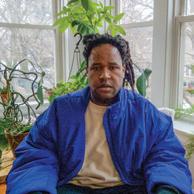
Ken Vandermark & Tim Daisy Duo, Sick Day, and Doss, plus reviews of releases by John Cale, Deathprod, Velvet Negroni, and more 52 Early Warnings New concerts and other updated listings 52 Gossip Wolf Chicago singer Christy Bennett with a tribute to Tin Pan Alley songwriter Irene Higginbotham; emerging local indie band Sweet Bike joins Totally Cashed and others for a birthday bash at Gman Tavern on Friday, January 13.
SAVAGE LOVE

Quickies Dan Savage offers a little advice on eating the peach.
CLASSIFIEDS

ON THE COVER: PHOTO BY ALEC OZAWA. FOR MORE OF OZAWA’S WORK, GO TO OZAWACREATIVECO.COM
TO CONTACT ANY READER EMPLOYEE, EMAIL: (FIRST INITIAL)(LAST NAME) @CHICAGOREADER.COM


PUBLISHER AND PRESIDENT TRACY BAIM EDITOR IN CHIEF ENRIQUE LIMÓN
MANAGING EDITOR SALEM COLLO-JULIN
PRODUCTION MANAGER KIRK WILLIAMSON
SENIOR GRAPHIC DESIGNER AMBER HUFF
STORY EDITOR SUJAY KUMAR
NEWS EDITOR JIM DALEY
THEATER AND DANCE EDITOR KERRY REID
MUSIC EDITOR PHILIP MONTORO
CULTURE EDITOR: FILM, MEDIA, FOOD & DRINK TARYN ALLEN
CULTURE EDITOR: ART, ARCHITECTURE, BOOKS, LITERARY ARTS KERRY CARDOZA
ASSOCIATE EDITOR AND BRANDED


CONTENT SPECIALIST JAMIE LUDWIG
SENIOR WRITERS LEOR GALIL, DEANNA ISAACS, BEN JORAVSKY, MIKE SULA STAFF WRITERS DEBBIE-MARIE BROWN, KELLY GARCIA, KATIE PROUT
LISTINGS COORDINATOR MICCO CAPORALE




VICE PRESIDENT OF OPERATIONS ANN SCHOLHAMER
DIRECTOR OF DIGITAL JOHN DUNLEVY
DIRECTOR OF MARKETING VIVIAN GONZALEZ MARKETING PROJECT STRATEGIST SHAWNEE DAY NEWSLETTER ASSOCIATE CHASITY COOPER SOCIAL MEDIA MARKETING ASSOCIATE NIESHA DAVIS
DIRECTOR OF CHICAGO INDEPENDENT MEDIA ALLIANCE (CIMA) SAVANNAH HUGUELEY
EXECUTIVE ASSISTANT SANDRA L. KLEIN
SENIOR VICE PRESIDENT OF GROWTH AND STRATEGY AMBER NETTLES VICE PRESIDENT OF SALES AMY MATHENY SALES TEAM VANESSA FLEMING, TIM OGDEN, TED PIEKARZ, WILL ROGERS DIGITAL SALES ASSOCIATE AYANA ROLLING MEDIA SALES ASSOCIATE JILLIAN MUELLER
READER (ISSN 1096-6919) IS PUBLISHED BIWEEKLY BY THE READER INSTITUTE FOR COMMUNITY JOURNALISM 2930 S. MICHIGAN, SUITE 102 CHICAGO, IL 60616 312-392-2934, CHICAGOREADER.COM COPYRIGHT © 2023 CHICAGO READER PERIODICAL POSTAGE PAID AT CHICAGO, IL
2 CHICAGO READER - JANUARY 12, 2023 ll
54
WEEK
53 Jobs 53 Community THIS
VOICE
JOE
DISTRIBUTION CONCERNS distributionissues@chicagoreader.com 312-392-2970
INSTITUTE FOR COMMUNITY JOURNALISM, INC.
RHODES TREASURER REESE MARCUSSON SECRETARY
HUNT
ADVERTISING 312-392-2970, ADS@CHICAGOREADER.COM CLASSIFIEDS: CLASSIFIED-ADS@CHICAGOREADER.COM NATIONAL ADVERTISING
MEDIA GROUP 1-888-278-9866 VMGADVERTISING.COM
LARKIN AND SUE BELAIR
READER
CHAIRPERSON EILEEN
KIM L.
DIRECTORS ALISON CUDDY, DANIEL DEVER, MATT DOUBLEDAY, VANESSA FERNANDEZ, TORRENCE GARDNER, ROBERT REITER, CHRISTINA CRAWFORD STEED
IN THIS ISSUE SOMETHING READER FOR EVERYONE! store.chicagoreader.com














JANUARY 12, 2023 - CHICAGO READER 3 MULTIPLIER IS BACK PLAY TODAY Game odds available at IllinoisLottery.com The trademark “10X” Reg. No. 3,350,533 is owned by and used with the permission of the Multi-State Lottery Association. PLAY TODAY OVER $250 MILLION IN TOTAL PRIZES
The champions of swagger
BY ISA GIALLORENZO
Glenn and Greg develop their work in their tidy and colorful Bronzeville studio, filled with thrifted and upcycled decor that displays their vibrant aesthetic. “We like bright colors. You stand out more where you go, and you feel a little bit of that sunshine. You brighten other people’s days as well,” said Greg, who was wearing a neon-yellow hoodie and matching sneakers when I visited the studio. Glenn had a similar outfit on, with a few di erences.
“It’s just chemistry. We come together as a collaborative force,” said Greg. According to Glenn, though he and his brother are mostly in sync, Glenn has a streetwear and retro vibe, while Greg is a bit more interested in luxe. They don’t have that introvert/extrovert dynamic common to twins. Their mom said that they “take turns being extra.”
Positivity, discipline, creativity, community, and entrepreneurship seem to be the name of the game for the Sims brothers. Those are some of the values they expect to impart with their Dope Soulz podcast, where they’ll interview guests such as the owner of a top-shelf whiskey brand and a sports agent who will talk about financial literacy. While they are still in the process of growing their business, Glenn and Greg double as instructors for the Chicago Park District.

“W
e got a lot of swagger. We don’t even have to open our mouths— they just see it,” said Greg Sims, 34. I met Greg and his twin brother Glenn when we attended “Champions of Success,” a panel discussion about the state of the fashion industry in Chicago that happened in November at the Kimpton Gray Hotel. The discussion was hosted by Michelle M. Collins, the president and founder of the consumer experience consultancy A Non-Agency. Guests at
the event were an eclectic mix of local fashion professionals from all kinds of backgrounds. Most attendees were dressed to impress, but the Sims brothers were at least twice as stylish as everyone else.
Long considered trendsetters by their crew, Glenn and Greg decided to capitalize on their remarkable sense of style in 2016. Together they created Dope Soulz, a lifestyle brand that encompasses fashion, art, and an upcoming podcast. Their clothing line includes custom-

ized T-shirts, hoodies, jackets, vests, bags, hats, socks, and other items. They mostly advertise their one-of-a-kind products via social media. Dope Soulz makes sales on Instagram and TikTok and also IRL at pop-up shops, group art shows such as the Pancakes & Booze series, or simply out of their vehicle’s trunk. The twins are adept at collaborating with other creatives and brands: the vests they were wearing at “Champions of Success” were part of a deal with Tote & Carry.
“ We’re always around the community. I work with six-year-old tots, teenagers . . . all the way up to a veteran that just turned 91 and was one of the first Black baseball players,” said Glenn. “I’m always getting inspiration from di erent kinds of style and culture and definitely getting that leadership role from the elders,” he added, as he and his twin carve out a path to become leaders themselves. v
@chicagolooks
4 CHICAGO READER - JANUARY 12, 2023 ll
CITY LIFE
DOPE SOULZ dopesoulzchicago on Instagram and TikTok
Glenn and Greg Sims photographed in Tote & Carry vests at the Kimpton Gray Hotel ISA GIALLORENZO
Street View
Dope Soulz thrives in Bronzeville thanks to twin brothers Greg and Glenn Sims.
















































































































































































































































































































































































































































































































































































































































































































































































JANUARY 12, 2023 - CHICAGO READER 5
Monday Night Foodball
Are
Monday Night Foodball, the Reader’s weekly chef pop-up, kicks off 2023 at Ludlow Liquors.
By MIKE SULA
Back in days of yore, when Ludlow Liquors first swung its doors open in Avondale, the work of its kitchen and first chef was described as a “permanent food installation.” In the years since, there’s been nothing permanent about it, as it has been home to an ever-shifting but always interesting cast of weird and wonderful kitchen warriors: Nick Jirasek and his Beefy Boys and crab “dragoon”; Mickey Neely and his Sicilian pies and Wee B’s-style burgers; “Asian stoner food” power couple SuperHai—and a whole rogues’ gallery of pop-up chefs.
This January 23 another concept settles in on the corner of California and Wellington when Monday Night Foodball launches a new 2023 season. Sure, I’m sad that the Reader’s weekly chef pop-up is leaving its ancestral home at the Kedzie Inn, but Ludlow already feels comfortable. And not much is changing except the coordinates: you can still read about each chef and their menus every week right here, and access the earliest menu drops by following each chef, @chicago_reader, and @mikesula on Instagram.
We’ve assembled a stellar lineup, if I may say so myself, with old and new faces alike, from separate but equally sorcerous Texas-style barbecue specialists like Mike Shaker
of Shaker Barbecue and Joe Yim of Knox Ave BBQ to Michelin-grade smokers Tom Rogers and Adam McFarland of Better Boy.
We have Jamaican food from Tameisha Brown of Be Irie Restaurant, fresh off her pop-up debut at Honey Butter Fried Chicken; crunchwrap king Khaled Simon of Taco Sublime; and a cheese party from Reader People issue star Alisha Norris Jones of Immortal Milk.
Palita Sriratana of Pink Salt is coming back hot from her recent Thailand travels; Jessica Walks First of Ketapanen Kitchen headlines with Native, Tribal, and foraged foods; MNF veterans Thattu preview their up-and-coming Keralan street food brick-and-mortar; and Foodball OGs Joey Pham ( a Flavor Supreme) and Mike “Ramen Lord” Satinover are joining forces with Cat Pham (aka @scratchsni purr) for a post-Super Bowl/pre-Valentine’s wonton soup and egg roll night.
But first it’s all kicking o with Marko and Nemanja Milunovic, whose marvelous Balkan eats and drinks launched the 2022 season. More on that in the next story.
That ain’t all. There are other big Foodball doings in store in 2023, so put your fat pants on and strap in. v
@MikeSula
Find more one-of-a-kind Chicago food and drink content at chicagoreader.com/food.
FOODBALL Nemanja and Marko Milunovic return to Monday Night Foodball
The brothers behind the late, great Kiosk Balkan Street food will take to the kitchen on January 23.
By MIKE SULA
Have you eaten at Aba in the last year?
If you’ve taken a table at Lettuce Entertain You’s Israeli-ish Fulton Market concept, there’s a good chance the production and plating of your house-made stracciatella with sherry vinaigrette, tru e-baked orzo, or black garlic shrimp scampi was supervised by Nemanja Milunovic, one of the restaurant chefs de cuisine.
I bet they were spot-on perfect.
How do I know this? Milunovic is a consummate professional, a true chignón, and, prior to his current corporate gig, the chef behind the short-lived but brilliant Kiosk Balkan Street Food ghost kitchen.
Kiosk closed abruptly due to the sudden passing of Milunovic’s mom—just as his particular star was rising. When he returned from an extended mourning period in Serbia (with a pit stop in Istanbul), he had to find a steady gig—and he found it in the warm, stable embrace of the Lettuce empire. He’s been there all year, making sure every plate is perfect.
You know what you can’t eat at Aba? Milunovic’s extraordinary somun, the pillowy, tortoise-shell-shaped bread that distin-
6 CHICAGO READER - JANUARY 12, 2023 ll FOOD & DRINK
ANNOUNCEMENT
you
Foodball?
ready for some
BENEFITS ARE WITHIN REACH! The Benefits Access Network helps connect neighbors to food and medical benefits like SNAP and Medicaid in Austin, Englewood and Lawndale. Assistance is free.
MORE AT: chicagosfoodbank.org/BAN Jan. 23: Balkan Promises with Nemanja and Marko Milunovic @nemanja_milunovic_ Jan. 30: Texas-style barbecue with Shaker Barbecue @shakerbarbeque Feb. 6: Keralan Foodball OGs Thattu @thattuchicago Feb. 13: Wonton soup and egg roll night with Joey Pham, Mike Satinover & Cat Pham @prettyhandsomeboyjoey @ramen_lord @scratchsniffpurr Feb. 20: Original cheese crust Taco Sublime @tacosublimechi Feb. 27: Jamaican defrost with Be Irie @beirierestaurantchi March 6: Indigenous foods initiative with Jessica Walks First of Ketapanen Kitchen @ketapanenkitchen Head to chicagoreader.com/food-drink/ for weekly menus and ordering info
LEARN
the Reader’s weekly chef pop-up series, now at Ludlow Liquors. Follow the chefs, @chicago_reader, and @mikesula on Instagram for weekly menu drops, ordering info, updates, and the stories behind Chicago’s most exciting foodlums.
guished each of Kiosk’s magnificent sandwiches, a kind of steroidal pita that formed the foundation of one of the undersung champions of the Great Chicken Sandwich Wars of 2021.





But you know where you can eat that crispy buttermilk-brined breast, topped with punchy cabbage salad, pickles, and the chili and goat cheese compound urnebes? At Ludlow Liquors in Avondale this January 23, when Milunovic takes over the kitchen for the 2023 season opener of Monday Night Foodball, the weekly chef pop-up.
It’s fitting Milunovic is inaugurating our new home. It’s been nearly a year to the day since he opened the 2022 season at the Kedzie Inn, a triumphant event that’s haunted everyone who tasted his pizza burek, one of the best things I’d eaten last year.




No burek this time, but he’s bringing back a couple other unforgettable items from that enchanted night, such as the all-beef grilled cevapi, swaddled in somun with red pepper ajvar, and creamy kajmak cheese spread. He’s also serving up the iconic karadjordjeva schnitzel, a rolled pork tenderloin piped with molten mozzarella and provolone, then breaded and deep fried to a phallic crisp. You’ll want to take these with a side of fries dusted with the Bosnian flavor enhancer vegeta, but you especially need his oyster-cremini, portobello-hon shimeji
NEMANJA&MARKOMILUNOVIC
mushroom goulash, a tribute to the version his grandmother made after summer family foraging trips in the Serbian Kopaonik mountains.
You can cut the richness of all this with roasted hot and sweet pepper moravska salad, but please don’t fail to tip the scales back with a slice of the classic Serbian chocolate walnut reform torta.
Once again Milunovic has teamed up with his barkeep brother Marko, now behind the stick at Lazy Bird. He’s come up with a couple of aged plum brandy-based cocktails, one a ri on the classic Lion’s Tail, with chamomile-infused slivovitz and allspice and peach liqueur, the latter a sweet reminder of the fruit kompot the brothers drank as kids. The other is an egg-free sour with prune puree and chocolate bitters, a nod to the chocolate-enrobed fruit endemic after the plum season.
Order those at the bar, but preorder your food right now, right here: forms.gle/Yf3XgEL1SJnxcHQJ8. There will only be limited walk-in availability. Milunovic’s old Kiosk regulars keep asking him when he’s going to cook Balkan food again. They’ll be there for sure, so look alive. It all starts at 5 PM at Ludlow Liquors, 2959 N. California in Avondale. Meanwhile, check out the full Monday Night Foodball schedule on page six. v

JANUARY 12, 2023 - CHICAGO READER 7
CHICAGOREADER MondayNightFoodball01.23.2023 DineIn/PickUpLocation LudlowLiquors 2959NCaliforniaAve,Chicago,IL60618
KARADJORDJEVA SCHNITZEL REFORMTORTA CEVAPI 5EACH FRIEDCHICKEN SANDWICH MUSHROOM GOULASH
MORAVSKA SALAD Contact nmmilunovic@gmail.com
RoastedSweetandHotPeppers, Tomatoes,RoastedGarlic,Scallions, BalkanDressing
SomunBread,Ajvar,Kajmak,Onions SomunBread,Urnebes,DillPickles, CabbageColeslaw
$12
SpiceLiqueur,PeachLiqueur,Ginger Syrup,LimeJuice,AngosturaBitters RAKIJASOUR AgedSljivovitz,Aperol,PrunePurée, LemonJuice,SimpleSyrup,Angostura andChocolateBitters ChocolateCream,Walnut Sponge,ChocolateGlaze FRIES VegetaSeasoning Mushrooms,Onions $12 $8 $12 $13 $15 $8 $5 $7 FOOD & DRINK
TartarSauce RAKIJATAIL
ChamomileInfusedAgedSljivovitz,All
@MikeSula
The menu for the next Monday Night Foodball NEMANJA MILUNOVIC
COMMENTARY
ON CULTURE
No walk in the park
What to do about a half-built intrusion on a landmark?
By DEANNA ISAACS
Juanita Irizarry delivered a gut punch of a speech at the December 14 meeting of the Chicago Park District Board of Commissioners. You could say she hit it out of the park.
That’s hard to pull o when you’ve only got three minutes to make your case.
But Irizarry, speaking as executive director of Friends of the Parks, also spoke from the heart. In the scant time allotted members of the public to comment, she took a clearly painful stand.
The subject was construction in Humboldt Park.
If you know Humboldt Park, you know that its 128-year-old Stables and Receptory Building on West Division Street is a pinch-me stunner. A sprawling, turreted, multi-gabled storybook retreat, it might have been lifted from the banks of the Rhine before it landed here—out of place and time—at the western end of the stretch of Division that is the Paseo Boricua, an area that was once home to German immigrants and is now the hub of Chicago’s Puerto Rican community.
Designed by the Chicago firm of Frommann & Jebsen (also responsible for Schubas Tavern), this Disneyesque architectural cream pu was built to shelter equipment as well as horses, and initially included the o ce of landscape architect Jens Jensen, then the Humboldt Park superintendent. An o cial Chicago landmark, it’s also on the National Register of

Historic Places. The National Museum of Puerto Rican Arts and Culture has occupied space there since 2002, and in 2014 it was granted a 99-year lease with an annual rent of one dollar for the entire building. Standing alone against a backdrop of parkland lawns and paths, it’s been a commanding presence.
But last summer, neighbors and preservationists say they noticed something surprising: some kind of construction was underway next to the stables. What was going on? A long trail of FOIA requests later, here’s what they found: in 2020 the museum had been approved for a $750,000 grant from the state to make repairs and to construct a modest, low-slung, 1,500-square-foot archives building nearby.
This was mystifying, because the building that was taking shape last summer was much larger. The people who researched it say drawings submitted after construction started show a two-story structure, measuring as much as 6,800 square feet, that would stand nearly 40 feet tall. By early fall, partially completed, it was already blocking views of the museum’s landmark home and marring the pastoral setting. No city building permits had been issued, and, in spite of the fact that work was taking place on public land with impact on a publicly owned landmark property, there had been no public notice, hearings, or chance for community input. In September, after a 311 complaint, the city building department issued a stop-work order. In November, Hum-
boldt Park residents Kurt Gippert and Maria Paula Cabrera (who had both unsuccessfully opposed state designation of this area as a Special District to be known as “Puerto Rico Town”) posted a protest petition at Change. org that gathered nearly 1,400 signatures. Gippert presented the petition to the Park District at the December 14 meeting and asked that the partially completed building be demolished. He was one of a half dozen protesting speakers, including Mary Lu Seidel, Preservation Chicago’s director of community engagement, who summed the situation up as “a gross abuse of their lease” on the part of the museum. “They applied for a state grant without CPD’s permission, dramatically changed the scope of that grant, did not amend the grant with the state, and started construction without permits, without approval from CPD, and without input from the public,” Seidel said.
So, how did this happen? Simple mismanagement? An ignorant but innocent screwup? That seemed to be what museum president Billy Ocasio was saying when he told Block Club Chicago in October that “some honest mistakes were made.”
But Ocasio, a onetime senior advisor to former Governor Pat Quinn, is a 16-year veteran of the City Council (where, to his credit, he voted against the infamous parking meter deal). The protestors say there’s no way he was ignorant of city and state permits and other requirements.
Here’s what Irizarry told the board: “The idea that they can start building illegally in a park is a dare to all of us to make them take it down.”
“Museum director Billy Ocasio and his team are not people who don’t know that they need a permit,” Irizarry said.
“I know these things as a lifelong Humboldt Parker who lives in the 26th Ward where Alderman Billy Ocasio was alderman for decades,” she continued. “I worked and volunteered with a number of nonprofits and committees that aligned with his policies. . . . I cochaired the committee that developed what became his a ordable housing set-aside policy and participated on his affordable housing committee. . . . I tell this story as a donor to the National Museum of Puerto Rican Arts and Culture and as one to whom Billy Ocasio has been very important personally, politically, and professionally.
“I want to make an important point knowing that oftentimes conflicts like these get reframed in all kinds of ways to distract from the
actual issue at hand. You can be Puerto Rican, love the National Museum of Puerto Rican Arts and Culture, be deeply engaged in organizing activism to keep our community in that space, and not believe this is an appropriate action. We urge you to respond accordingly.”
When Friends of the Parks noted in a December newsletter that they’re considering legal action in this matter, I called Irizarry to ask about it. She said it would be a last resort, but her board has authorized it if necessary. She added that FOTP thinks demolition is in order. To let the building go on to completion “would represent terrible precedent,” she said.
Gentrification is a divisive issue in Humboldt Park, and it’s one of the ways that things can get reframed, but not the only one, Irizarry told me. “The other thing that is real is that a lot of the politics within the Humboldt Park Puerto Rican community break down in relation to people’s politics about the status of Puerto Rico. If you believe in statehood for Puerto Rico versus independence for Puerto Rico, and you live in Humboldt Park, you end up on di erent sides of local political battles, based on those alignments.”
“This is my community,” she said. “I’m just trying to do this in ways that are least damaging. We need to pull together Puerto Ricans who are on the statehood side, Puerto Ricans who are on the independence side, Puerto Ricans who are happy to just stay a commonwealth. I’ve heard from a lot of independence movement folks who think that this is wrong. I’m trying to pull together folks across that spectrum to say, ‘How do we lead through this with integrity and common care for our community and our culture?’”
The museum did not respond to requests for interview or comment, but on their website, they say this: “The park district approved a cutting-edge 5,000 square foot archives and collections facility that will mimic the architectural beauty of the Museum’s building with the addition of a tranquil sculpture garden which will open in the Summer of 2023.”
Alderperson Roberto Maldonado, who’s represented the 26th Ward since he was appointed to replace Ocasio in 2009, also failed to respond to a request for comment; last Friday he withdrew his candidacy for reelection. The Park District says it is “currently evaluating the proper next steps and will continue to work with all relevant agencies to determine the future of the project.” v
8 CHICAGO READER - JANUARY 12, 2023
@DeannaIsaacs
Humboldt Park’s landmark stables building and new construction
DEANNA ISAACS
What If
By Jordan Stewart-Curet
What if we can cozy the dream. To curiously pick through the unknown. To feel the unspoken and lose the line of the impossible.
What if we can taste the salt. Be shocked by its grit. Welcome it’s sting. Be cut by its bitter and still say mmmm.
What if we can shift the shapes. To reach out and deepen in love. Embrace the sensuality
oftouch oftalk ofcommunity.
What if we choose our paths. Remember with our gut. Move with the fabrics of those before us and stitch it so tightly tighttighttight that a quilt covers our future
Jordan Elise Stewart-Curet(She/They) is an Afro-Caribbean, intuitive artist working out of Chicago, Illinois. From a young age, Jordan was deeply impacted by the Black-Indigenous spirituality and the mysticism of nature.
Their work grabs from these themes to elicit conversation around the healing of our true selves through the play-like structure and connecting to worlds unseen.
Poem curated by Justus Pugh. Justus is a poet, writer, and technologist born and raised on the South side of Chicago. As an artist, his work is guided by the idea that our imagination is our ancestor’s wildest dreams, inherited. And this imagination comes through writing his “Afrotranscendental” poetry, writing culinary fiction with Village X Magazine, and, now and today, storytelling.
A biweekly series curated by the Chicago Reader and sponsored by the Poetry Foundation.






Free Programming from


Hours Wednesday, Friday, and Saturday: 11:00 AM–4:00 PM Thursday: 11:00 AM–8:00 PM

Diana Solís: Encuentros
Photographs of Chicago Poetry Communities, 1978–1994
An exhibition of photographs and ephemera exploring this unique moment in Chicago’s literary history.
Open until January 14, 2023

Latinx Poetics Anthology Launch Celebration
Join us in person or online for a celebration of the landmark anthology Latinx Poetics: Essays on the Art of Poetry, featuring editor Ruben Quesada and poetry readings from contributors.
Thursday, February 2, 2023, 7:00 PM

JANUARY 12, 2023 - CHICAGO READER 9
heavy and sure. the
Poetry Foundation!
Learn more at PoetryFoundation.org
ni sc crime vic ms a p h c iz ship
By CARLOS BALLESTEROS, INJUSTICE WATCH
This story was originally published by Injustice Watch, a nonprofit newsroom focused on issues of equity and justice in the courts.
After his brakes started acting up on I-94 one night in November 2021, tractor-trailer driver Nodirjon Zakirjonov decided to pull over to the side of the road in the Pullman neighborhood to fix the problem. But in the middle of his repairs, the 30-year-old was suddenly struck on the head and knocked unconscious. When he came to, he felt his abdomen “burning.” He’d been stabbed and robbed.
The assault left the immigrant from Uzbekistan with a ten-inch scar across his torso and deeper trauma. For months, he struggled to drive long distances, and any slight mishap on the road triggered a panic attack.
“I was living in a horror fi lm,” he said in a recent interview.
Zakirjonov found it hard to talk about the assault, but eventually he confided in his friends, and one of them suggested that he apply for a U visa.
A U visa offers temporary legal status and a path to citizenship for undocumented immigrants who were victims of certain crimes and who are considered to be helpful or “likely to be helpful” to law enforcement. Congress created the visa program in 2000 to encourage undocumented immigrants to report crimes and help law enforcement better serve immigrant communities.

Zakirjonov immigrated to Chicago on a student visa but lost his legal status after graduating from Concordia University Chicago with a master’s degree in 2020. A few months after the assault, Zakirjonov contacted an immigration attorney to apply for a U visa. But before he could submit his application, he needed the Chicago Police Department to certify that he was indeed a qualified crime victim who had cooperated in their investigation. His lawyer, Julia Sverdlo , mailed his certification request to CPD in April. She was confident he’d get certified. But what should have been a straightforward process turned into a monthslong nightmare.
First, police officials said he needed to prove his identity. Then they told him that a detective had tried to reach him to no avail.
After Zakirjonov sent a sworn a davit promising to help investigators, CPD denied him a third time, telling him that he needed to call detectives and ask them to reopen his case. An open investigation isn’t a requirement for
10 CHICAGO READER - JANUARY 12, 2023 ll
NEWS & POLITICS
POLICE
Immigrants seeking U visas are being blocked by two sergeants who were previously involved in controversial shootings and on the verge of being fired.
VERÓNICA MARTINEZ FOR INJUSTICE WATCH
CPD
police to sign a U visa certification, but Zakirjonov did as he was told. He met with detectives in August, and they reopened his case. But CPD denied him again the next month, saying he didn’t have “credible and reliable information” about the crime.
“When I was informed in a straightforward way that CPD is not believing me, I said, ‘That’s all.’ That was the last shot,” he said.
An Injustice Watch investigation found that the department has denied hundreds of U visa certification requests from undocumented crime victims this year, many of them at odds with federal certification standards and some that appeared to violate state law.
Two Chicago police sergeants, Brandon Ternand and John Poulos, issued most of the denials reviewed by Injustice Watch. Both sergeants have fatally shot civilians and had serious questions raised by investigators about their credibility. Both also faced termination, but in 2018 the Chicago Police Board allowed them to keep their jobs. The city has paid out more than $3 million in settlements and judgments relating to the two sergeants.
Police watchdogs said the decision to designate Ternand and Poulos as U visa certifiers raises questions about CPD’s selection process for the job.
“To the extent that the Police Department has any interest in building its legitimacy or establishing public trust, you don’t put people who violated the most fundamental tenets of public trust and CPD rules . . . in positions in which their credibility [and] integrity matters,” said Craig Futterman, director of the Civil Rights and Police Accountability Project at the University of Chicago. “I can’t imagine anything more basic than that.”
Attorneys and legal advocates who regularly work on U visa applications called the number of denials by CPD in the last year “unprecedented” and said they worried it will discourage Chicago’s undocumented immigrants from reporting crimes.
“All it takes is one person that you know who had a negative encounter with law enforcement to a ect your willingness to come forward in assisting in an investigation or prosecution of a crime,” said Trisha Teofi lo Olave, a legal project manager at the Chicago-based National Immigrant Justice Center, who represents dozens of U visa applicants.
After Injustice Watch started reporting this story and following weeks of complaints from immigration attorneys to officials in Mayor Lori Lightfoot’s o ce, sources said in
November that CPD pledged to revise its policies on U visa certifications. The most significant change will require the department’s O ce of Legal A airs to review all denials as well as handle appeals of previously denied requests.
CPD did not answer any questions raised by Injustice Watch and did not respond to interview requests for Ternand and Poulos. Instead, the department issued a brief written statement in which it vowed to “continue working to ensure the U visa certification process is in accordance with the federal guidelines.”
At a City Council meeting in December, after Injustice Watch and the Reader published this story online, a majority of alderpersons signed on to two measures calling for hearings on CPD’s handling of U visa certifications and for the department to collect better data and make its U visa certification process more transparent. The measures were referred to the council’s public safety and immigrant rights committees, which could take them up later this month.
Certifying offi cers “don’t understand the law”
Unlike many other law enforcement agencies, CPD said it doesn’t keep data on the number of U visa certification requests it receives or how many it denies. But in response to a public records request, department officials told Injustice Watch in October that CPD has denied “at least 800” U visa certifications in the last two years alone.
By comparison, in 2021, police in Los Angeles denied fewer than 350 certification requests and police in New York denied about 150 requests, according to data from those departments. Each of those two cities is home to at least 150,000 more undocumented immigrants than Chicago, recent estimates from each city show.
At Injustice Watch’s request, Chicago police reviewed a batch of recently closed certification cases—110 in all—and determined that 57 of those requests had been denied, a denial rate of nearly 52 percent. That would put Chicago well above other major cities— including New York, Los Angeles, Houston, Minneapolis, and San Francisco—in the percentage of requests denied, according to 2021 data from those departments.
The U visa program was created as part of larger legislation aimed at curbing human tra cking and violence against women. But
many of the certifications denied by CPD have been for victims of the very crimes that qualify under the law—including domestic violence and sexual assault.
Leslye Orlo , an expert in U visas and director of the National Immigrant Women’s Advocacy Project at American University, reviewed the denials for Injustice Watch and found that many of those decisions ran contrary to federal certification guidelines.
Poulos and Ternand collectively signed more than three-quarters of the denial letters that CPD provided to Injustice Watch.
Orlo , who helped write the law that created the U visa and trains police departments nationwide on its implementation, concluded that the sergeants “don’t understand the law”—and called into question CPD’s monitoring of their work. “The fact that [the denials] are going out the door means that their supervising structure isn’t checking to see if they’re getting it right,” she said.
Despite the complaints from immigration attorneys, Ternand and Poulos remained U visa certifying o cers as of late October, CPD records show.
Before certifying U visas, Poulos and Ternand faced termination
The Chicago Police Department did not respond to questions about why Poulos and Ternand were assigned to Unit 163, the Records Inquiry Section that reviews U visa certification requests, following failed attempts to fire them.
Poulos, who is white, shot and killed two Black men in separate incidents in just over three years. In an o -duty incident in August 2013, Poulos said Rickey Rozelle, 28, threatened to kill him before Poulos shot him. Records show that investigators didn’t recover a weapon. The city later settled with Rozelle’s family for $950,000. While on duty in November 2016, authorities said Poulos fatally shot 19-year-old Kajuan Raye in the back during a foot chase. Oversight agencies cleared Poulos of wrongdoing in both shootings, but a jury awarded Raye’s family $1 million in a civil suit. Poulos claimed Raye pointed a gun at him, but forensics experts hired by both sides said in court fi lings that a gun in Raye’s possession was tucked away in his jacket pocket when Poulos shot him.
After Raye’s death, then-police superintendent Eddie Johnson fi led charges to fi re Poulos. But the charges had nothing to do with the shootings. Instead, they stemmed from
two internal investigations from years earlier that found Poulos had concealed a past arrest when he applied to be an officer and had an ownership stake in his family’s sports bar once he got the job, a violation of CPD policy. Internal A airs had recommended that Poulos be fi red for those infractions in 2007, but police brass never followed through. By the time Johnson filed charges with the police board in 2017, Poulos had received a “merit promotion” to sergeant, according to the Tribune
In its 2017 report on CPD’s systemic failures in the wake of Laquan McDonald’s fatal shooting, the Justice Department singled out Poulos’s case for comment, saying CPD could have stopped his promotion—and potentially stopped him from killing Raye—if the department had a “functioning early intervention” system to alert o cials of problem o cers.
But in February 2018, the police board— then chaired by Lightfoot—unanimously ruled against firing Poulos, concluding that CPD took too long to bring the charges against him. Records show that Johnson designated Poulos as a U visa certifying o cer in September 2018.
A few weeks later, the police board cleared Ternand of any wrongdoing in his fatal shooting of high school freshman Dakota Bright. During a foot chase in November 2012, Ternand, who is white, fired a single shot, hitting Bright in the back of the head. The o cer said he saw the Black 15-year-old reach for a gun. But Bright was unarmed when Ternand shot him; police later recovered a gun 200 feet away from Bright’s body, WBEZ reported. The city’s police oversight agency ruled the shooting unjustified in 2017 after fi nding many “inconsistencies” in Ternand’s account.
However, in a five-three ruling that kept Ternand on the force, the police board said that his testimony was “credible and persuasive” and praised Ternand as a “highly decorated” o cer who had a “reputation for honesty.”
That was despite the more than two dozen misconduct complaints Ternand had racked up in the years before and after killing Bright, including allegations that Ternand had lied in police reports about using excessive force. In one case, Cook County prosecutors declined to bring charges against a man whom Ternand said hit him after a CPD detective found bystander footage of the incident that contradicted Ternand’s police report, according to a civil lawsuit the man later fi led.
JANUARY 12, 2023 - CHICAGO READER 11
NEWS & POLITICS
NEWS & POLITICS
Like most misconduct complaints against Chicago police officers, none of those complaints against Ternand were sustained. In all, Ternand was named in five lawsuits that cost Chicago taxpayers more than $1 million in settlements between 2011 and 2016, according to records collected by the Chicago Reporter
After the police board saved his job, Ternand was transferred to the 11th District on the west side. Ternand was assigned to Unit 163 in January, and Superintendent David Brown designated him as a U visa certifying o cer a month later.
Poulos and Ternand did not respond to a request for comment.
Former Chicago inspector general Joe Ferguson, who oversaw investigations of police policies and practices, told Injustice Watch that if CPD is going to keep Ternand and Poulos on the force, “they certainly should not be put into a position that involves their certification of o cial matters, for which their veracity and their credibility is critical.”
‘Looking for excuses to deny’
Not long after Ternand joined the U visa unit, some attorneys started noticing an uptick in denials of certification requests.
“Starting in April, we started noticing this trend where they were getting denied for no reason,” Shelby Vcelka, an immigration attorney with Victory Law O ce in Berwyn, told Injustice Watch.
One of those denials was for Reyna Mariano, a 40-year-old, undocumented mother from Mexico whose teenage son was shot and killed in 2017. Under federal law, parents and other immediate family members of deceased minor victims of qualifying crimes can apply for a U visa as an “indirect victim.”
Mariano told Injustice Watch that at fi rst she didn’t want to apply for a U visa because she felt guilty about “getting something out of” her son’s death. She decided to apply for the visa last year because she believed obtaining legal status and a work permit would help her provide for her four-year-old daughter.
But Ternand denied her U visa certification request, saying without explanation that she didn’t qualify as an indirect victim. Vcelka appealed the denial, but Poulos denied her request again on the same grounds. Mariano was later granted certification from the Cook
County State’s Attorney’s O ce, which prosecuted her son’s killing.
CPD also denied at least a dozen requests from domestic violence survivors last year, the Injustice Watch investigation found.
In one of those cases, a 43-year-old woman on the south side, who had obtained an order of protection against her former partner, called police after he threw her “onto the ground multiple times” according to a police report. Ternand denied her certification, saying she hadn’t su ered “substantial physical harm.” In another example, Ternand denied a request from a 23-year-old woman who told police she locked herself in her room as her knife-wielding father tried to open the door while shouting threats to kill her. Again, Ternand said the woman hadn’t su ered substantial harm.
But federal certification guidelines issued by the Department of Homeland Security say that it’s up to immigration o cials—not local law enforcement—to determine if U visa applicants have su ered enough harm to qualify for the visa.
“The fact that they’re denying based on
substantial harm is totally wrong,” Orloff said. “Denying based on substantial harm, to me, says that they’re looking for excuses to deny that the law doesn’t require.”
Poulos also denied at least six certification requests because, he said, the crimes listed on the police report—“simple assault-domestic” and “simple battery-domestic”—weren’t qualifying crimes.
“That’s wrong—‘Simple assault–domestic related’ is domestic violence,” Orloff said. “Each of these o cers are doing things that are dead wrong on the law.”
Immigration attorneys said it makes sense for CPD to deny some of the hundreds of U visa certification requests it receives every year.
“It shouldn’t be a rubber stamp. Not everyone should get a certification,” said attorney Carlos Becerra. “But I think the other extreme is denying certifications and having either a very fl imsy basis for doing it or having no basis.”
Becerra sued CPD in November after Ternand denied a U visa certification for one of his clients, a rideshare driver who was
attacked by a passenger, leaving him with a broken nose, according to the lawsuit.
Ternand denied the man twice for allegedly failing to cooperate in the investigation, even though he “provided evidence that the case had [been] reopened,” the lawsuit says.
In 2017, a report by the Illinois Coalition for Immigrant and Refugee Rights found that law enforcement agencies across the state had inconsistent policies on U visa certification that often conflicted with federal guidelines.

The following year, the Illinois General Assembly passed the VOICES Act, which set statewide guidelines on U visa certifications. The law requires law enforcement agencies to recertify U visa applicants whose initial certification had expired. Under federal law, the certifications expire after six months, but immigrants and their lawyers often need more time than that to fi le their U visa applications.
CPD, however, denied several recertification requests last year, including one for a woman who was sexually assaulted as a minor, according to attorneys and records
12 CHICAGO READER - JANUARY 12, 2023 ll
continued from p. 11


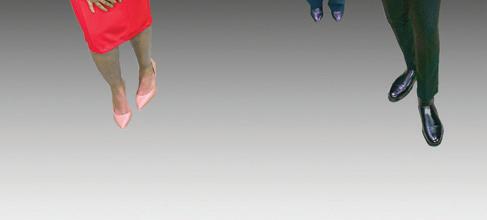













JANUARY 12, 2023 - CHICAGO READER 13 Weeknights at 7pm on CAN TV19 Streaming live and on-demand on cantv.org and can tv+ With Sylvia Snowden Download the can tv+ app on Flexible courses to fit your schedule. Childcare & tuition assistance available. ccc.edu/DaleyCTE From the classroom to your new career. Daley College’s Career and Technical Education program gets you to work fast. Find your future in one of our six CTE program offerings: •Child Development •Criminal Justice •Manufacturing
NEWS & POLITICS
reviewed by Injustice Watch.
In 2021, Governor. J.B. Pritzker signed additional legislation requiring law enforcement agencies statewide to report the number of U visa certification requests they’ve received and approved or denied each year. The first of those reports is due in March. The Justice Department’s O ce of Violence Against Women awarded a nearly $1 million grant to CPD in October 2020 in part to fund a U visa data dashboard. In an email, a CPD spokesperson said the dashboard “has not yet been created.” The department declined to say whether it would be able to meet the new reporting requirements.
Attorneys ask the mayor’s office for help
In late August 2022, Olave, the legal project manager at the National Immigrant Justice Center, led a training session for Ternand, Poulos, and other CPD U visa certifying officers. Attorneys hoped that the training would stem the flow of flawed denials, according to emails obtained through a public records request. They were wrong.

“A lot of practitioners were waiting until the certifier training on August 25 in the hopes that things would get better,” Olave wrote in an email to Darci Flynn, Lightfoot’s director of gender-based violence strategy and policy, on September 13. “Unfortunately, it seems they have only gotten worse.”
Flynn forwarded the email to Elena Gottreich, Lightfoot’s deputy mayor of public safety, who sent it to CPD chief of sta Leslie Silletti and Tina Skahill, the department’s executive director of constitutional policing and reform. “This has been an issue for years, we need to address asap,” Gottreich wrote.
But the denials kept coming, the emails show. Attorneys began “advising clients to not apply for immigration relief based on a belief of an eventual denial from CPD,” according to an October 4 email to top CPD officials from Nubia Willman, the mayor’s chief community engagement o cer and an immigration attorney with years of experience working on U visa applications.
The next day, Willman and other senior members of the administration met with CPD o cials, including Skahill and general counsel Dana O’Malley, the emails show. Neither the mayor’s o ce nor CPD answered Injustice Watch’s questions about what happened at
the meeting.
But in a follow-up email to the meeting participants, Willman wrote, “For years, CPD has set best practices throughout the state for being responsive and trauma-informed towards survivors of crimes. I’m hopeful that this check-in will allow us to return to those processes.”
Still, the questionable denials kept coming, attorneys said. In an email sent to Willman on October 19, an immigration attorney wrote, “We received a second denial after I appealed the U cert[ification] denial to CPD—it’s very generic and does not even indicate that CPD reviewed my arguments.”
“Disheartening to see,” Willman wrote back. “We’re following up on these so feel free to send my way as we meet with CPD to discuss further. Hopefully we’ll have an update soon.”
By mid-November, sources told Injustice Watch, CPD started requiring that all denials would now go through its legal department before being fi nalized. The legal department also will review all appeals for denials already issued.
But Olave worries that some immigrants who were improperly denied a U visa certification request may not know that they can appeal the decision.
“There are defi nitely people out there who have gotten a denial over the past year who may just give up,” she said.
CPD did not respond to Injustice Watch’s questions about the policy changes.
The mayor’s office declined a request for an interview with Willman and Flynn. In a statement, a spokesperson for the mayor’s o ce said that when “concerns were raised to her o ce about U visa certification denials, the mayor ordered a review of the application process. The city will continue to work with advocates and the Chicago Police Department to provide any necessary adjustments to the policy or training to ensure appropriate access to this legal remedy and to ensure that we are living our values as a welcoming city in all ways.”
The long line ahead
After receiving four denial letters, Zakirjonov, the truck driver who was stabbed in November 2021, didn’t think he’d ever get a U visa certification from CPD.
Then, three weeks after Injustice Watch asked CPD about his case this past November, his lawyer received an unexpected letter
from CPD. A year after being stabbed and robbed, Zakirjonov finally was certified for a U visa by CPD—even though he never appealed the fourth denial letter he received in September.
Zakirjonov had already given up hope that CPD would do right by him, he said, and had turned his attention to taking care of his pregnant wife and their two kids, ages seven and four. “To be honest, 99 percent of my focus and thinking was just to feed my family and live my life,” he said.
While he can fi nally apply for a U visa with U.S. Citizenship and Immigration Services, CPD’s six-month delay puts him farther back in a line that is getting longer by the day.
By law, federal immigration officials can only give out 10,000 U visas to crime victims each year. USCIS said it has more than 180,000 pending cases, double the number in 2016. Between October 2021 and June 2022, the number of pending cases grew by more than 9,000, or about 34 a day.
“So an extra six months waiting to get your certification signed means potentially
an extra few years waiting to get your case adjudicated,” Olave said.
The U visa grants legal status and a work permit for up to four years. To stay in the country for longer, immigrants must seek a green card. Three years after obtaining a U visa, recipients can apply for a green card, which currently takes another year or two to process.
One of Olave’s clients obtained her U visa last month after submitting her application more than six years ago. “We’re looking at her applying for a green card in November 2025,” Olave said. “Hopefully processing times don’t get longer, but it could be 2027 by the time she finally gets her green card. That’s over ten years since she applied for the U visa.”
Zakirjonov doesn’t know if he can wait that long, but he knows that’s all he can do at this point. “It’s draining, thinking about it every time,” he said. “So I’m just gonna let it go, and at some point, it’s gonna be yes or no.” v
14 CHICAGO READER - JANUARY 12, 2023 ll
@ballesteros_312 continued from p. 12
VERÓNICA MARTINEZ FOR INJUSTICE WATCH














JANUARY 12, 2023 - CHICAGO READER 15
Fifty years of struggle
By JIM DALEY
Frank Chapman, 82, has been a revolutionary organizer since the 1960s. He is currently the educational director and field secretary at the Chicago Alliance Against Racist and Political Repression (CAARPR) and a leader in the campaign for an elected Civilian Police Accountability Council (CPAC). CPAC and the Grassroots Alliance for Police Accountability (GAPA) were instrumental in the fight to establish democratically elected civilian oversight of the police, which was passed in a 2021 ordinance.
In the late 1960s, the Black Panther Party sparked the first citywide attempt to establish community control of the Chicago police. It culminated in a 1973 conference that included speakers such as Dick Gregory, Fannie Lou Hamer, Renault Robinson, Bobby Seale, and Bobby Rush, as well as a ballot-measure effort to get elected, citizen-led police boards in every district. That effort was ultimately defeated by then-mayor Richard J. Daley’s Democratic machine.
In recent years, killings by Chicago police and the widespread protests and rebellions that took place in the wake of the murder of George Floyd by Minneapolis police reinvigorated the local movement for community control of the police. The latest chapter in organizers’ efforts will come to fruition on February 28, when, for the first time ever, three people will be elected to serve on police district councils in each of the city’s 22 police districts.
In 1961, Chapman was wrongfully convicted of murder and armed robbery and sentenced to 50 years in the Missouri State Penitentiary. While incarcerated, he began studying the law, reading revolutionary literature, and following the advances of the civil rights movement by reading Ebony and Jet . Chapman helped start a movement to desegregate the prison, where Black prisoners were subjected to “horrid and ridiculous” conditions. He reached out to politicians and activists and ultimately got in touch with Angela Davis, a key organizer in the Black Power movement and communist
professor at the University of California, Berkeley. In 1976, Chapman was paroled and has been part of the struggle for liberation ever since. “I’ve stayed committed to this movement,” he says, “and I will continue to stay committed to it until I die.”
The Reader recently spoke with Chapman about the movement to establish community control of the Chicago police. What follows are his words, which have been edited for clarity and length.
Chapman: The struggle for community control of the police, or CCOP as it became known, started in Berkeley, California, around 1968, led by the Black Panther Party, some of the members of Students for a Democratic Society, and other progressive people in the community in the Bay Area. By the time it got to Chicago, Fred Hampton [the deputy chairman of the Illinois Chapter of the Black Panther Party] was in the struggle and very, very conscious of what he was doing. He built the first Rainbow Coalition in this city by
fighting around this issue of community control of the police.
It became a real serious campaign shortly after Chairman Fred was murdered by the police in December 1969. The campaign was really formed from a broad base. It was a multiracial coalition consisting of the Black Panther Party, the Alliance to End Repression, the NAACP, the League of Black Women, the Chicago Peace Council, the Midwest Latino Conference, and the American Indian Movement.
The goal of the CCOP was to build a people’s political machine of Black, Latino, Native American, and white working-class people to take control not just of the police but of their respective communities. The campaign united and cooperated, pooling resources to attack the local power structure at all its vulnerable points, and they considered police violence and terror to be one of the most vulnerable.
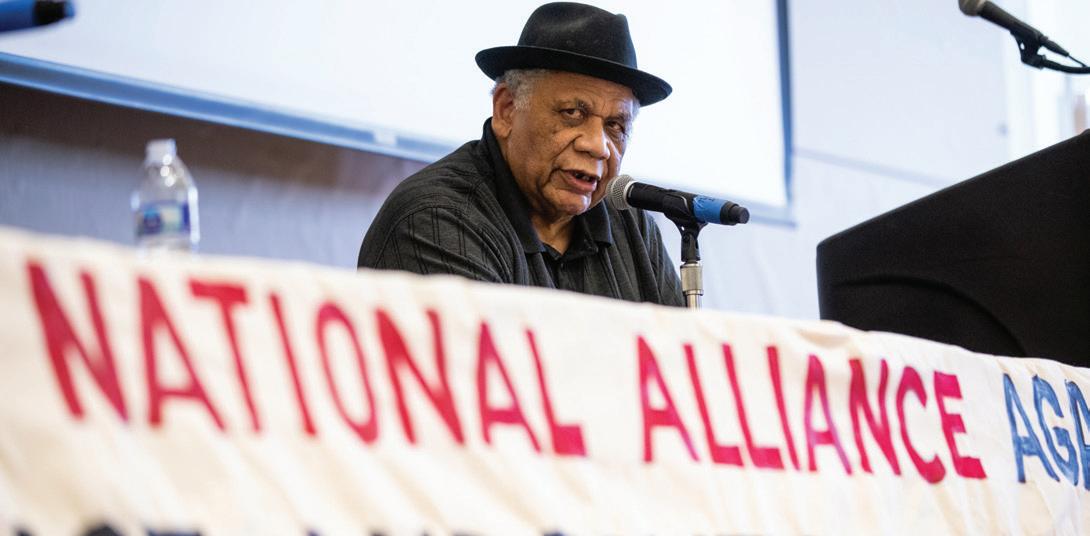
They organized a voter registration drive precinct-by-precinct to get CCOP on the ballot. And we learned a number of things from that campaign, specifically that beating a powerful machine requires a tremendous amount of energy and resources and dedicated grassroots organizers. And while that [CCOP] movement had some of that, it did not have enough. In the wake of that defeat, CCOP shifted its tactics to trying to get progressive activists elected, such as Cha Cha Jiménez from the Puerto Rican Young Lords [who ran for 46th Ward alderman], or Black Panther leader Bobby Rush [who served in Congress until his retirement this month]. These candidates campaigned on a platform of greater community control by calling for such things as a community zoning board to combat gentrification, community escrow programs to combat slumlords, and other community service programs. They weren’t just talking about community control of the police. By and by, these movements were diluted in terms of their demands and so on, and over a 40-year period, they were all but forgotten about.
[Winning] requires more than just having a broad concept about community control in general, and of all the di erent things CCOP fought for. It requires building a real, serious grassroots movement that’s rooted in the neighborhoods and communities, where you have tens of thousands or hundreds of
16 CHICAGO READER - JANUARY 12, 2023 ll
&
NEWS
POLITICS
Frank Chapman has been a revolutionary organizer since the 1960s. COURTESY OF THE EMPOWERING COMMUNITIES FOR PUBLIC SAFETY COALITION
COMMUNITY ORGANIZING
Frank Chapman discusses the history of the movement for community control of the Chicago police.
thousands of people believing in bringing this change about and willing to fight for it. That’s what our movement [Empowering Communities for Public Safety] accomplished. And we would not have accomplished this had the way not been paved for us by Fred Hampton and others.
In March of 2021 Rekia Boyd, a 21-year-old Black woman, was murdered [by Dante Servin, an off-duty CPD detective]. The community was outraged about this. It happened right around the same time that Trayvon Martin was murdered [by George Zimmerman in Florida]. So there was anger in the air already. The Chicago Alliance Against Racist and Political Repression and other organizers held a meeting, and we decided to launch a movement calling for an all-elected civilian police accountability council. When we started out with our first public meeting, we had about 150 people. We decided that there was a good indicator of what the people in the community want, because all those 150 people were, in fact, victims of some police crime or another. We began to go into the communities on the south side and on the west side. For seven years, we collected signatures from people, demanding community control of the police, demanding an all-elected Civilian Police Accountability Council, known as CPAC. And in those seven years, we did not just have folks sign; we talked to people.
By the time the George Floyd rebellion broke out, we had already collected about 60,000 signatures here in the city of Chicago. We had some signatures in every ward, and we had over 1,000 signatures in 38 wards. So we were a mass movement when the George Floyd rebellion broke out. The first demonstration that we had in the wake of the George Floyd rebellion, we had over 4,000 cars in caravans and damn near 30,000 people on the ground. So that was a very massive movement that made the powers that be in the city say, “OK, we will talk to you, we will negotiate with you about doing something about this problem.”
When she was running for the o ce, Mayor Lightfoot said that she was going to do something about this within 90 days after she was elected, and a year later still nothing was done. A year later. So, we formed a united front with the Grassroots Alliance for Police Accountability, and Empowering Communities for Public Safety is what we called ourselves. That also became the name of the ordinance that we got passed: Empowering Communities for Public Safety.
That was a historic advance for our people,
and it took us overcoming a lot of di erences within our movement about what police accountability should look like. And so in the ECPS ordinance are some basic agreements that we had to have in order to go forward: we had to have a well-defined voice in saying who polices our communities, and that voice had to be democratically elected by the people.
The first phase of that struggle, which we’re now in, is getting ECPS implemented. And that means getting not just movement people but getting the people in the communities that are most devastated and impacted by police tyranny, getting those people involved in this fight and getting them to run for these positions of councilors in the police district councils.
Nothing in the history of our country has been done like this before. This is the result of us actually creating a law that empowers our people in the communities to have a decisive voice in saying who polices our communities and how our communities are policed, and this will be done through a democratic election.
In 1973, the fi rst Chicago conference on community control of police drew organizers from around the country.
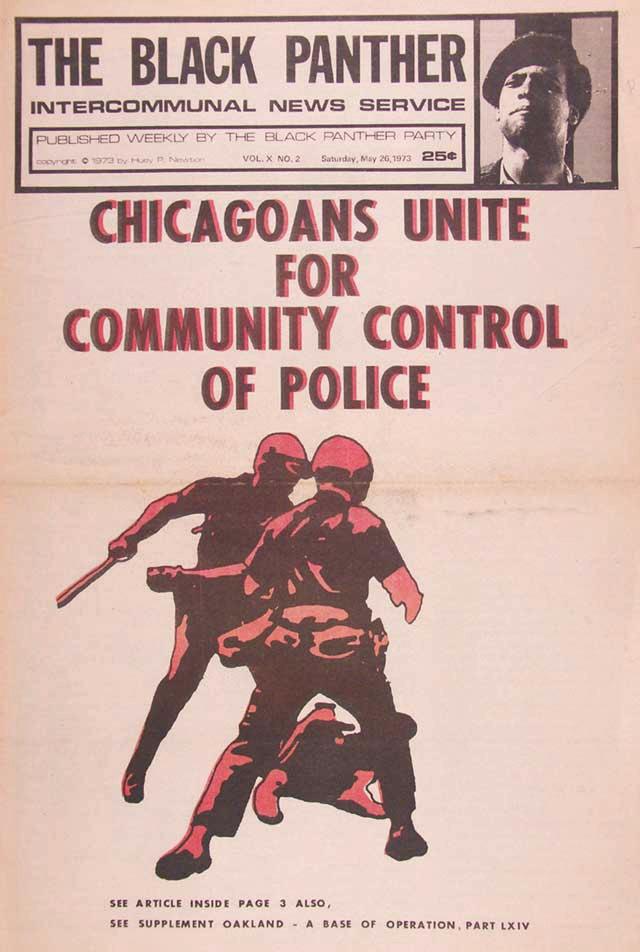
COURTESY OF THE HISTORICAL PRESERVATION SOCIETY OF THE ILLINOIS CHAPTER OF THE BLACK PANTHER PARTY
It’s never been a democratic option before for our people to say who polices our communities and how our communities are policed. We have been living under police tyranny for 100 years in this city, going all the way back to the 1919 race riots when the police joined white mobs to murder us in the streets. So this has never happened before. Not only has it never happened before in Chicago, it’s never happened before in the United States.
And therefore, we put a high priority on these elections. The people who don’t want this to happen are the Fraternal Order of Police and some of the alderpeople who cosign everything that they say and even, to some extent, the mayor’s o ce itself, which was forced to come as far as they could on this. They fought us all the way. We negotiated every line of the ECPS ordinance with the mayor’s o ce. I can tell you because I was sitting at the negotiating table. We had to fight for every line that meant something to our people. We won some of those fights, and we lost some of them.
I think the FOP realizes that they’re not
the most popular group in south-side and west-side communities, because people in these communities are acutely aware of the harm that they bring: they have lost family members, both in terms of being killed and brutalized. They have lost family members in terms of being incarcerated for crimes they did not commit when Jon Burge was operating his torture crew—they tortured and forced hundreds of people to confess to crimes that they didn’t commit, which means that they left hundreds of people who actually committed those crimes on the streets.
So these are the abuses and excesses that have been deeply felt by the Black and Brown communities of the city, but especially the Black community. All you gotta do is look at statistics; they tell the truth, that we’re overwhelmingly impacted by this, more than any other community in this city. That’s why the FOP don’t have a lot of [ballot petition] challenges on the south side and the west side, openly, that is, because they realize that they’re not that popular in these communities where they have been the perpetrators and the defenders of police crimes for decades.
What [the FOP] do have are people who they influence in these communities, who we expect them to back. We’re going to beat them at the ballot box. That’s where we want to beat them because we want this to be a democratic option that is used by people to get this done. So we’re saying we win at the ballot box, or we’ll catch the bullets later. So it’s really like Malcolm X once said: “the ballot or the bullet.”
We are very confident that we will win, because our people are sick and tired of being sick and tired of the police committing crimes in our communities and going unpunished. This was a democratic option all the way around, where we say not only who polices our communities, but how our communities are policed, so that the real safety needs of our community can be responded to appropriately. And that means not shooting down people with their arms raised in the air in the posture of surrender, like Adam Toledo was, or shooting people that have a little penknife like Laquan McDonald did, several feet away from you, yet you put 16 shots into him.
We don’t need that kind of policing in Chicago or anyplace else in this country. And only we the people can stop it. This is a movement that has to begin in the cities, at the local level, where we the people have our hands on the levers of power and we can change this. v
JANUARY 12, 2023 - CHICAGO READER 17
NEWS & POLITICS
@jimdaleywrites
ARTS & CULTURE
BOOKS
Inside Ling Ma’s darkly funny fiction
In Bliss Montage, the author uses horror to expand our sense of reality.
By JACK HELBIG
Farrar, Straus, and Giroux, hardcover, 240 pp., $26, us.macmillan.com
FARRAR, STRAUS, AND GIROUX
Idon’t usually get ensnared by a book. But Ling Ma’s short story collection, Bliss Montage , was different. I started reading it Thanksgiving morning and literally could not stop. There was something urgent in Ma’s writing, something that demanded full attention. It might be her distinctive voice—wry, witty, relatable. Or her sentences—carefully crafted, but not too carefully. Or the fact that there is always something savage and dark behind her polished prose.
Ling Ma’s stories are about people who don’t fit in, who don’t feel at home, even in their own skin. They don’t know who they are or what they want. And when they dare to do something decisive, things inevitably go wrong.
In one story, “Oranges,” the narrator, the survivor of an abusive relationship, becomes obsessed with trying to warn her ex’s current girlfriend about him. No surprise, things do not go well. In Ma’s world, no good deed goes unpunished.
In a Kirkus interview, the author said she often works in the horror genre. As in the horror of Gregor Samsa, waking to find himself transformed into a gigantic beetle. In Ma’s story, “Tomorrow,” a pregnant woman finds that she must live with her unborn child’s forearm protruding penis-like from her vagina. Very Ka aesque, this weird mix of horror and humor. Ma calls Ka a her ”bread and butter.”
Similarly, in “Yeti Lovemaking,” the narrator recounts a fling with an abominable snowman, an experience that sounds increasingly
horrific the more she reveals about it. She writes, “Making love to a Yeti is di cult and painful at first but easy once you’ve done it more than thirty times . . . the skin toughens, capillaries become less prone to breakage. Contusions heal by morning—you don’t even see them. Certain fluids stop secreting altogether.” Horrifying. And funny.
“For the very dark topics, you have to be funny,” Ma tells me.
After reading Bliss Montage twice, I had to read Severance Severance put Ma on the map, winning her the 2018 Kirkus Prize for Fiction, and earning her a place on lots of best books lists. It is a fascinating, odd, hybrid novel; part comic o ce fiction, part post-apocalyptic portrait of America. Imagine the world-weary comedy of Parks and Recreation with scenes reminiscent of Octavia Butler’s Afrofuturist dystopias. In a Paris Review interview, Ma says she watched a lot of The Walking Dead while writing it, and also read Kazuo Ishiguro’s The Remains of the Day, Karl Ove Knausgård’s My Struggle, and Emil Ferris’s My Favorite Thing Is Monsters.

The tone of Severance is similar to Bliss Montage. And so are the issues the characters face. In Severance , the hero, a disaffected New Yorker named Candace Chen, first drifts through life in Manhattan, working at a publishing job she kind of hates, and then, after the country is paralyzed by a brain-destroying pandemic that zombifies its victims, joins a group of drifters tripping across the country looking for . . . what? They’re not sure.
Ma was born in Sanming, Fujian, China; her parents took her to America when she was six. She grew up in Utah, Kansas, and Nebraska, attended the University of Chicago and Cornell, worked at various jobs in Chicago, New York, Los Angeles, and the Bay Area, and seems to have never felt entirely at home anywhere. China is not home either. “I’m not very fluent in Mandarin,” she tells me, “I can speak conversational Chinese.”
Ma spent her childhood reading. “My parents were both so busy and doing other things. I mostly had to entertain myself. Going to the library was really the highlight of my week.”
Ma also loved movies. Her stories abound in references to them: Torn Curtain, L’avventura, Ghost World . One story in Bliss Montage is about a woman who becomes a professor of cinema studies. The very title of the book is a term in film studies; coined by film scholar Jeanine Basinger, bliss montage refers to movie sequences where a series of pleasurable moments (a date, a birthday party, a trip) are edited together, usually with sound behind it.
“I worked at the library,” she explains. “I would just get loads of movies and watch them through the weekend. I got a hold of Ingmar Bergman. I watched a bunch of Hitchcock as a teenager. I’m a big fan of Hitchcock films. I really admire the way that he sets up many of his storytelling elements.”
“A lot of my cultural consumption as a kid and as a teen was about assimilation,” Ma admits, “trying to understand this culture that I had ended up in but had not personally chosen for myself. But I think I was also trying to demonstrate some kind of mastery of [American] culture.” This may explain why she packs her work with so many pop culture references (Liz Phair, Margaret Cho, red Solo cups, Judith Butler).
“[I was] trying to learn how to pass as American, trying to figure out how, not through what I was wearing, but through, I guess, my mental state, my frame of mind.” Ma pauses, not finishing the thought, then says, “Like, what is the American frame of mind?”
In a 2019 interview in the Chicago Tribune, she admitted she felt pressured, while an MFA candidate, to write a “traditional immigration novel.” This issue comes up in her story, “Peking Duck,” where a woman is criticized in a writing class for perpetuating Asian stereotypes. “I think that’s a particularly painful moment,” Ma sighs. “Perhaps the story does shepherd in some stereotypes, unconsciously or otherwise. But that’s, I think, just the burden of representation. One story, one narrative has to represent all this entire group of people. And that’s what a lot of non-white writers have to go through, or be subjected to, that burden of representation. I think it’s also why, with Severance, I resisted writing a traditional immigrant narrative. I didn’t want my first book to be an immigrant narrative.”
Still, the issue of identity is central to Ma’s work.
After high school, Ma went to the University of Chicago with the idea of perhaps becoming an archaeologist. “Dig things up, put things together, was my idea of an interesting way of spending my time.” That didn’t work out, and Ma tried anthropology and then economics. “I think I just ended up majoring in English because the Chicago winters are very long.” Ma quips, “You get depressed and all you can do is stay in the apartment and read Henry James.”
After college she worked at various publishing jobs. For a while she lived in Berkeley, California, and wrote for the East Bay Express. She attended a summer journalism fellowship at Northwestern’s Medill School, and wrote for the Reader. But Ma’s foray into journalism was short-lived. She lacked, in her words, “a journalist’s killer instinct.”
Instead, Ma found her home in fiction.
“I think fiction is the space where you can explore things you would never do yourself in your own life,” she says. “[Fiction] is not about replicating reality. It’s actually about expanding experience. That’s really what you want to do, to go beyond experience.” v
18 CHICAGO READER - JANUARY 12, 2023 ll
COURTESY
R BLISS MONTAGE BY LING MA
@JackHelbig
BLUES@ LOGAN CENTER
BLUES STORYTELLING WITH GAYE ADEGBALOLA, DOM FLEMONS, & DAMON LOCKS

FRI, JAN 20 / 7:30PM / PERFORMANCE HALL /
FREE
Join three celebrated artists on a journey into the human condition, illuminated by diverse storytelling styles alongside Blues music as a medium and entry point into the Black American musical genre and tradition. With music from traditional and contemporary instruments, spoken text, humor, sound essays, lyrical poetry, and more, this is a night audiences won’t soon forget.
RETURNING TO THE SOURCE: YOU SO COUNTRY!
THU, FEB 23 / 6PM
/ VIRTUAL EVENT / FREE
This investigation of Blues and Black rural identity, and the rich musical and visual cultures that stem from both, will challenge the invisibility of Black bodies in rural spaces. Our expert panel of scholars and artists curates an evening of Black rural culture through the intersecting lenses of Country Blues, Black Country Music and Visual Arts, and a trip into the heart of Black Appalachia.
SAVE THE DATE
SAT, APR 1 / 7:30PM
/ PERFORMANCE HALL
Blues Geographies with Corey Harris and James Leva, moderated by Matthew Skoller, will be an evening of performance, conversation, and delicious local BBQ. Tickets go on sale February 15.
logancenter. uchicago.edu
Logan Center for the Arts 915 E 60th St • Chicago loganUChicago
JANUARY 12, 2023 - CHICAGO READER 19
The Logan Center’s Blues programming is made possible with the generous support of The Jonathan Logan Family Foundation with additional support provided by the Chill Family Fund for the Logan Center for the Arts. Gaye Adegbalola. Photo: Marc Norberg.
VISUAL ART

Excavating the unconscious




 By KAYLEN RALPH
By KAYLEN RALPH
Krista Franklin has a recurring fantasy in which she burns all her journals.
“Watching the flames dance in a fire pit glowing from the kindling of my memories,” she writes in “On Time,” one of several lyrical essays included in Solo(s): Krista Franklin , a catalog of visual art and poetry by the Chicago-based artist. It was published in September, on the occasion of her exhibition of the same name opening at the DePaul Art Museum, which is on view through February 19.
I enjoy the shock of this confession flash my therapist’s neutral expression at my glee, every journal I’ve written transmuted to ash.
Me: I took an entire composition notebook from 20xx, and fed chunks into the metal teeth of the shredder until every bluebaby line was in ribbons.
Therapist: And how did that make you feel?
Franklin’s answer is redacted by way of a thick black line.
In poetry, this method of self-censoring is
known as erasure—the application of which is straightforward and obvious in this essay; we don’t know how Franklin felt about destroying her composition notebook. But in Franklin’s visual art, the idea of erasure transcends mere form or convention. Her writing and visual art practices are in constant communion, especially in her collage work, which features text and images from vintage magazines (mostly from the 1950s, ‘60s, and ‘70s).
In these collages, the text that peeks through serves as the underpainting, a technique in which artists apply a base layer of their chosen medium, which informs the rest of the work. Franklin’s chosen medium is her own diaristic writings—a di erent approach to the productive destruction she fantasizes about by flame.

“I’ll have a sheet of paper . . . and I’ll just start writing,” she says. “It’s usually things that I don’t necessarily want the viewer to see or to fully access. You might be able to see one or two words, but it could be anything. It’s usually me ranting about something that’s going on in my life that I’m not satisfied with, or being frustrated about something, and then using the paint, using the collage, using the other images to kind of fade

20 CHICAGO READER - JANUARY 12, 2023 ll
ARTS & CULTURE
Krista Franklin’s surrealist works envision a more radical world.
SUPPORT FOR THESE EXHIBITIONS IS PROVIDED BY ALPHAWOOD FOUNDATION CHICAGO IMAGE CREDIT: Violet Oakley, Portrait of Edith Emerson Lecturing c. 1935, Oil on canvas, 35” x 45,” Woodmere Art Museum, Philadelphia, PA: Gift of the Pennsylvania Academy of Fine Arts, 2012. Courtesy of Woodmere Art Museum. CHICAGO
PLEASE NOTE: The First Homosexuals contains sexually explicit content. For mature audiences only. A revealing look at same-sex desire. Discover how artists across five continents expressed queer identity in this pioneering, multimedium survey from collections around the globe. FINAL WEEKS! MUST CLOSE JAN 28 GET TICKETS wrightwood659.org THE FIRST 1869-1930 GLOBAL DEPICTIONS OF A NEW IDENTITY ONE OF THE TOP 15 LGBT ART SHOWS NBC Out “SPICING UP GLOBAL MUSEUMS THIS FALL”
“Krista Franklin: Solo(s),” at DePaul Art Museum, through February 19, 2023 DABIN AHN
WRIGHTWOOD
R “SOLO(S): KRISTA FRANKLIN”
Through 2/ 19: Wed-Thu 11 AM-7 PM, Fri-Sun 11 AM- 5 PM, DePaul Art Museum, 935 W. Fullerton, 773 - 325 -7506, resources. depaul.edu/art-museum, free
it out. Not completely obscure it—because I do like the idea of the handwriting as texture, as a drawing gesture—but I also want the messages that I’m putting under there to be buried.”
Franklin is hardly the first to underpaint collage with text, nor will she be the last, as the form enjoys a resurgence in popularity of late. She wants the hidden messages to draw viewers in, beckoning us closer, but we are held back at arm’s length. There is rich interiority to Franklin’s work, and she is rightly protective of that.
Franklin is a surrealist, a practitioner of a movement dedicated to divulging the unconscious mind through art. The practice has blended art and literature since its inception in the early 20th century. Early on in her practice, Franklin was heavily influenced by “AfroSurreal Manifesto,” a poem written by D. Scot Miller in 2009. Franklin’s 2018 exhibition at the Poetry Foundation, “ . . . to take root among the stars.,” grapples with her own practice through the surrealist lens. The exhibition, as described by the Poetry Foundation, “uses articles sourced from vintage Ebony magazines that address or make transparent space travel and radical imaginings.” A majority of the works from that project
are included in Solo(s)
“‘ . . . to take root among the stars.’ in particular was a very heavy-handed gesture of mine to try to parse out where I could see those evidences of surrealist activity in music, in books that were particularly written by or about Black people in the African diaspora,” Franklin says. “I was really trying to figure out: What is surrealism? How does it operate? How does it play out in my work?”
She is still discerning those answers, but the core tenet of surrealism, to excavate the unconscious, is embodied in the semiconcealed underpainting—or rather, the underwriting—that Franklin has elevated to a form of visual poetry.
“What is happening with surrealism, and what you’re hearing and seeing out of the artists, especially the women artists [in the early 20th century], has to do with that hidden world, that interior landscape that we’re so often taught to hide,” Franklin says. “Historically, a woman who was too free was going to get herself in a lot of trouble. I think [surrealism] really speaks to that passion that bubbles up.”
Surrealism is not a form that remains in the era of its post-World War I origins; its founda-
tional antiestablishment tenets are still very much at play across the practice. In 2012, Franklin founded the artistic collective du monde noir (originally known as AfroSurreal Chicago) along with fellow artists Devin Cain and Alexandria Eregbu, who together studied historical and contemporary AfroSurrealism, ultimately producing a performative exhibition in 2015 at Columbia College called “Marvelous Freedom: Vigilance of Desire, Revisited,” showcasing the work of Chicago artists of color making art through an AfroSurrealist lens.

The original “Marvelous Freedom” exhibition happened in Chicago in 1976. Franklin and her collaborators referenced the title because they were trying to track and trace the influence of the international exhibition. “How can we extend that to the present moment and look at Black contemporary artists in the city who are making art in that vein, who may not even know that it’s surreal work?” they wondered.
Franklin is interested in exploring what it would take to create a new world, one that might not make sense through the schema of what we expect and exist within today. She feels Chicago is ripe for this exploration.
ARTS & CULTURE
“There’s a spirit of radicalism here,” Franklin says. “A resistance. Troubling the status quo, saying no. Protest. Resisting anything that might impede upon anyone’s freedoms. That is really a spirit, an energy, that keeps me here, and that’s very much tied into the surreal. This real world that we’re living in—it’s not doing the job.”
Nowhere is Franklin’s fondness for Chicago more apparent than in Library of Love, a project first staged in 2014 at the University of Chicago’s Arts + Public Life/Center for the Study of Race, Politics and Culture. At that time, Franklin was fixated on heightened levels of violence in the city. Just shy of a decade later, Franklin and Ionit Behar, an associate curator at DePaul Art Museum, revisited and restaged Library of Love for “Solo(s).” The project remains Franklin’s visual love letter to a city in turmoil, in which visitors are invited to enter a home library setting filled with books about love. There is music playing and comfortable furniture; there are fresh flowers that Franklin herself tends to weekly. Beauty flourishes here, amidst the city’s chaos.
“If we understand an invisible library as mental, hidden, lost, censored, or one that does not yet exist, then tangible libraries do not repress
JANUARY 12, 2023 - CHICAGO READER 21
SUPPORT FOR THESE EXHIBITIONS IS PROVIDED BY ALPHAWOOD FOUNDATION CHICAGO IMAGE CREDITS:“Cosmic Wanderlust” painting from CTRL-Home/ Echo 11-B-1 (CRH-2) Michiko Itatani, 2011, 78”x96,” oil on canvas, courtesy of Michiko Itatani. CHICAGO
Explore mysterious portals to the unknown. Celebrate the breathtaking and exquisite works of Chicago-based, American artist Michiko Itatani, through her mystical paintings and drawings FINAL WEEKS! MUST CLOSE JAN 28 GET TICKETS wrightwood659.org MUSEUM PUBLICITY “Inspiring grandeur of the unknown”
WRIGHTWOOD
ARTS & CULTURE
continued from p. 21
mental libraries—they are only their mental support,” Behar writes in the Solo(s) catalog. “Invisible libraries like Library of Love take us to the very foundations of our humanity. Like libraries, love in its broadest form can be both visible and invisible, and it is present everywhere in Franklin’s practice—as a writer, performer, and visual poet, and especially as a human being—Library of Love encapsulates Franklin’s philosophy of life.”
“We have to make a new world,” Franklin says. “And that to me is a part of the surrealist ideologies, to create a new world, to allow new worlds to emerge that may not make sense to you. I like that about this city. . . . I feel like being in touch with the Chicago surrealists of the past has really helped me to understand that legacy that happens here.”
As a part of the revisited “Marvelous Freedom” exhibition, Franklin, along with April Sheridan and Ben Blount, designed a republication of “AfroSurreal Manifesto” in book form.
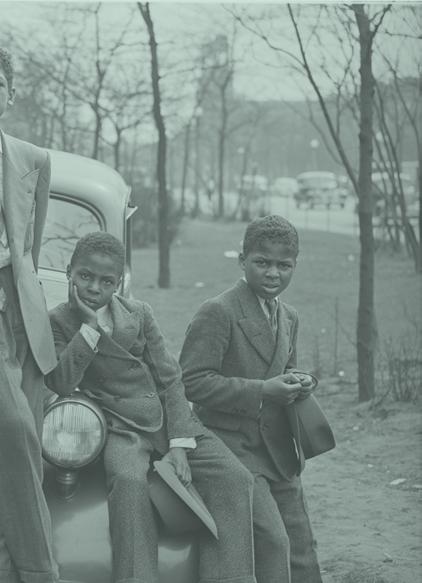
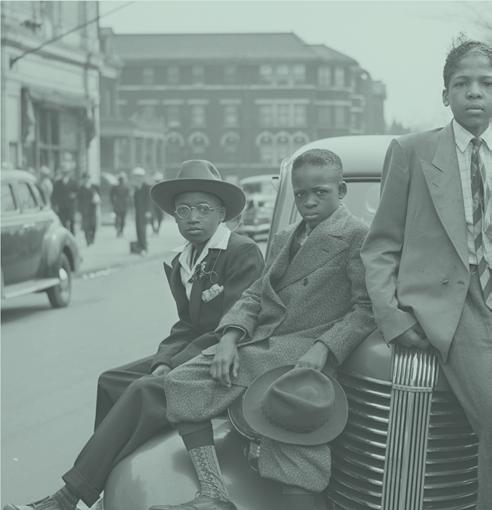
Sheridan is the special collections manager at the School of the Art Institute of Chicago and a longtime friend and collaborator of Franklin’s.

Sheridan printed all of the letterpress pages in what would become Franklin’s 2018 artist book, Under the Knife , a truly stunning volume that Candor Arts, the publisher, described as “Part memoir, part treatise, part collage and experiment . . . an excavation; a dig at the sites of the construction and demolition of the poet/artist’s selves.” Portions of Under the Knife are also included in Solo(s)
“Krista is always timeless,” Sheridan says. “She’s always doing her own thing in a way that is moving between writing and collage and visual work. Sometimes they’re separate, and sometimes they’re together, but they’re always doing a really similar kind of work. It’s like she’s creating these dreamscapes for us.”
Sheridan says she feels like visual artists are sometimes the best writers, and Franklin’s work is testament to such.
“I can be more intimate with the writing,” Franklin says. “There are things I can do in the writing that I’m not capable of doing in the visual art. I like the idea of it being underwriting, or giving further, deeper understanding of the concepts that I’m kind of working through in my [visual art] practice. The concepts vary. For me,
it really is about history, it is about time—past, present, future—and the combination of those things, the amalgamation of that continuum. But then also there’s a lot in my work, mainly in my writing, that has to do with looking at the self, deep self-analysis.”
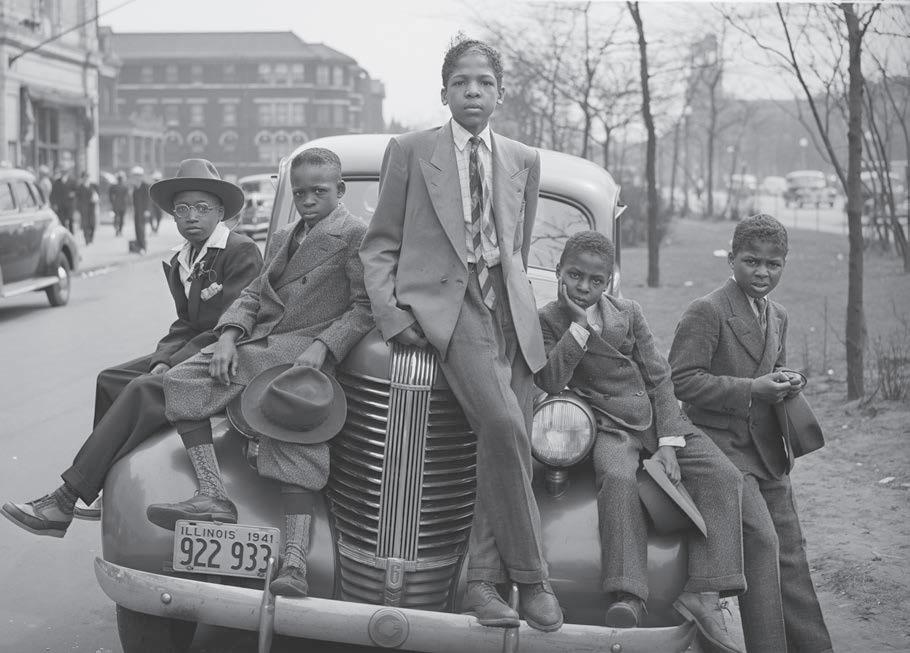
And here is where Franklin’s true identity as a surrealist comes into play. It is not only that she


Franklin’s writing and visual art practices are in constant communion, especially in her collage work, which features text and images from vintage magazines.
 DABIN AHN
DABIN AHN
creates surrealist art, it is that the very act of her creation is in and of itself a surrealist act. “It’s tricky,” she says. “Because surrealism in and of itself morphs, it’s an organic body.”
As is Franklin’s body—all of ours are. Nothing needs to stay the same. v

22 CHICAGO READER - JANUARY 12, 2023 ll
Southside, Chicago, Illinois, 1941. Russell Lee. Farm Security Administration/O ce of War Information Photograph Collection, Prints & Photographs Division, Library of Congress, LCDIGppmsc00256. Open
29
@kaylenralph
Jan.
e Negro Motorist Green Book was created by the Smithsonian Institution Traveling Exhibition Service in collaboration with Candacy Taylor
and made possible through the
generous support of Exxon Mobil Corporation.
to Chicago’s Police District Council races






















 By JIM DALEY AND SKY PATTERSON
By JIM DALEY AND SKY PATTERSON

This February, Chicago will make history.
After decades of struggle by thousands of people who organized, marched, petitioned, prayed, and collectively clamored for the right to have a say in how their communities are policed, on February 28 voters will elect 66 people to serve on police district councils across the city.
The battle for community control of the police has been waged for more than a half-century. Deputy chairman Fred Hampton and the Black Panther Party sparked the first push in the late 1960s (see “Fifty years of struggle,” p. 16). In the decades since, organizers have won incremental concessions. The Office of Professional Standards was created within the police department in 1974. It was replaced by the Independent Police Review Authority in 2007, which was in turn replaced by the Civilian O ce of Police Accountability a decade later. Each agency was created thanks to the tireless e orts of ordinary Chicagoans. None of the people serving on them were democratically elected.
The police district councils will be elected. Three councilors will serve in each of the city’s 22 police districts for four-year terms. They’ll be tasked with building connections between police and communities, developing community policing initiatives, getting community input on CPD policies, and ensuring the citywide Community Commission for Public Safety and Accountability (CCPSA) hears the community’s concerns.
The Empowering Communities for Public Safety (ECPS) ordinance that created the councils and the CCPSA is the result of a decade of organizing spurred by the 2012 killing of 22-yearold Rekia Boyd by Dante Servin, an o -duty police detective, in Douglass Park. Servin, found not guilty of involuntary manslaughter because the judge determined he’d shot Boyd intentionally, resigned from the department with a pension. In response to that killing, organizers began the push for community control of police anew.
In the ensuing years, as high-profile killings by police across the country mounted, they catalyzed the Black Lives Matter movement, a nationwide e ort to get government o cials to do something—anything—to stem the epidemic of violence wrought upon Black and Brown communities by the very ocers tasked with keeping them safe. In Chicago and elsewhere,
the police kept killing people. The victims were often unarmed, and they were almost always Black.
In 2014, then-o cer Jason Van Dyke shot 17-year-old Laquan McDonald 16 times, killing him. When video footage of the shooting was released, thousands of Chicagoans protested downtown, shutting down the Magnificent Mile during Black Friday and staging a sit-in at the o ce of State’s Attorney Anita Alvarez, who activists said had mishandled the prosecutions of both Van Dyke and Servin. In the wake of the protests, Van Dyke was found guilty of second-degree murder, and the U.S. Department of Justice placed the CPD under a federal consent decree.
Everything changed in 2020, as protests of the murder of George Floyd by then-Minneapolis cop Derek Chauvin swept the nation.
In Chicago and elsewhere, the rebellions (and the police response to them) turned into a long, hot summer. In its midst, the Grassroots Alliance for Police Accountability and the Chicago Alliance Against Racist and Political Repression formed a coalition, Empowering Communities for Public Safety. With thousands of ordinary people at its back and in the streets, the coalition negotiated the language of the ECPS ordinance with the mayor. It passed in 2021.
Chicagoans have been promised police reform before, and the department’s entrenched attitude against change could make some wonder how e ective the district councils will be. One clue to the power they may wield lies in who’s on the ballot. In addition to ordinary residents and dedicated activists, several candidates with law enforcement ties are running. And the Fraternal Order of Police’s election attorney filed challenges to several progressive candidates’ ballot petitions, is listed as the contact person for six more on Chicago Board of Election Commissioners filings, and is himself running.


We sent questionnaires to district council candidates, interviewed as many as we could reach, and researched their backgrounds using sources ranging from social media to biographies compiled by the ECPS coalition. The full questionnaire responses are on our website. You can find your police district at The TRiiBE’s election center (bit.ly/TRiiBEMap), and your polling location at bit.ly/ChiPrecincts. —Jim Daley v

JANUARY 13, 2023 - CHICAGO READER 23
GUIDE
2023 VOTER
SPECIAL PULLOUT SECTION KEY: Activist or community organizer Links to CPD or FOP Political endorsement Supports more accountability for police Scan here to find your precinct. Find your district via The TRiiBE’s interactive map. KIRK WILLIAMSON FOR CHICAGO READER AMBER HUFF FOR CHICAGO READER
1st 1s t District 2 nd n 2 D
Sarah Kammerer
Jamie Brown
An attorney, Brown was a volunteer advisor for Daniel Biss’s 2018 bid for governor. Brown was on Chicago Votes’ board of directors for three years, and is a precinct captain and zoning board community representative in the 25th Ward.




Janice Jones
Jones is facilitator for CPD beat 334. She says “No single approach is right for every community.” Alderperson Gregory Mitchell (Seventh Ward) has endorsed.


Ana Marija Sokovic
Kammerer worked in Congress and on Mitt Romney’s 2008 presidential campaign. She co-founded ChiWomenVote and IllinoisWomenVote and serves on the advisory council of the nonprofit New Politics and on the leadership council of ProPublica.
Ephraim Lee
Julia Kline
Kenya Franklin
District

A Navy reservist for 24 years, Lee is pursuing a master’s degree in social work. He said that the CPD has lacked high standards of professionalism, which has led to increased crime and community distrust. He wants to “bring leadership, fairness, and transparency to a police department that is struggling to live up to its members and the citizens of this city.”
A former CPS teacher, Kline is a community organizer, sales and marketing consultant, and voting rights activist. She is a cofounder along with Jocelyn McClelland and Morrow Cleveland of Neighbors Who Vote, which works on voter registration and turnout, cross-neighborhood organizing, and amplifying the work of other groups.
A political strategist and mother of three, Franklin has lived in the third police district her entire life. She wants to improve transparency between CPD and residents. She supports a two-strike rule for officers who garner racial and violent complaints and wants to end qualified immunity.
A computational scientist at UIC, Sokovic participated in the nonviolent student movement in Serbia that overthrew Slobodan Miloševic. “I experienced firsthand that the people together, with discipline, humor, and careful planning, can move mountains,” she said. She envisions a public safety approach where “the community is empowered, and healing and reconciliation are prioritized over punishment.” Alderperson Gregory Mitchell (Seventh Ward) and Martina Hone (5th Ward aldermanic candidate) have endorsed.
Jim Blissitt III


A member of CAARPR, Blissitt has worked with a variety of community organizations including Resident Association of Greater Englewood and Chicago Community Trust. With the Woodlawn Children’s Community Promise Freedom School, he organized youth demonstrations against gun violence. He also worked with the Urban League to facilitate police board community input forums. Blissitt owns a secured transportation company that serves the cannabis industry.
Craig T. Carrington
Coston Plummer














A community court case manager for the Restortive Justice Community Court in Englewood, Carrington has also worked as a court liaison for the Cook County Adult Probation Department, as a commnuity organizer for St. Anthony Hospital, and as a paralegal in the o ce of the Illinois Attorney General.
Perez worked for Aurora’s mayoral department of communications for four years and was the director of community engagement for West Aurora School District 129 for over a year. He says he’s running “to increase transparency and accountability through modernization of communication and outreach e orts.”
A home care worker and a member of SEIU, United Working Families, and the Chicago Alliance Against Racist and Political Repression (CAARPR), Plummer has done community work in Washington Park since 2016. “I want every neighborhood to have the policing it deserves,” he says, “and I want to be the vessel to my community that helps make that happen.” Alderperson Jeanette Taylor (20th ward) and SEIU have endorsed.
Anthony David Bryant
Bryant has worked as a government affairs associate for Metropolitan Family Services, as a legislative administrator for State Representative Lamont J. Robinson, and as a community outreach and engagement associate for The TRiiBE. Alderperson Jeanette Taylor (20th Ward), Desmon Yancy (Fifth Ward aldermanic candidate), Jocilyn Floyd (Seventh Ward adlermanic candidate), State Representative Lamont J. Robinson (Fifth District), and the Center For Racial & Gender Equity Coalition of African American Leaders have endorsed.

24 CHICAGO READER - JANUARY 12, 2023 ll
3 rd r 3 D
District
Alexander Perez
Supports more accountability for police
Activist or community organizer
Links to CPD or FOP
Political endorsement
KEY:
4 th t 4 h

District

Meridth Vanae Hammer
An attorney in real estate law, contract law, and trust and estate planning, Hammer is founder and CEO of an Indianapolis real estate law firm. She served as deputy general counsel to the Clerk of the Circuit Court of Cook County, and ran unsuccessfully for Cook County judge in the 2022 primary.
Brenda Waters
A healthcare worker for almost 50 years, Waters is the president of Friends of Merrill Park and serves on the Merrill Park Advisory Council through the Park District. She told the Reader her sister was shot in the back by CPD in the 1990, but survived. If elected, she says she’ll “insist on building stronger connections between police and the community and getting community input” on policing.
Julio Miramontes
A community organizer and social infrastructure engineer, Miramontes was formerly Tenth Ward alderperson Susan Sadlowski Garza’s director of community engagement and government a airs. He cofounded the Southeast Side of Chicago Food Pantry and helped establish the United Neighbors of the Tenth Ward Independent Political Organization.
Gloria Jenkins
A resident of Calumet Heights, Jenkins did not respond to requests for comment. Alderperson Greg Mitchell (Seventh Ward) has endorsed.


Lovie Bernard









Bernard joined the Black Panther Party as a teenager and was one of the first patients at the Party’s free clinic. She says she remembers viewing the aftermath of the CPD assassination of Fred Hampton and attending his funeral. Since 2021, she has worked as an assistant to Seventh Ward alderperson Greg Mitchell. Mitchell has endorsed.
Thomas L. McMahon
5 th t 5 h District
A retired Chicago police captain, McMahon was a gang homicide detective from 1980 to 1996 and a CPD member until 2010. The Invisible Institute’s Citizens Police Data Project reports he had 21 allegations of misconduct over his career, more than 77 percent of o cers in the department; two were sustained.




Eric Russell
6 th t 6 h District




David Boykin
Ponchita Moore
A grievance representative for SEIU Healthcare Illinios, a union of healthcare workers, Moore has attended protests against police brutality in the past. She believes “all Chicago citizens deserve fair policing and community services that are tailored to the challenges and needs of our communities despite our social or economic backgrounds.”
Michael E. Mayden
An ordained minister, Mayden is also president and founder of Future Entrepreneurs of America, a nonprofit that promotes sports management. Mayden served on a Local School Council for two years and has run for alderperson and state representative. His platform includes bimonthly community meetings, common-sense policing, and “community and the police working together as one.”
Russell is the founder and executive director of Tree of Life Justice League of Illinois, a nonprofit that advocates for police accountability and provides services for families a ected by police violence. Congressman Danny Davis (IL-7), St. Sabina parish priest Michael Pfleger, and Violence Interrupters have endorsed.
A musician, educator, and high school counselor from the west side, Boykin has lived in the district for over a decade. As a counselor, he works extensively with teenage Black boys, whom he says are “the most atrisk demographic to be subject to interaction with the police and the carceral state” and that his experience has given him “an understanding of the need for alternative policing strategies.”
JANUARY 13, 2023 - CHICAGO READER 25
Supports more accountability for police
Activist or community organizer
Links to CPD or FOP
KEY:
Political endorsement
7 th t 7 h District



Dion Terrell McGill




A community outreach manager at Lurie Children’s Hospital, McGill describes himself as a “public health professional focused on gun violence prevention and public safety for more than seven years.” McGill formerly taught in CPS and was the program manager of the Student Voices Program, a youth gun-violence initiative at the Illinois Council Against Handgun Violence.
Cherli Montgomery
Cherli Montgomery is a member of Teamsters Local Union 727 (IBT) and served on the Local School Council for Charles W. Earle elementary school. Alderperson David Moore (17th Ward), State Representative Sonya Harper (6th District), and Congressman Danny Davis (IL-7) have endorsed.
Teresa R. Chandler
A community outreach specialist at the Cook County Assessor’s Office, Chandler has a master’s in Inner City Studies and a bachelor’s in Criminal Justice and Corrections.
Krystal Peters
A member of the Workers Center for Racial Justice, Peters also serves as a district leader for the Center for Racial and Gender Equity (CRGE). She criticized CPD’s proposed gang-database redux at a November meeting of the Interim Community Commission for Public Safety and Accountability, and is “committed to advancing community public safety and police accountability practices [and] ensuring Black communities have a voice at decision-making tables.” CRGE has endorsed.
Verna Swan





A resident of West Englewood, Swan did not respond to requests for comment.
 Linda J. Austin Sr.
Linda J. Austin Sr.


A resident of Englewood, Austin did not respond to requests for comment.

Joseph Williams
A resident of West Englewood, Williams did not respond to requests for comment.
8 th t 8 h
District

Albert “Al” Cacciottolo
A superintendent at the Department of Streets and Sanitation, Caccatolio is described as an “advocate for police.” Alderperson Silvana Tabaras (23rd Ward) has endorsed.





Mark Hamberlin
A technician at Rentokil Boecke, Hamberlin is a union steward of the Teamsters Local 781. He is active in the Facebook group 18th Ward Connection, and Alderperson David Moore (17th Ward) recently recognized Hamberlin with a service award. His vision for the district council is “to ensure everyone is held accountable for solving problems.” Alderpersons Stephanie Coleman (16th Ward), Moore, Derrick Curtis (18th Ward), and State Senator Willie Preston (16th District) have endorsed.
Jason Huff

A car-booting supervisor for the city, Hu runs a neighborhood watch, and his social media pages regularly tout volunteer work with CPD programs such as youth soccer events and catalytic converter anti-theft e orts. Alderpersons Raymond Lopez (15th Ward), Derrick Curtis (18th Ward), and Silvana Tabares (27th Ward) have endorsed.
Letina K. Brady Pettis
Pettis is active with the League of Women Voters as well as organizations such as the National Association of University Women, the National Coalition of 100 Black Women, and the National Council of Negro Women. Her spouse is a CPD o cer. Alderpersons Stephaine Coleman (16th Ward), David Moore (17th Ward), Derrick Curtis (18th Ward), Silvana Tabares (27th Ward), and the Chicago Police Sergeant Association have endorsed.
Cydney Wallace
A lifelong south-sider, Wallace has volunteered at the schools her children attend, at her place of worship, and with local nonprofits.
26 CHICAGO READER - JANUARY 12, 2023 ll
Supports more accountability for police
Activist or community organizer Links to CPD or FOP Political endorsement KEY:
9 th t 9 h District


Evelyn Razo
A resident of Back of the Yards, Razo unsuccessfully challenged the ballot petitions of Vicko Alvarez, a socialist candidate who is running for alderperson of the 15th Ward. Razo did not respond to requests for comment.

Abe Matthew

A Bridgeport injury attorney, Matthew says he’s “a firm believer that transparency and community input into public safety decision-making will improve outcomes and protect both o cers and our neighborhoods.” He ran for Congress in 2020 before withdrawing and endorsing Marie Newman, and recently testified before the Illinois General Assembly’s redistricting committee.
Maggie Finucane


Erin Vogel
A former co-executive director of I Grow Chicago (now We Grow Chicago), an Englewood community organization, Vogel has participated in gun-violence prevention and criminal justice reform since 2016. She has completed the CPD’s Citizen Academy and has trained officers in restorative justice practices. She believes in “keeping the integrity of the ECPS ordinance and connecting communities through healing.”
Monserrat Ayala
Carlos Sanchez
A resident of McKinley Park, Sanchez did not respond to requests for comment.


Denise McBroom








A CPS teacher who was the last chief of staff for former alderperson Patrick Daley Thompson (who was convicted on federal charges related to an alleged bank-loan fraud in 2022), McBroom applied to be appointed to replace him but was not selected by the mayor.
A Bridgeport resident, Finucane filed ballot petitions with the assistance of the FOP’s election attorney, Perry Abbasi, who told the Reader the FOP referred her to him. She did not respond to requests for comment.
An organizer from the southwest side, Ayala cofounded #IncreaseThePeace, an organization that promotes youth leadership, peace, and community organizing. She has also worked for the Southwest Organizing Project where she led get-out-the-vote e orts in 2019.
Nolberto Casas
A political liaison at Chicago Gig Alliance, Casas describes himself as a community activist and organizer for environmental justice, living wages for ride-share drivers, and public safety. He attended Brother Rice High School and DePaul University.
10 th t 10 h



Simeon Henderson
A Chicago Public Schools educator, Henderson was a Chicago police officer from 1998 to 2004, during which time he garnered six complaints, one of which was sustained. He says the CPD budget should be increased and that his experience as an o cer can help “bridge the gap between our neighborhoods and the police officers,” adding, “it starts block-by-block and district-by-district.”

Rosemarie Dominguez
A lifelong Little Village resident and longtime community organizer, Dominguez has a master’s in Latin American and Latino studies from UIC. She says, “residents and CAARPR were the ones that prompted me to run, and they are the ones that are going to shape me and my campaign.”
Larry Lawrence
A lifelong west-sider, Lawrence is the senior pastor of Praise Temple of Restoration in Austin. He works with youth at the Cook County Juvenile Detention Center, and says he’s running “to help [bridge] the divide between our police and the communities in which they serve.”
Elianne Bahena
A Little Village resident, Bahena has worked in nonprofits advocating for domestic violence survivors and for immigrant rights. She serves as the director of policy and community outreach for the 22nd Ward Public Service O ce. Bahena also serves the boards of Mujeres Latinas en Accion, Enlace Chicago, and HACE Chicago. Alderperson Michael Rodriguez (22nd Ward) and the 22nd Ward IPO have endorsed.
Leo Guzman
A lifelong Little Village resident, Guzman started the Little Lawndale Neighborhood Studio, a community gathering space that has invited police o cers to host and participate in events in order to interact with community members.
Kiisha Smith
A youth and community advocate from Lawndale, Smith says she knows “exactly what it’s like to be harassed by the police as well as to call them and NOT receive the help, assistance, or protection I needed.”


JANUARY 13, 2023 - CHICAGO READER 27
Supports more accountability for police Activist or community organizer Links to CPD or FOP Political endorsement KEY:
District
11 th t 1 h District 1 12 th 1 th District 2

Brian J. Ramson Jr.


A physicist at Fermilab, Ramson says, “the simultaneous overuse and lack of e ectiveness of the CPD is one of the key factors limiting the rehabilitation of the more troubled areas of the city including much of Chicago’s west side. Solutions to the chronic problems plaguing the operation of this department exist. I intend to find those solutions and assist in implementing them.”
Jocelyn A. Woodards
A senior field representative for the AFL-CIO, Woodards has previously worked for Obama For America, the Democratic National Committee, and as an advisor to former U.S. Congressman Jesse Jackson Jr.
Alees Edwards
A faith-based community organizer, Edwards has been a block club president on the west side for over four years. Edwards currently serves as one of the co-chairs for the mayor’s African American Engagement Council and is the founder and executive director of Drawn Out Ministries, a nonprofit that provides transitional housing to women returning from prison. Alderpersons Walter Burnett (27th Ward), Emma Mitts (37th Ward), and the 1000 N. Harding Block Club have endorsed.
Tamiko Holt
A resident of Garfield Park, Holt did not respond to requests for comment.


John Donatelli
A real estate broker who lives in the West Loop, Donatelli says he’s concerned with crime and accountability. He hopes “to further open dialogue between the [police] district and the neighborhood” and says the CPD’s budget should be increased.
Juan Lopez














A security consultant who lives in Pilsen, Lopez says high crime in the area is due to few o cers, mental health issues, and community mistrust.
Leonardo Quintero
An organizer around youth and family issues such as schools, jails, and funding, Quintero says, “By prioritizing both police accountability and restorative justice, it is possible to create a more just and equitable criminal justice system that promotes public safety and helps to build stronger, more trusting relationships between law enforcement and the communities they serve.”
Michelle D. Page
A CPS teacher assistant, Page has worked with the Community Renewal Society, a faith-based organization that addresses racism and poverty and helped work to get the ECPS ordinance passed. “I know all too well how Black and Brown people are treated, or shall I say mistreated,” she says. “This is an opportunity to change some of the wrongs that have been going on for so long.”
William Guerrero
A 21-year-old artist from Pilsen, Guerrero has organized community events such as open mikes, pop-ups, and peace initiatives. He says he wants to bring a youth’s perspective to the district council. He says he’s running to hold elected o cials and public servants accountable and make sure there is accountability and transparency from them. Alderperson Byron Sigcho-Lopez (25th Ward) has endorsed.
14 th t 1 h District 4

David Orlikoff
A grassroots organizer, Orlikoff was the #DefundCPD outreach lead for the 35th Ward, and has advocated to reduce CPD’s budget by 75 percent and reinvest in communities. United Neighbors of the 35th Ward has endorsed.

Christopher Laurent
A legal assistant, Laurent says he “works directly with city officials and their legal counsel.” His goal as a councilor is “to provide the support and accountability to the police force,” and he considers communication with CPD on behalf of the community to be the primary role of a police district councilor. The Libertarian Party of Chicago has endorsed.
Chloe Vitale
A journalist who has worked with City Bureau’s Documenters program, Vitale is a member of the Bricklayers and Allied Craftworkers Local 21.
Ashley Vargas
A write-in candidate, Vargas has worked for the past year as a field organizer in progressive political campaigns and voter engagement and mobilization, as well as with the Logan Square Neighborhood Association on affordable housing. United Neighbors of the 35th Ward has endorsed.


28 CHICAGO READER - JANUARY 12, 2023 ll Supports more accountability for police Activist or community organizer Links to CPD or FOP Political endorsement KEY:
5
15 th t 1 h
District
Arewa Karen Winters

Deondre’ Rutues
A community organizer and engagement specialist for NYU’s Policing Project, Rutues helped launch its Chicago Neighborhood Policing Initiative and leads its outreach efforts in the 11th, 15th, and 25th Districts. He says his role “is to build and repair the relationship between the Chicago police and the communities they serve” via monthly meetings between CPD and residents and by locating resources to assist public safety e orts.
Carmelita Earls
A retired Chicago Fire Department chief, Earls had a 32-year career and commanded the Fire Academy; in that role she worked with CPD, which she says “enhanced our on-scene rapport.” Her duties were to “formulate, implement, and enforce policies of public safety.” In 2021, she requested a demotion because she had to place two firefighters on no-pay status for vaccine noncompliance. Earls has been a block club captain, precinct captain, aldermanic candidate, ward committeeperson, and president of the Women’s Council of Community Intercession.
An administrative coordinator for the United Congress for Community and Religious Organizations, Winters became active in police reform efforts after CPD shot and killed her 16-year-old great-nephew in 2016. She founded the 411 Movement for Pierre Loury and has worked with Justice For Families and the Chicago Justice Torture Center. Winters cochaired Mayor Lightfoot’s Use of Force Working Group, which convinced CPD to begin requiring o cers to use de-escalation techniques before using force.
Oddis “OJ” Johnson
Formerly a member of the 25th District steering committee, Johnson cofounded the Voters for a Change Coalition of Illinois and United Front Anti-Crime. He’s running “to be a spokesperson and ambassador for the people and bring change to the way that the Chicago police serve and protect our communities.”
Elena X. Thompson
An advocate for families impacted by the child welfare system, Thompson helps provide food, shelter, clothing, and other resources to residents in Humboldt Park and Austin. “I currently am assisting two fellow neighbors against police brutality and also working closely to keep our people safe and secure,” she told the Reader, “and I’m certain that I can be a huge attribute for this o ce.”
Constance Melton
Darius Newsome
A resident of Austin, Newsome did not respond to requests for comment.



An outreach coordinator, Melton attends faith-based meetings led by 15th district CPD o cers. She says, “It’s important to bridge the gap between the community, church, and the police department.”
6
16 th t 1 h
District




David Feller
A senior adviser for legislative a airs at the Cook County Sheri ’s O ce, Feller ran Sheri Tom Dart’s 2022 reelection campaign. He is the the 38th Ward Democratic Organization president and serves on a local school council. Sheri Dart, state senators Omar Aquino (2nd District) and Robert Martwick (10th District), state representative Lindsey LaPointe (19th District), IUOE Local 150 and Mid-America Carpenters Regional Council have endorsed.
Daniel Martin
A former intern for 38th ward alderperson Anthony Napolitano, Martin has worked for 41st ward alderperson Nicholas Sposato since 2019. He told the Reader he believes police funding should be increased, adding, “we hold an annual ‘support the police’ rally outside the 16th District police station.” Alderpersons Napolitano and Sposato have endorsed.
Colleen Murphy
A resident of Jefferson Park, Murphy did not respond to requests for comment.
John Marcatante
A resident of Norwood Park East, Marcatante filed ballot petitions with the assistance of the Fraternal Order of Police’s election attorney, Perry Abbasi, who told the Reader the FOP referred Marcante to him. Marcante did not respond to requests for comment.










Colleen Mary Dillon
An Edison Park resident, Dillon told the Reader , “I know what it’s like to worry about the safety of our children and the future they face.” The Fraternal Order of Police, Chicago Firefighters Local 2, Alderpersons Anthony Napolitano (38th Ward) and Nicholas Sposato (41st Ward) have endorsed.




Dan Butterworth
A bank vice president, Butterworth enrolled in the Citizen Police Academy in suburban North Chicago. He has expressed support for police o cers—and also for the Innocence Project, a nonprofit organization that seeks to exonerate wrongfully convicted people. He says, “Citizens must keep a watchful eye to ensure the fine line between safety and liberty is walked.”

JANUARY 13, 2023 - CHICAGO READER 29
KEY:
Supports more accountability for police Activist or community organizer Links to CPD or FOP Political endorsement
Elizabeth Rochford
Anthony Michael Tamez
The chairman of the Center for Native American Youth’s Advisory Board and a member of the Chi Nations Youth Council, Tamez says, “Enforcing the consent decree is critical to our community’s safety,” and believes “police accountability can become a reality through co-governance.” Alderpersons Carlos Ramirez-Rosa (35th Ward) and Andre Vasquez (40th Ward), United Neighbors of the 35th Ward, 30th Ward United, 50th Ward United Working Families, and 39th Ward Neighbors United have endorsed.
Nick Carusi
A longtime nurse practitioner, Rochford works with ONE Northside on the organization’s Police Accountability Task Force and helped write the ECPS ordinance. Alderpersons Carlos Ramirez-Rosa (35th Ward) and Andre Vasquez (40th Ward), the ONE People’s Campaign, 39th Ward Neighbors United, 30th United, United Neighbors of the 35th Ward, and United Working Families of the 50th Ward have endorsed.
Steve Spagnolo
Steve Spagnolo, the chief of government relations and external a airs at the Lake County State’s Attorney’s O ce, has worked for numerous political campaigns as well as for 43rd Ward alderperson Michele Smith. As a child, he lost his father to gun violence. “We need leadership that will hold police accountable, push back against failed ‘tough on crime’ policies, and work to implement impactful crime-reduction strategies,” he says. Alderperson Andre Vasquez (40th Ward) and Congresswoman Delia Ramirez (3rd District) have endorsed.
Steve San Roman
A resident of Irving Park, Carusi filed ballot petitions with the assistance of the Fraternal Order of Police’s’s election attorney, Perry Abbasi, who told the Reader the FOP referred Carusi to him.
James V. Murphy, III




Murphy was an assistant state’s attorney before he publicy quit last year and slammed Cook County State’s Attorney. Murphy filed ballot petitions with the assistance of the FOP’s election attorney, Perry Abbasi.

Karen Kane
A CPA, Kane says crime has increased significantly and CPD sta ng decreased significantly in the 18th District. “The police department should listen to the community and the residents should listen to the police department,” she says. “Working together, our community will become safer.” Alderpersons Brian Hopkins (2nd Ward), Michelle Smith (43rd Ward), Second Ward democratic committeeman Tim Egan, and 43rd Ward democratic committeeman Lucy Moog have endorsed.
Lisa Seigneur
An active governing board member of Youth for a Better Future, Seward Park Advisory Council participant, Near North Unity Program participant, and River North Residents Association (RNRA) Safety Committee member, Seigneur graduated from CPD’s Citizen’s Police Academy. She told the Reader, “I am pro-police and pro-community advocacy.” Alderperson Walter Burnett (27th Ward), Secretary of State Jesse White, and the Cabrini Development Council have endorsed.
A resident of Sauganash, San Roman declined to comment due to a ballot petition challenge that the Board of Elections had not ruled on as of press time.












Brian Sullivan
A Chicago firefighter, Sullivan recently tweeted, “As the 16th and 17th districts gang conflicts spiral out of control. Our simple request to increase the sta ng levels of our dangerously understaffed districts have fallen on deaf ears. We need more police In [Districts] 16/17 ASAP.”






Amy Cross
An attorney, Cross has consulted with city, county, and state agencies around the country on issues of public policy and justice reform for more than a decade. “I believe that safety and justice are intertwined,” she says, “and my experience and policy expertise has shown me that it is possible to achieve both.” Northside Democracy for America has endorsed.
Robert Johnson
A former Ohio police o cer, Johnson is the chair of the safety and security task force for the Streeterville Organization of Active Residents. He graduated from CPD’s Citizen Police Academy and is the CAPS beat 1833 facilitator.

As her condo association’s president, Bowman developed a safety committee and worked with police and local businesses “to proactively address crime in the area.” Alderperson Brian Hopkins (2nd Ward) has endorsed.
Brad Kessler
An attorney, Kessler led Chicago Public Schools’s anti-gang task force and helped launch its Safe Passage program. He also serves on Lincoln Park High School’s local school council and on the advisory board for the Chicago Children’s Advocacy Center. Kessler says, “The city does not provide CPD with the necessary number of o cers, resources, partnerships, and training that is needed to e ectively (and safely) police the city.”
30 CHICAGO READER - JANUARY 12, 2023 ll Supports more accountability for police Activist or community organizer Links to CPD or FOP Political endorsement KEY: 17
h District7 18 th t 1 h District 8
th t 1
Kimberly Lynn Bowman
Samuel Schoenburg
19 th t 1 h District 9 20 th t 2 h District 0








An attorney, Schoenburg is involved in social justice efforts with Cabrini Green Legal Aid and the Jewish Council on Urban Affairs. He is running in a slate with Maurilio Garcia and Jennifer Scha er. Alderpersons Andre Vasquez (40th ward) and Matt Martin (47th ward), 43rd ward democratic committeeman Lucy Moog, 46th ward aldermanic candidate Angela Clay, the ONE People’s Campaign, and Indivisible Lincoln Square have endorsed the three-candidate slate.
Maurilio Garcia
A market research and brand strategy consultant, Garcia created an initiative through his employer that provides $50,000 grants to local nonprofits. He says the three-person slate’s goal is to push “innovative, research-based strategies that will increase safety in the neighborhoods. We will bring the power to the community, ensuring to include and elevate marginalized voices, and use people power to drive our government o cials to make changes in our public safety system.”
The program manager for ONE Northside’s Communities Partnering for Peace program in Rogers Park and Uptown, Dacres has worked in violence prevention since 2012, when his friend was killed and he was wounded in a shooting. Dacres is running in a slate with Deirdre O’Connor and Anna Rubin. Alderperson Andre Vasquez (40th Ward) and the ONE People’s Campaign have endorsed the slate.
Deirdre O’Connor
O’Connor served as a precinct captain for 15 years and did election campaign work for 40th ward alderperson Andre Vasquez. She says, “We are in a special position to reimagine the notion of policing by the community, for the community.”


Anna Rubin
A leader of her temple’s social justice team, Schaffer worked with the ECPS Coalition to pass the ECPS ordinance. She says the slate will work to “build strong relationships with all people in the community so we can create a shared vision and effectively advocate our elected officials to enact innovative, researched based policies to modernize our public safety system.”
Demerike Palecek
A former member of the USAF Security Forces and Army National Guard, Palecek is president of 46th Ward Democrats, a member of Veterans for Change, and worked on 36th Ward alderperson Gil Villegas’s primary challenge against then-state congresswoman Delia Ramirez. She has organized mutual aid events in her community. She says her mission is to build a community that is “stronger and safer, together, for a brighter future for everyone.”
A member of the Roscoe Village Neighbors’ board of directors, Richman manages the safety and security program and is a liaison with the 19th District CAPS. He holds safety seminars about calling 911, engages in a police appreciation day, and is petitioning to reopen the Belmont and Western police station. Alderperson James Cappleman (46th Ward) has endorsed.
Julienn “Julie” Kaviar
Currently chief of sta to Cook County commissioner Scott Britton, Kaviar was a deputy press secretary for Mayor Rahm Emanuel’s o ce from 2016 to 2018, where she led outreach around the creation of CPD’s Strategic Decision Support Centers and the Community Policing Advisory Panel, and worked with police on community engagement. She says, “Community safety must be a community-based solution.”
An organizer with the Jewish Council on Urban A airs, Rubin has worked to pass policies around immigration and economic justice issues. She says she’s “committed to listening to what our communities need and bringing those ideas forward as concrete policy and funding proposals.”
Patrick McNeil












A retired foreign service officer who has worked at seven U.S. embassies and consulates and with the U.S. State Department, McNeil is a regular at 20th District CAPS meetings. His platform includes promoting responsible policing, engaging the community, and advocating for maintaining CPD funding. He did not seek any endorsements.
Joshua D’Antonio
A socialist organizer, D’Antonio works with CAARPR and has been involved in the fight for community control of the police for five years.
JANUARY 13, 2023 - CHICAGO READER 31
KEY:
Supports more accountability for police Activist or community organizer Links to CPD or FOP Political endorsement
Jennifer Schaffer
Dan Richman
Dacres
Darrell
Matthew Bianciotto
A resident of Mount Greenwood, Bianciotto did not respond to requests for comment.
24 th t 2 h District 4




Carissa Parker
A healthcare professional, Parker has been chair of Morgan Park High School’s Local School Council for a decade. Her son is a Chicago police o cer, and she co-founded Moms of CPD, a group that aims to create positive interactions between o cers and community members.
Lee Bielecki
A retired CPD sergeant, Bilecki has said, “the best results are when the community partners with the police,” and that he is running “to listen and help give community members a voice [and] to give the police input as well.”





Andre Pate
Patrick Kennedy

A resident of Mount Greenwood, Kennedy did not respond to requests for comment.


Pate, who has worked in the Cook County Circuit Court for over 20 years, is an operations manager for the Cook County Clerk’s O ce. He’s running “to create an environment of accountability, trust, and collaboration.”
David Earl Williams III











A US Navy veteran, Williams wrote in his campaign announcement that if elected he’ll “fight to improve public safety (including reasonable fund reallocation to help lessen crime) . . . [and] hold police violence against civilians and cop killers equally accountable, and will work to bridge the divide between the community and the police.” MWRD commissioner Dan Pogorzelski and Violence Interrupters executive director Tio Hardiman have endorsed.
EdVetté W. Jones
A trustee of the United Church of Rogers Park, Jones works with the Circles and Ciphers Youth Organization and previously was a youth advocate for Methodist Youth Services, where he frequently interacted with the Department of Children and Family Services, probation and parole o cers. He helped draft the ECPS ordinance and says “public safety is a joint venture.”
Mitchell Rose
Rose filed ballot petitions with the assistance of the Fraternal Order of Police’s election attorney, Perry Abbasi, who told the Reader the FOP referred Rose to him.
Marilyn Pagán-Banks
Veronica Arreola
Arreola founded the 50th Ward Action Network and worked with The People’s Lobby during the 2019 municipal elections. She is running in a slate with EdVetté Jones and Marilyn Pagán-Banks; the slate’s campaign website calls district councils “the most progressive community-led police accountability device in the country.” Alderpersons Andre Vasquez (40th Ward) and Maria Hadden (49th Ward), state representative Kelly M. Cassidy (14th District), the ONE People’s Campaign, Network 49, and United Working Families 50th Ward have endorsed the three-candidate slate.
The director of the nonprofit A Just Harvest and a founding member of the Coalition to End Money Bond, Pagán-Banks says, “If we want a safe community, then all must have enough to eat, earn a livable wage, access meds if needed, and have a place to truly rest. If we want a beautiful community, then all must know dignity and respect, have a clear sense of belonging and be truly seen.”
Daniel Wolk
Wolk taught social sciences at the University of Chicago and has covered meetings of the Police Board, City Council Public Safety Committee, and Community Safety Coordination Center for City Bureau, a civic journalism lab based in Bronzeville. His “deep commitment to democracy and community empowerment” informed his decision to run.
Cynthia McFadden
Raised in Rogers Park, McFadden studied political science and sociology at Lincoln University and says she has 30 years of social justice and community activism around issues such as disability, education, and labor issues. She worked with community organizations on the passage of the ECPS ordinance.
32 CHICAGO READER - JANUARY 12, 2023 ll Supports more accountability for police Activist or community organizer Links to CPD or FOP Political endorsement KEY:
District 22 ND N 2 D 2
th t 2 h District 5






Jacob Arena
A resident of Belmont Gardens, Arena did not respond to requests for comment.

Angelica P. Green

Green is an advocate for adults and children with developmental and intellectual disabilities. She also advocates for “integrity, accountability, and public safety.”
Perry Abbasi
An election attorney, Abbasi was tapped by the Fraternal Order of Police to assist other pro-FOP candidates in filing election paperwork and to challenge the ballot petitions of progressive candidates in the 19th, 20th, and 24th districts.





Saul Arellano
Edgar “Edek” Esparza
A fifth-grade teacher at St. Genevieve Catholic School in Belmont Cragin, Esparza ran for alderman four years ago. He says he’s running to create “cooperation between the communities and the police of the 25th police district.”
The son of immigration activist Elvira Arellano, who sought sanctuary from ICE agents in a Humboldt Park church for a year in 2006, Arellano has worked with Centro Sin Fronteras and Healthy Hood Chicago on immigration and mutual-aid fronts. “We must hold the police accountable,” he says. “Our communities deserve better, and must be treated with the utmost respect.” Alderpersons Byron Sigcho-Lopez (25th Ward) and Carlos Ramirez-Rosa (35th Ward), MWRD commissioner Dan Pogorzelski, and State Representative Will Guzzardi (39th District) have endorsed.
Supports more
for
JANUARY 13, 2023 - CHICAGO READER 33
accountability
police Activist or community organizer Links to CPD or FOP Political endorsement KEY:
25
ZAHID
KHALIL






34 CHICAGO READER - JANUARY 12, 2023 ll PRE ENTING PON OR VOTING BEGIN JANUARY 18! Make your voice heard. chicagoreader. com/best
18 -1/29:
Water, ice, shadows, squirrels
The Chicago International Puppet Theater Festival explodes the concept of object theater.
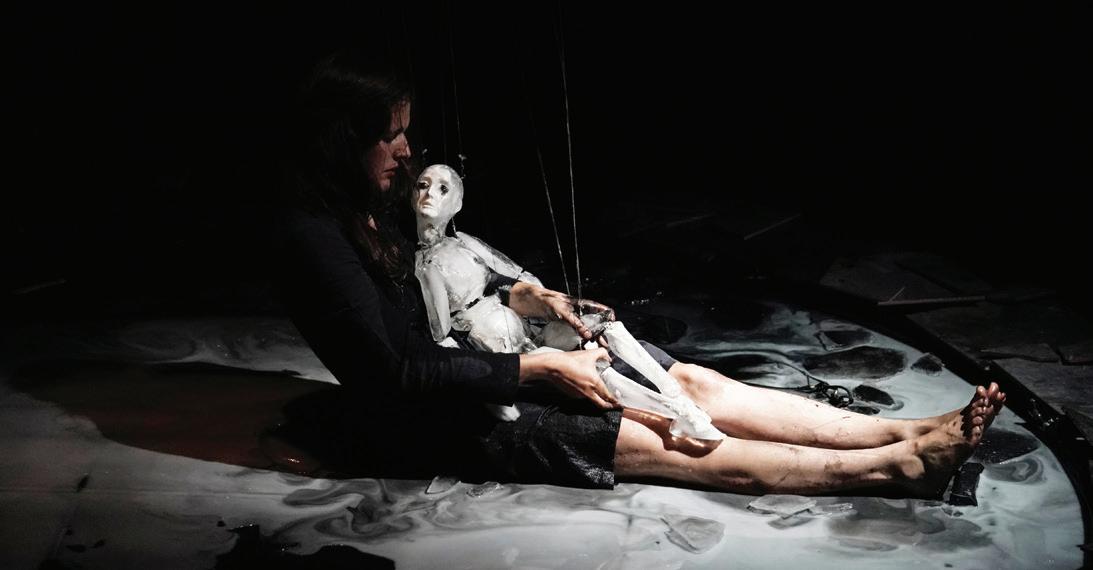 By KIMZYN CAMPBELL
By KIMZYN CAMPBELL
For 12 days this month, Chicago will be home to fantastical puppets and artists from Brazil, Canada, Czech Republic, Finland, France, Norway, Japan, South Africa, Spain, and the United States. The shows in the Chicago International Puppet Theater Festival (now in its fifth year) cover a diverse range of topics, from reimagining classic myths and literature, to exploring comedic tempo with squirrels, to delving into the humanity around the geopolitical crisis of refugees.
In addition to shows at multiple venues around town, the festival is introducing a Pop-Up Puppet Hub in the Fine Arts Building on Michigan Avenue with site-specific events throughout the festival. The Puppet Hub will feature a film screening, exhibitions, and a puppet-inspired cafe, as well as performances at the in-house Studebaker Theater.
Those not familiar with contemporary puppetry might wonder how the humble puppet has become such an enduring art form (and
such a force in Chicago). As droves of puppets descend upon us in midwinter, it is a good time to note that Chicago is well-established as a center of puppet influence in the U.S. With decades of puppet-mongering history behind us, from the grassroots Puppet Guild, to the sadly defunct but hugely influential Redmoon Theater, and onward (the festival’s in-house Puppet Studio, Rootstock Puppet Company, Rough House Theater, and Manual Cinema, to name a few), the city has been fostering puppeteers and puppet designers for years, who have cross-pollinated heavily with the circus and theater communities.
Puppet festival founder/artistic director Blair Thomas has been an influence for many of the aforementioned companies and a mentor to scores of artists. He shares some insight with me about Chicago’s place in the puppet world.
“We have a lot of activity in town . . . We have the most alive and active international
puppet theater festival going on in North America. The intensity of programming that happens, you’re not going to find anywhere else in the U.S., but we’re outdone by the funding resources that have existed in other countries for years.” Putting the struggle to find robust funding sources like Europe’s aside, he is happy to discuss Chicago’s impact on the U.S. puppet arts universe, citing the success of Chicago-based Manual Cinema. “They have really skyrocketed into the performing arts world, and they have multiple companies out touring their shows around the country and abroad.”
Nevertheless, many people still have misconceptions about puppetry. They often assume puppet shows are simply for children, or that the medium will be tiny marionettes, or the stage will be small-scale. They picture street art or improvised Punch & Judy shows. Yet there is a rich arts exchange happening worldwide, from the puppetry of cultural
heritages to contemporary and avant-garde approaches that break down Western stereotypes and build on puppetry origins in astounding ways.
This festival is a testament to that, with puppets made of ice, human bodies as stages, the layered universe of shadow puppets, masked humans, full-sized puppets with astounding articulation, and underwater puppets that emit pure poetic motion. Endless methods and genres are being innovated and manipulated in cinematic ways onstage, making it a very exciting art form to witness.
Thomas describes the festival’s mission to supply the charms of this modern art form, and his theories on why it resonates so well in a town known to be an arts incubator. “I think it is just a matter of exposing them to what is happening in contemporary puppetry. Anyone who has not seen any contemporary puppetry will be shocked by what they see because the work is so visual with such a dynamic quality.” He adds, “You’re used to being oversaturated with visual information in the media. But in the performing arts, puppetry does it in a way that’s astounding and immediate.”
Highlighting the impossible Thomas had 17 examples of how visually impactful puppetry can be to our media-soaked minds (aligning exactly with the amount of shows in the festival this year), but I pressed him to select just one for the article. He chose “a startling piece by Livsmedlet from Finland called Invisible Lands . It uses hardly any spoken word at all, and less-than-inch-tall figurines that represent people who are being forced to migrate out of their country under duress. The two performers use their body as the landscape that depicts this narrative that plays out, and [use] little cameras to magnify what’s happening. It’s a very intimate piece that’s really unlike anything else.” Invisible Lands plays at the Chopin Theater January 19-22.
Further festival highlights include the aforementioned ice puppet in the show Anywhere by Théâtre de L’Entrouvert (also at the Chopin January 19-22). Élise Vigneron, creator of both the theater and the show, describes how Anywhere came to be a collaborative project with two local creators. “As puppeteers, we were motivated by a common question: ‘How can puppet theater contribute? How can two
JANUARY 12, 2023 - CHICAGO READER 35
THEATER
Théâtre de L’Entrouvert presents Anywhere in the Chicago International Puppet Theater Festival. CHUNG YOUSUK
GLOBAL APPEAL
CHICAGO INTERNATIONAL PUPPET THEATER FESTIVAL
1/
see chicagopuppetfest.org for complete schedule and ticketing information.
THEATER
continued from p. 35
artists who wish to transform practices and rethink how shows tour the world make a collaboration that has as its core cooperation and environmental issues?’ From this was born the idea of transmission of Anywhere to a company of Chicago artists who could tour North America.” She adds, “It is the same show but staged with a new generation of artists. With this transmission we hope for transformation . . . of collaboration, artistic research and discovery shared, artists learning from other artists, and a way for international work to be more readily seen by audiences in North America.”
One of those local collaborators in Anywhere is Ashwaty Chennat, a movement artist and educator whose interdisciplinary and cultural exchange work sows seeds for empathy-building experiences. Chennat describes the experience of working with fellow local artist Mark Blashford. “Teams are everything, especially when everyone is experiencing something new. I am so grateful to have a group of curious, joyful, and playful artists to work with for this process. Seeing Mark at work has helped me understand the presence of dance within puppetry—in many ways puppetry requires more coordination than dance!”
Director/creator Vigneron describes the visceral impact of watching an ice puppet evaporate throughout the 50-minute work, inspired by Henry Bauchau’s novel Oedipus on the Road. “In front of this melting character we physically feel its metamorphosis . . . If there is a message that appeals to me with this show it is that, like matter and nature, our existence is constantly evolving.” She describes the long system of pulleys developed to carry the heavy ice puppet as being reminiscent of her childhood passion for the circus trapeze.
Blashford, who founded Rootstock in Chicago and now lives in Reykjavík, specializes in marionette, rod, and hand puppetry. Blashford says the process of meeting in France to work on Anywhere was a helpful one, because it “a orded us the time and space to develop our onstage chemistry and o stage friendship, a vital component in the process of interpreting and transmitting the work.” He is thrilled to be returning home for the festival to present this work, saying, “As a string puppeteer, I cannot wait to share this innovative performance technique with Chicago and North America. It is a challenge to make a new puppet every night, but the storytelling is exquisite.”
Another show of note in the Festival is Macunaíma Gourmet from Pigmalião Escultura
que Mexe, which explores themes from the popular Brazilian novel Macunaíma by Mário de Andrade. Using life-sized puppets and fantastical masked mythological creatures, codirector Eduardo Felix says the work is rooted in political and cultural meanings, something that gives him pride as a Brazilian. “This masterpiece of modern literature in Brazil was the result of a very large and rich collection of habits, folklore, and popular culture that helped build Brazil’s image of itself.”
Felix describes why the puppet is such a powerful tool for artistic and political metaphor.
“The puppet, because it is a fake being, is free and licensed to talk about certain subjects or perform certain actions that would not look good on human actors.” Felix explains how the novel’s complex themes motivated his and other renditions of it in the arts world. “It is a very controversial work, because at the same time that we can recognize ourselves in some way in that antihero, we also feel o ended by the harshness of certain stereotypes shown there, and this is what most provoked us and led us in the creation of work.”
He adds, “Our show was created in order to provoke in the public the reflection on what it is to be consumed by the market, which uses advertising to make us think that we are special if we inconsequentially consume certain products . . . We are Brazilians and we speak from our own perspective, but I think that these issues are not only ours, they are global, with agents and victims both in Belo Horizonte, as in Chicago, or Paris, or Dubai.”
Growing forward
The festival has grown at just the right moment, harnessing a pandemic-weary thirst for novelty, the millennial urge for artistic diversity, and a growing appreciation for contemporary art forms, which all contributed to its expansion. According to Thomas, this growth means not just a longer festival with more shows and artists, but also more workshops and opportunities for artists to learn and collaborate, as well as more opportunities for curious audiences from Hyde Park to Wicker Park to explore.
“There has been a very positive response to the festival by the Chicago audiences. I’m really looking for it to be a regular fixture in our landscape culturally each year so that audiences can start to see the breadth of work that’s happening with puppetry.” v
36 CHICAGO READER - JANUARY 12, 2023 ll
@KimzynCampbell Let’s Play! Make time to learn something new with music and dance classes at Old Town School! We offer flexible schedules for all skill levels both in-person and online. oldtownschool.org Sign up for classes today at MUSIC CLASSES FOR ADULTS & KIDS LINCOLN SQUARE LINCOLN PARK SOUTH LOOP & ONLINE OTS_1_2V_ClassAd_072921.indd 1 7/23/21 2:21 PM
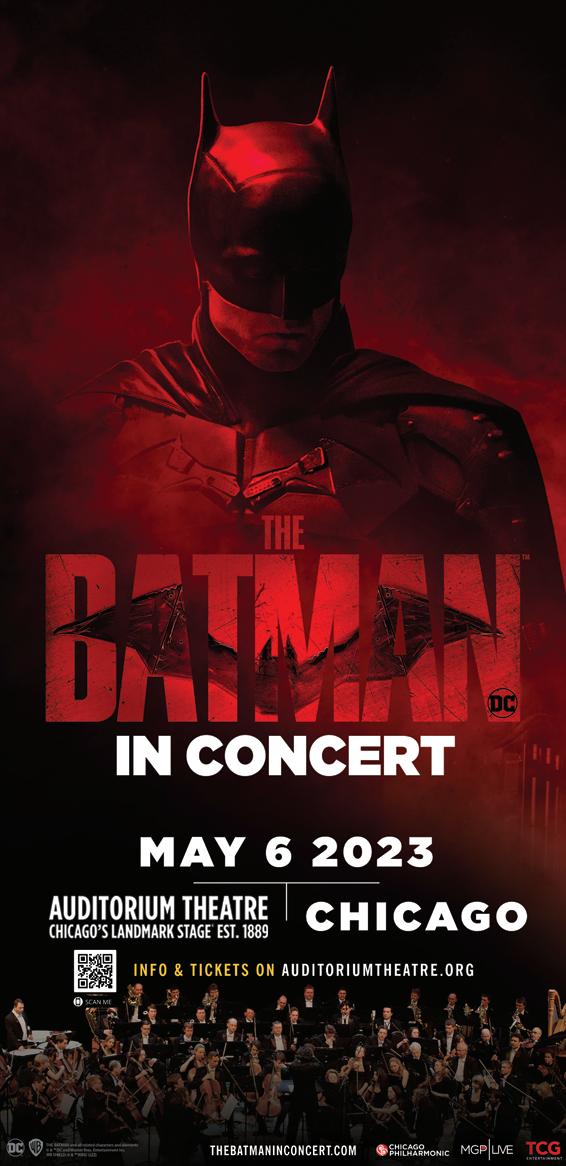


JANUARY 12, 2023 - CHICAGO READER 37
AuditoriumTheatre.org 312.341.2300 THIS WEEKEND! JANUARY 14 2022–23 SERIES SPONSORS Florian Fund Global and Chicago Dance 2022–23 SEASON SPONSORS O cial Hotel Partner Student Matinee Denise Littlefield Sobel
Photo by Sekou Luke.
THEATER
FESTIVAL PREVIEW
Collected stories
of Solo comes back live at Lifeline.
By KERRY REID
When Sharon Evans started producing solo work at Live Bait Theater in the late 1980s, storytelling hadn’t yet become a cottage industry in Chicago. “At that time it was a very unusual thing to do,” Evans says. “I remember being told that no one would pay to see a solo performer on an extended run.”

The first solo performer Live Bait presented in such a run was the late James Grigsby, whose 1988 show Terminal Madness (an absurdist meditation on the two-dimensionality of American culture) inaugurated the company’s North Clark Street venue (now the home of Otherworld Theatre). But Evans kept plugging away, and the work Live Bait produced in the late 1980s and early 90s by performers like Marcia Wilkie, David Kodeski, Cheryl Trykv, and Edward Thomas-Herrera found critical acclaim and audiences alike, helping foster the explosion of solo work and storytelling events
to come.
Some of the stories at Live Bait were deeply autobiographical, albeit with a comic lens. Others found performers playing a variety of roles, not unlike Whoopi Goldberg’s mid-80s solo work or Jane Wagner and Lily Tomlin’s The Search for Signs of Intelligent Life in the Universe. Kodeski specialized in found texts, breathing life into journals of ordinary people he found languishing on junk shop shelves. As the scene kept growing, Evans started producing the annual Fillet of Solo Festival in 1995, featuring a revolving lineup of the best monologuists in the city.
Evans helped change the landscape for solo work in other ways. “I also did convince the Je Committee after years to have a Je Award for solo performance,” notes Evans.
“For a long time they just said, ‘Well, that’s performance art.’ Not real theater, it’s performance art. Because a lot of it was done in the
Fillet of Solo Festival
1/ 13 -1/22 : Fri 7 PM and 8: 30 PM, Sat 1 PM, 2: 30 PM, 4 PM, 5: 30 PM, 7 PM, and 8: 30 PM, Sun 1 PM, 2: 30 PM, 4 PM, 5: 30 PM, and 7 PM; performances at Lifeline Theatre, 6912 N. Glenwood, and South of the Border, 1416 W. Morse, 773 -761- 4477, lifelinetheatre.com, $12 single ticket, $ 60 festival pass
Dorothy Milne (le ); Nestor Gomez COURTESY THE ARTISTS
to be anything like you, and then having that story resonate with its core human values is the super powerful thing about this form.”
galleries. And then little by little over time, there were so many people doing solo shows that they could see that, yes indeed, this is a category that needs to be addressed.”
Live Bait stopped producing the festival in 2008 and closed up shop as a regular producing company in 2009—except for Fillet of Solo, which they coproduced starting in 2010 with Lifeline Theatre in Rogers Park. Lifeline’s then-artistic director, Dorothy Milne, had been performing at Fillet of Solo with the women’s storytelling collective the Sweat Girls, and, like Evans, she didn’t want to see the festival dead in the water.
Lifeline took over full control of the festival (with Evans’s blessings) a few years later. The last two years, the company went virtual in light of the COVID-19 pandemic. But they’re back live starting Friday with a lineup of 18 solo performers (including vets like Jimmy Carrane, R.C. Riley, and Connie Shirakawa, whose latest piece is directed by Evans). There are also performances by a dozen storytelling collectives, including the Sweat Girls, Tekki Lomnicki’s Tellin’ Tales (the company’s mission is “to shatter barriers between the disabled and non-disabled worlds through the transformative power of personal story”), and 80 Minutes Around the World, the collective created by Nestor Gomez and focused on stories by and about immigrants. They’re also adding a venue in addition to Lifeline’s Glenwood Avenue home; some of the shows are at South of the Border restaurant on Morse Avenue.
Milne is happy that they’re live again, but she also notes, “There were some great benefits to doing it virtually the last couple years. We got to work with artists who have moved away from Chicago. Literally from across the nation and across the globe we had participants, which is what you can do virtually. And then people were also able to see it across the globe.”
But, she adds, “Storytelling is direct out to the audience and responding to the audience and responding to what’s happening between you. And that was a really challenging thing for the last two years. Being in the room together and hearing a story from someone you don’t know and someone who doesn’t seem
For Gomez, who was born in Guatemala, the stories of 80 Minutes Around the World are even more vital given the rise in xenophobia in the U.S. during the Trump years. Even if the artists in the collective aren’t consciously aiming to be political, Gomez notes, “Our stories are usually political because, as a person of color, you cannot help . . . being political. I’ve been told here in Chicago to go back to where I came from. It’s going to a store, it’s walking on the street. I have been told to speak English because this is America. So things that happen to us are political because a lot of things happen to us just because we are immigrants.”

The inclusion of the collectives not only gives more performers a chance in the spotlight (particularly performers who may not have worked up to a full-length evening or who simply prefer the short-form monologue). The collectives provide, as Milne says, “an advertisement for what’s going on year-round in the city. We have such a profound amount of storytelling going on in Chicago and have for the last—I mean, the form is as old as the hills, but for the last 20, 30 years, there’s been huge growth in the scene in Chicago and nationally as well.”
One of the groups Milne is excited about is GeNarrations, a collective created out of an ongoing storytelling workshop for adults 55+ at the Goodman. “They’re doing three shows and there are seven or eight performers in each of those shows. Many of them are new to the form.”
It makes sense that so many of the collectives around town and featured at Fillet of Solo are focused on communities that are often marginalized, such as the disabled, older people, and immigrants. For people who are also economically marginalized, storytelling o ers low financial barriers to participation. But getting work from the page to the stage does often require some encouragement and coaching for those new to the form. And what that often means is aiming for the heart.
“I don’t come to the story as if I’m writing an essay or I’m writing something that’s going to be published in the New York Times,” says Gomez. “So I tell them to write a story as if they’re having a conversation with a couple of friends. The only di erence is the conversation that they’ll have at the end is gonna be with a larger group of friends.” v
@kerryreid
38 CHICAGO READER - JANUARY 12, 2023 ll
Fillet
FILM SOCIETY
Chicago’s 90-year-old film treasure
By S. NICOLE LANE
The nation’s oldest and longest-running college film society is located right under our noses on Chicago’s south side at the University of Chicago. In 1932, a group of film buffs living in International House—a nine-story Gothic building—began screening films in the dorm.
In 1940, they would move into Cobb Hall, which had a more traditional theater, where they gained their name “Doc” based on the films they were showing—“documentaries.”
As time moved on, the group expanded their screenings to fiction and experimental films, something still popular within the club today. Now, during every night of the academic year, Doc Films screens movies at the Max Palevsky Cinema in Ida Noyes Hall on 59th Street. In October, Doc celebrated 90 years as a film society.
Throughout Doc’s history, Alfred Hitchcock, Woody Allen, John Ford, and many others visited to present films and lead discussions
with the audience. Doc is responsible for the Chicago premieres of The Rules of the Game (1939) and Brokeback Mountain (2005).
Cameron Poe, 21, is a fourth-year senior majoring in physics at the University of Chicago. He’s also the Doc Films general chair and has been a part of the film society for over a year.
In the winter of 2020, he worked one shift as a ticket seller, but then COVID-19 arrived and all in-person activities were suspended. After a year of remote classes, Poe decided that Doc would be his reason to leave his apartment, and he joined as a member of the board.
“Doc happened to fit nicely into my newfound love for my Criterion Channel subscription,” he says.
Many former Doc volunteers have continued to be involved in film in some capacity. For example, Gordon Quinn and Gerald Temaner, cofounders of Kartemquin Films, and Ernest Callenbach, founding editor of Film Quarterly, are among the impressive list of Doc alumni.
A 2004 Vanity Fair article said Doc was a
society “populated by 19-year-olds who have already seen every film ever made,” but this isn’t to say Doc is snobby or exclusive. In fact, locals are welcome to volunteer and participate in programming, projecting, ticket sales, fireguard, show captain, etc. The film society is entirely run by volunteers.
Each quarter, Doc gets new proposals from volunteers and the wider Chicago community, suggesting what the calendar should look like.
Poe explains, “Each person or group of people proposes a series of nine films that will play on a specific day and time each week for our nine-week academic quarters. Series can cover a common narrative theme, highlight the works of one director or actor, or link something else entirely. One series I’m excited about next quarter is called ‘Blow Up My Video,’ which consists of films [that were] shot on digital cameras but were originally distributed and shown on celluloid.”
But this wasn’t always how Doc programmed. Poe notes, “Back in the 70s, films were only programmed by two or three members that sat on the board.”

Themes have ranged from “Silent Films” to “Sexy Doc,” the latter featuring a screening of Shrek (2001). The tongue-in-cheek humor behind the Doc Programming Committee is exemplified through these weekly themes— and is one of the reasons the society is adored by locals. It alleviates some of the stu ness behind a UChicago club. In the same theater where you can watch Ancestors in the Americas, Part 1 (2001) and The Chinese Exclusion Act (2017), you can watch new releases like Top Gun: Maverick
Films screened at Doc come from Janus or Universal, but they also project films from the Academy Film Archive or the Library of Congress. Poe says, “Doc also owns its own collection of 35mm and 16mm prints, and we were lucky to have a print for Orson Welles’s Chimes at Midnight [1965] that we got to show this quarter.”
Doc’s budget for screening films comes from the university’s budget, ticket sales, and the occasional partnership or sponsorship.
Poe says, “One of the things I’m most proud of at Doc is we’ve been able to grow to include more of our patrons in our programming model while also expanding the type of films we actually show. We almost never show the same film twice in four years, in an e ort to diversify the typical undergraduate’s film taste, so this means we show about 1,000 di erent movies over four years. I don’t know any other cinema that does programming like ours.”
Attending a Doc film is like attending any other theater, except before the screening begins, a volunteer stands at the front and calls out rules during the screening. No eating, drinking, chatting, etc. Every volunteer has their own cadence—some shout loudly with confidence while others get to the point while appearing shyly in front of a large crowd.
Another unique addition to a Doc film is the occasional projection mishap. The cinema where Doc shows its films includes two Simplex 35mm projectors, an Eastman 25 16mm projector, and a HIGHlite 8000Dsx+. When screening celluloid, things can easily go wrong, and sometimes, in true Doc fashion, a film will be paused for a moment or two. The lights will turn on, the crowd will chat, and then before you know it, the projection picks up again. (Usually, a Doc crowd will clap and cheer, never missing a beat.)
Poe explains that “celluloid, due to its scarcity and fragility, necessitates someone inspecting each inch of footage, doing each changeover, and checking all of our audio levels.”
This means that a real person has to be in the projection booth the entire time. “Most commercial cinemas now just have a computer do all the work, from lowering the lights, setting the masking, and starting the show. The effect I think is a more personal experience. For example, we adjust the volume in the cinema to how many people are there or how balanced the audio we receive is. This is the way that movies have historically been shown, so not only are we showing films on 16mm or 35mm, which in this day and age are e ectively museum artifacts, but we are transforming the cinema itself into a sort of museum that preserves and chronicles the act of moviegoing. That e ect is really special to us, and we think it’s important to bring to a primarily student audience.”
In addition to their care for the films, Doc is one of the only theaters on the south side showing films of this reverence. Tickets are also some of the cheapest in the city—$7 for a single pass. Quarterly passes are $40 for more than 40 films.
The flicker of the celluloid and the preservation of watching films is something so rich and unique at Doc. It isn’t your everyday club—it’s the inclusion of human touch and the dedication of a group of students who value cinema enough to sustain a long-lasting community of movie lovers. v
JANUARY 12, 2023 - CHICAGO READER 39 FILM
@snicolelane
fi
A variety of
lm strips on a light table DOC FILMS
How the oldest film society in the nation still celebrates with both celluloid and new releases
FILMS AT THE UNIVERSITY OF CHICAGO
in Ida Noyes
1212 E. 59 th St. docfilms.org
DOC
Max Palevsky Cinema
Hall,
MAGAZINE
A more representative call sheet
From the founders of Cinema Femme and Camera Ambassador, The Call Sheet is a new magazine elevating marginalized voices in the film industry.
By ALANI VARGAS
Despite the increased spotlight on marginalized voices in the ever-evolving film landscape, criticism doesn’t particularly reflect that. The majority of film critics still tend to be straight, white males, unrepresentative of the world around them. The Call Sheet is a new magazine that aims to disrupt that.
“The gist of it is . . . to elevate emerging artists and films that aren’t necessarily really represented enough, like women, nonbinary [people], women of color,” cofounder Rebecca Martin Fagerholm says.

But even more than that, cofounder Erica Duffy says The Call Sheet —comprising articles, interviews, and essays—uses those writers and stories to highlight the current state of filmmaking. “Our [in]formal kind of tagline has been, ‘This magazine will take you behind the scenes of the filmmakers of today,’” she says.
Martin Fagerholm, a film journalist and film festival director, founded Cinema Femme, a magazine for women to write about film, in 2018.

“I was just tired of middle-aged white men’s voices being elevated about cinema,” she says. “I was like, ‘You know what? We need more female voices out there.’”
This throughline for Martin Fagerholm struck a chord with Du y, founder and CEO of Camera Ambassador. Camera Ambassador is a local equipment rental house that provides production rentals ranging from tape and cameras to lights and other on-set needs. It’s one of three rental houses in America owned by women. Once Duffy came across Martin Fagerholm’s weekly newsletter in 2020 and found out she was also based in Chicago, they connected, and the two held regular conversations, or an “informal brain trust,” as Du y described it. This is where the idea for The Call Sheet—named after the sheets found on movie sets, dictating each actor’s shooting assignments—first emerged.
“When Rebecca mentioned it, I kind of had this lightbulb moment,” she says, noting that team members at Camera Ambassador have wanted to create a magazine for a while, but Du y didn’t know where to start. “I saw both
Launching 1/ 19 at 7 PM with a free party at Camera Ambassador, 2425 W. 14th St. Unit B cinemafemme.com cameraambassador.com
“I think when you can sit down with the magazine in the comfort of your own home, there’s a place of vulnerability with you in those words, and that will be something that people really gravitate to,” she says.
of our strengths and the strength of our companies, as well [as] in our audience, and that if we came together to do a collaboration like we are with The Call Sheet, that it would just be these worlds colliding and like a beautiful collaboration and playing to everybody’s strengths.”
Despite the rarity of women-owned businesses like Camera Ambassador, Du y wants to emphasize that it’s not an “abnormal thing,” even though the numbers are “still grossly weighed one way.” In the same way, The Call Sheet strives not only to focus on underrepresented voices in film, but to also normalize them and “slowly [change] that narrative that this is the modern filmmaker. [These are] important stories and important voices in the industry now.”
It’s important for The Call Sheet to feature filmmakers who don’t subscribe to the older, mainstream, white male gaze. The founders also want to create a space that isn’t just for the groups they tell stories about. Martin Fagerholm points to Barry Jenkins’s 2016 film Moonlight, which won the Academy Award for Best Picture, among many other accolades. The film creates such empathy and emotion that it can get any filmgoer to feel something deep, even if you’re not a queer Black boy in Miami. Martin Fagerholm wants to focus on films that do this same thing, giving “authentic, universal stories” and having marginalized writers touch on them.
Martin Fagerholm and Duffy hope that featuring underrepresented writers and films will be a draw for others who are hungry to see and create their own stories one day. But that, of course, doesn’t mean that The Call Sheet is only for one demographic.
“I think this magazine is for everybody,” Du y shares. “The way that the storytelling is done and the way that the magazine has been designed, it’s an enjoyable read . . . no matter who you are, where you’re from, what background you are.” The word “authentic” comes up a lot between Martin Fagerholm and Du y when discussing the overall mood of The Call Sheet because they believe the authenticity of those writing for The Call Sheet and the stories they’re covering generates criticism about art that is real and matters.
The very first issue debuts on January 19 in both print and digital form, locations TBA. Both Camera Ambassador and Cinema Femme released the cover art for The Call Sheet ’s inaugural issue to Instagram, following the issue’s theme of “Healing Through Your Art.”
“Our cover story is on Emma Thatcher— she’s a Chicago filmmaker,” Martin Fagerholm shares. On December 23, 2022, Camera Ambassador shared a sneak peek of that cover story as well, including several photos from Thatcher’s first feature film, Provo. The interviews that went into making this cover story really helped inspire the rest of the issue and the theme. “Our other pieces are kind of like offshoots of that,” Martin Fagerholm says. “Di erent projects and di erent voices talking about healing through your art.”
The first issue features all Chicago-based filmmakers, which was by accident and isn’t “necessarily the future” of The Call Sheet, according to Du y. But organically searching for filmmakers who represent the current state of film and are creating the most authentic art right now, and finding them all in Chicago, surely says something about the film scene in the Windy City. At the end of the day, they were searching for “timely, fresh voices, bringing up important things,” and Chicago-based filmmakers took the forefront of the project.
The Call Sheet editorial team consists of Martin Fagerholm as editor in chief, Du y as publisher, Rey Tang as assistant editor, Matt Carroll as circulation director, and Connor Smith as art director. Duffy says that the reception has already been so positive and far-reaching from the community, which poses a great opportunity for the future. Plus, Martin Fagerholm and Duffy’s respective teams have blended exceptionally well for this joint endeavor. With the ease of working together and the exciting possibility of more support, “there’s definitely a future,” Du y says.
Martin Fagerholm’s Cinema Femme has been a really good basis to center The Call Sheet’s purpose around, and both projects aim to disrupt the status quo.
“We’re breaking down the walls,” Martin Fagerholm says. “We’re redesigning [the industry], and we’re showing a world that’s possible, which is exciting.” v
@alanimv
40 CHICAGO READER - JANUARY 12, 2023 ll FILM
Erica Duff y of Camera Ambassador (le ) and Rebecca Martin Fagerholm of Cinema Femme COURTESY REBECCA MARTIN FAGERHOLM
THE CALL SHEET



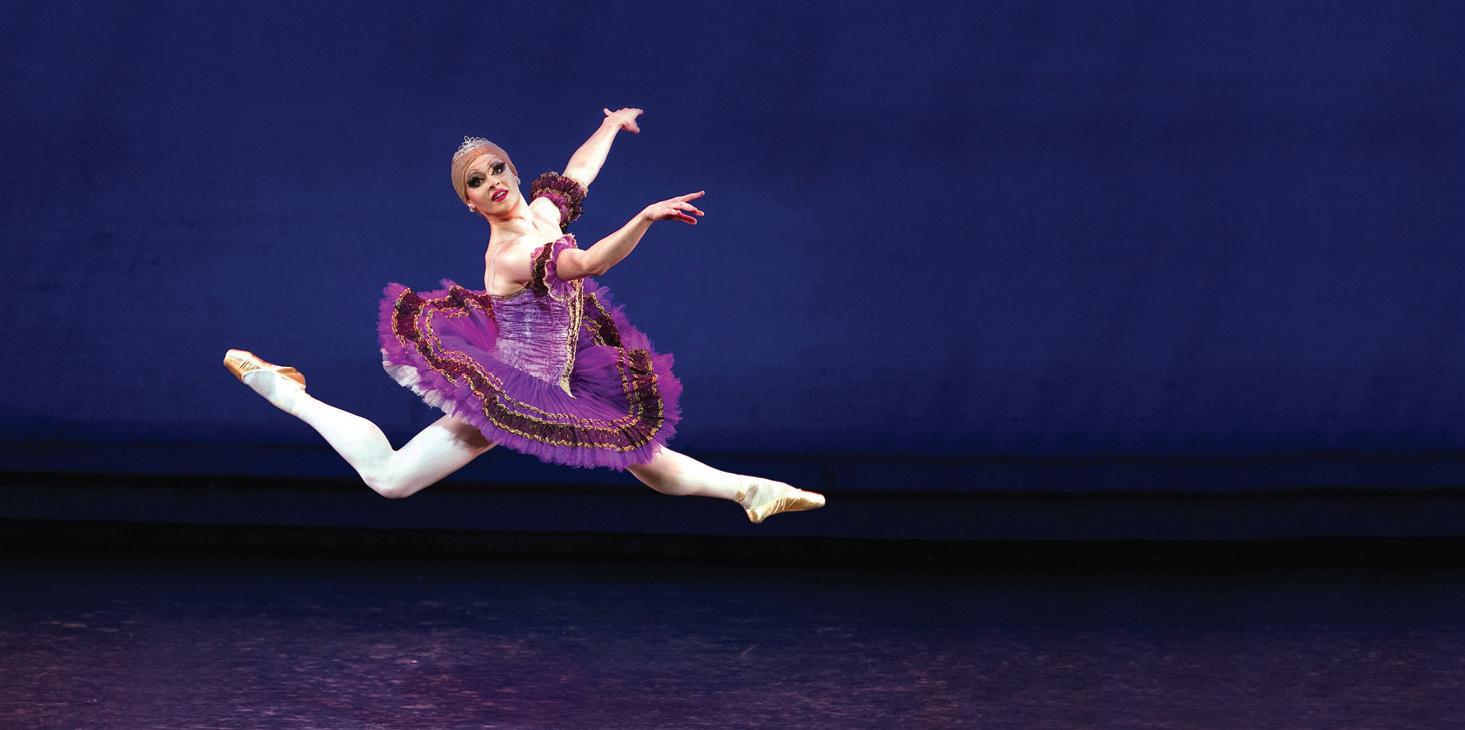


















JANUARY 12, 2023 - CHICAGO READER 41 SettleIn Ticketsincludebottomlesspopcorn,coffee,andintermissions “The funniest night you’ll ever have at the ballet!” — The Guardian FEBRUARY 11 TICKETS START AT $30 AuditoriumTheatre.org | 312.341.2300
Marcello-Orselli. 2022–23 SEASON SPONSORS O cial Hotel Partner 2022–23 SERIES SPONSOR Florian Fund Global and Chicago Dance LES BALLET TROCKADERO Presenting Sponsor Denise Littlefield Sobel SOMETHING READER FOR EVERYONE! store.chicagoreader.com
Photo by
NOW PLAYING
R Living
Mr. Williams, played by Bill Nighy, is a brooding, austere bureaucrat reduced by countless days of quotidian office work, hollowed by midcentury, postwar London. He moves with a gentle melancholy that’s undoubtedly signaling an inner pain bubbling slightly beneath the surface. The lonely widower lives quietly with his son and his son’s wife, played by Barney Fishwick and Patsy Ferran, respectively. The film is solemn, moving steadily until Mr. Williams leaves work uncharacteristically for a doctor’s appointment—and, to disrupt his cyclical life, is given only months to live. Confronted by the end of his life, Mr. Williams grapples with his legacy, the potential of redemption, and a revived vigor to live with purpose for the time that remains. He finds inspiration in young, hopeful Margaret, an employee who nicknamed him Mr. Zombie, played wonderfully by Aimee Lou Wood.

Mr. Williams abandons his office, embarking on a brief (but undignified) quest for debauchery with a disreputable writer, played by Tom Burke. However, Mr. Williams is infatuated platonically with Margaret, who quits her office job to experience something new. Mr. Williams pivots from existential debauchery to a small but impactful purpose: ensuring the construction of a playground abandoned to static bureaucracy. In this, Living rejects the futile and instead proposes that there is meaning to being alive hidden in small things.
Living is the remake of Akira Kurosawa’s 1952 film, Ikiru, but director Oliver Hermanus and novelist Kazuo Ishiguro managed to gracefully reimagine this sentimental film. Despite falling short of the poignancy and subtlety of Ikiru, Living delivers a beautiful glance at an attempt to live—even when life is terminal. Retold in London instead of Tokyo, Hermanus and Ishiguro parallel Ikiru envisioning a story playing out side by side, positioned halfway across the world. Without Nighy’s refined performance as Mr. Williams, Living’s lasting impact would be fleeting, but his embodiment of revival, despite incurable limitations, gives this film an unlikely
opening to redemption. —MAXWELL RABB PG-13, 102 min. Limited release in theaters
R M3GAN
Few trailers from the past year have inspired as much anticipation in me as M3GAN’s did. Finally, I thought, a movie that answers the question on all our minds: what if Chucky was a girl boss? Imagined and written by the screenwriter and producer of Malignant, Akela Cooper and James Wan, respectively, it’s hard not to wonder if they’ve let the instant midnight movie canonization of their last collaboration go to their heads. Whereas Malignant was something genuinely weird and audacious that earned its word-of-mouth reputation, there’s nothing organic about the way M3GAN is precision engineered to achieve cult classic status, from the wink-nudge hamminess of supporting actors Ronny Chieng and Lori Dungey to the broad jokes with a 50/50 hit rate. And yet, in spite of its obvious shortcomings, when that little lady finally started going postal, I found myself struggling not to start hooting and hollering in the theater. The movie fully lives up to the promise of its ridiculous trailer whenever our star is indulging her hard-PG-13 homicidal instincts or performing vaguely threatening TikTok dances toward her enemies. This won’t pop up on any top ten lists by the end of the year, but for a genre film released in a month typically reserved as a dumping ground for studios, this is all you could hope for. I wouldn’t say no to two or three sequels (MEG4N? Or maybe a James Cameron Aliens route with M3GANS?) that take this premise to even greater extremes. What if we sent M3GAN to space? What would it look like if she took Manhattan? —JOEY SHAPIRO PG-13, 102 min. Wide release in theaters
A Man Called Otto
It feels wrong to root for a suicide attempt to succeed. Otto Anderson tries via rope, gas, train, and rifle and fails each time. Since his beloved wife, Sonia, died from cancer six months back, Otto feels no reason to keep living. When not trying to off himself, he spends his
days flying off the handle at neighbors who don’t follow his myriad but inchoate rules of decorum. Everyone’s an idiot, and nothing’s like it used to be. But what is this golden-hued past Otto longs to return to?
We’re forced to relive his glory days through copious flashbacks, but what’s clear to me, just as in every present-day scene, is that Otto is an emotionally stunted, possibly autistic man tolerated by loved ones and coworkers until they die or can no longer bear him. When a young family moves in across the street, Otto is distracted from his preparations for the a erlife and convinced via Hallmark-card-level emotional trickery to stick around. The movie is cringeworthy when not outright offensive in its broad-strokes handling of everything from aging to gentrification to racism to gender issues. It’s as if the filmmakers did a keyword search for hot-button cultural topics and sprinkled them in pellmell without bothering to read past the bullet points.
I haven’t read the 2012 Swedish book or 2015 film that this is based on, but I can’t imagine either could be half as tone-deaf. Otto’s bloviating about the past is a close cousin to chants of “You will not replace us,” no matter the crudely applied multicultural makeover. Tom Hanks has practically trademarked likability, but his Otto is not only loathsome but wholly unbelievable. To begin with, no one with an engineering degree would ever fail to get a noose to work. —DMITRY SAMAROV PG-13, 126 min. Wide release in theaters
RThe Pale Blue Eye
Edgar Allan Poe’s decadently cerebral approach to genre is an odd fit for Hollywood, which tends to tear into its pulp pleasures with a hearty trencherman’s aplomb, rather than sipping them delicately from paperthin china. Sure enough, Scott Cooper’s The Pale Blue Eye is not very Poe-like, even if it features the poet as a character. Agatha Christie, with her twisty plots and straightforward examination of human evil, is a clearer literary antecedent than Poe’s layers of irony, intellectual play, and sensual embrace of the bizarre.
This isn’t exactly a criticism; Agatha Christie is also great, and this is a skillful variation on some of her most treasured tricks. A cadet is murdered at West Point, his heart cut from his corpse. A gruff detective with a painful past, Augustus Landor (Christian Bale) is called in to help with the investigation. He enlists cadet Poe (Harry Melling) to help him gather information from the other trainees. Their investigations lead them to a mysterious circle of devil worshippers, perhaps connected to the family of Dr. Daniel Marquis (Toby Jones). Daniel’s son Artemus (Harry Lawtey) is a cadet. His daughter Lea (Lucy Boynton) is an accomplished pianist and an epileptic; she and Poe inevitably and instantly fall for each other.
Melling, all long fingers and penetrating stares, is
Find new film reviews every week at chicagoreader.com/movies
a fine Poe, and the movie is littered with references to the writer’s work. We get a close-up of a raven, the poem “Lenore” is connected to Lea, and Landor lives in a cottage, per Poe’s story “Landor’s Cottage.”
These are all surface trifles, though. The center of the film is Bale’s performance—a frozen surface which cracks open to reveal icy, rushing depths—and the cold New York landscape, with swirls of snow and bare tree limbs against the stark sky. The Pale Blue Eye sees, in the end, with clarity; it is a movie about revealing and understanding hard truths. It’s a fine Hollywood film. But Poe’s mysteries aren’t so easy to pin down. —NOAH BERLATSKY R, 128 min. Netflix
R Turn Every Page: The Adventures of Robert Caro and Robert Gottlieb
This engrossing 2022 documentary chronicles the 50-year-and-counting collaboration between two literary lions: political biographer Robert Caro, who turned 87 on October 30, 2022, and his editor, Robert Gottlieb, who turned 91 on April 29, 2022. The dynamic duo first teamed up for the Pulitzer Prize-winning 1974 bestseller The Power Broker: Robert Moses and the Fall of New York; at the time this film was shot, they were working on the fi h and final volume of Caro’s epic The Years of Lyndon Johnson, still unfinished at the time of the movie’s release. (Gottlieb’s track record as an editor also includes such novels as Joseph Heller’s Catch-22, Toni Morrison’s Beloved, and Michael Crichton’s Jurassic Park, as well as nonfiction landmarks like Bruno Bettelheim’s The Uses of Enchantment and Jessica Mitford’s The American Way of Death.)
The running theme in the Caro/Gottlieb canon—the uses and abuses of power in politics—seems especially urgent now, in a time when so many people feel disenfranchised in, and disengaged from, the American democratic system. To write about the controversial and complex careers of New York City public works czar Robert Moses and U.S. president Lyndon Johnson, Caro interviewed thousands of people and—with his wife and sole research assistant, historian Ina Caro—pored over countless documents. The movie’s title references the advice Caro says he got from his editor when he was a young investigative reporter at Long Island’s Newsday newspaper: “Turn every page. Never assume anything. Turn every goddamn page.”
Directed by Lizzie Gottlieb—the daughter of Robert Gottlieb and his wife, actress Maria Tucci—Turn Every Page focuses on the partnership involved in putting a great book to bed, ranging from what to cut and how to set up a scene to when to use—and not use—a semicolon. “The great thing about Bob is also the maddening thing about him,” Gottlieb says about Caro. “Everything is of total importance. The first chapter of the book, and a semicolon—they’re of equal importance. . . . I’m like that too. It takes one to know one.” —ALBERT WILLIAMS PG, 112 min. Limited release in theaters v
42 CHICAGO READER - JANUARY 12, 2023 ll
FILM Living SONY PICTURES CLASSICS
R READER RECOMMENDED b ALL AGES N NEW F




JANUARY 12, 2023 - CHICAGO READER 43 3 ~ 18 KELELA RAV:N TOUR 2023 1~14 SAT REBIRTH BRASS BAND 1~15 SUN LA ACADEMIA PRESENTS NUESTRA HERENCIA 1~18 WED CASS McCOMBS + BAND KOLUMBO 1~19 THU EPOCA DE ORO FT. LA PEÑA ORCHESTRA 1~22 SUN THE ROCK & ROLL PLAYHOUSE PLAYS MUSIC OF GRATEFUL DEAD 2~22 WED KIMBRA TEI SHI 3~19 SUN IBEYI SPELL 31 TOUR 2~26 SUN OTOBOKE BEAVER GANSER 3~22 WED ANDY SHAUFF KATY KIRBY 2 ~ 11 SAT DIVINO NIÑO VIDEO AGE ~ LUTALO BRENDA’S FRIEND 1~27 1~28 POI DOG PONDERING 2 ~ 2 THU ADAM MELCHOR 2 ~ 4 SAT CLAIRE ROSINKRANZ DWLLRS ~ MEHRO 2 ~ 15 THE 502s FRESH SQUEEZED HAPPINESS TOUR OLIVER HAZARD 2 ~ 17 FRI RUBBLEBUCKET SPACEFACE 2 ~ 24 2 ~ 25 THE BETHS SIDNEY GISH 3 ~ 3 FRI PEPPER JOE SAMBA 3 ~ 4 SAT DEAD ASS PODCAST KHADEEN & DEVALE ELLIS 3 ~ 17 FRI JAWNY WALLICE 3 ~ 24 3 ~ 25 NEAL FRANCIS VALEBOL ~ EMMETT KELLY 3 ~ 26 SUN THE CHURCH THE HYPNOGOGUE ALBUM TOUR 3 ~ 31 4 ~ 1 SHYGIRL NYMPH WORLD TOUR PT. 1 4 ~ 4 TUE EMMA RUTH RUNDLE PATRICK SHIROISHI 3 ~ 9 THU DONNY BENÉT NORTH AMERICA TOUR 3 ~ 10 AN EVENING WITH DAWES 3 ~ 11 SAT NEW FOUND GLORY ACOUSTIC TOUR LEANNA FIRESTONE 3 ~ 16 THU LOW TIX LOW TIX LOW TIX 1~20 1~21 THEE SACRED SOULS LARKIN POE MICHIGAN RATTLERS SOLD OUT SOLD OUT SOLD OUT SOLD OUT SOLD OUT THALIA HALL | 1807 S. ALLPORT ST. PILSEN, USA | THALIAHALLCHICAGO.COM COMING SOON TO THALIA HALL SIGN UP FOR OUR NEWSLETTER AT THALIAHALLCHICAGO.COM
MUSIC
John Primer is a living link to the departed giants of Chicago blues

The veteran guitarist and singer learned his trade from the likes of Sammy Lawhorn, Muddy Waters, and Magic Slim.
By STEVE KRAKOW
Since 2004 Plastic Crimewave (aka Steve Krakow) has used the Secret History of Chicago Music to shine a light on worthy artists with Chicago ties who’ve been forgotten, underrated, or never noticed in the first place.
It’s barely January, and already a “bomb cyclone” storm has frozen pipes, disrupted travel, and much worse, all while a “tripledemic” tears through the population. Every year the Secret History of Chicago Music undertakes its annual Winter Blues series, and every year the season seems to find new ways to give us the blues. This time I’m starting my annual look at the Windy City’s blues legacy with guitarist John Primer, one of many artists who’s well-known among blues fans (often an obsessive lot) but obscure to the general population.
The blues is enough of a niche interest these days that only the most famous local artists enjoy wide name recognition—Muddy Waters, for instance, or Buddy Guy. Primer has played in Waters’s band and led the house band at one of Guy’s clubs. He’s learned from some of the best bluesmen the city has ever produced, and he’s been crucial to keeping the Chicago tradition vital.
John Primer was born March 5, 1945, in
Camden, Mississippi, into a family of sharecroppers. His extended family shared a drafty shack on the Mansell plantation, with just a wood-burning stove for warmth. They had no running water, just a shared well a mile away, and they only had an outhouse when they could afford to have one dug. To make ends meet, everyone in the family worked—picking cotton, plowing fields—and while they worked, they often sang together. Primer’s father and an older cousin would play the blues at home at night, which gave young John his first exposure to the music. But when Primer
was four, his father—himself only 22—was killed in a truck-driving accident.
After that tragedy, Primer’s mother moved to Chicago, vowing to send for him and his sister Barbara when they turned 18. Primer had a lonely childhood, raised mostly by his grandmother and aunts. He liked to sing in the woods, and he built a one-string instrument called a diddley bow. Diddley bows are often made of baling wire stretched between two nails in a board, with a glass bottle as a bridge; Primer nailed broom wire to the boards on the side of his grandmother’s home and used a
brick as a bridge.
Soon Primer was singing at school for dimes on the playground. He also sang in church, which was an especially cathartic experience for him. His grandmother had a record player, and he fell in love with the likes of Jimmy Reed, Muddy Waters, Little Milton, Elmore James, and B.B. and Albert King. When he turned 18 in 1963, he finally followed his mother to Chicago.
Primer frequented Maxwell Street, historically a port of entry for immigrants and in those days still a mecca for salesmen and hus-
44 CHICAGO READER - JANUARY 12, 2023 ll
THE SECRET HISTORY OF CHICAGO MUSIC
STEVE KRAKOW
tlers of all stripes, including musicians. At the marketplace, he honed his chops and earned some coin. He also met fellow bluesman Pat Rushing, a guitarist with a raw, dissonant style and an almost frightening growl of a voice. Primer and Rushing formed the Maintainers, who played regularly on Maxwell Street on Sundays and then started picking up west-side club gigs.
In 1968, Primer left to front a soul and R&B group called the Brotherhood Band, where his rough, earthy singing style began to evolve.
In 1974, he landed his first important regular gig, becoming a member of the house band at Theresa’s, at 48th and Indiana. Among his bandmates at the club was former Muddy Waters sideman Sammy Lawhorn, who taught Primer to play slide guitar—now a key element of his style. The band often played seven nights a week, backing whoever came through: Junior Wells, James Cotton, Magic Sam, Lonnie Brooks, Smokey Smothers, Buddy Guy, Magic Slim, and many more. Lawhorn ended up mentoring Primer for decades.
Bassist Willie Dixon, whose songwriting had played a major role in shaping Chicago blues after World War II, saw Primer at that Theresa’s residency and invited him to join his Chicago Blues All Stars. In 1979 Primer hit the road with the All Stars, touring Mexico and Europe and polishing his skills in the exalted company of Dixon’s band.
Ever since Primer had heard Muddy Waters on his grandma’s phonograph, he’d dreamed of playing with him. In 1980 that fantasy became reality. Waters was putting together a new working band—it would turn out to be his last—and he recruited Primer, who became his bandleader. Even after Waters retired from performing in ’82 due to his failing health, the band stayed together for another year.
Radio station WXRT recorded several sets at Navy Pier in August 1980, including one by the Waters band in which Primer played; a track from that set appeared on the compilation Blues Deluxe . In 1981, Primer was part of a famous gig at south-side blues club the Checkerboard Lounge, where the Rolling Stones shared the stage with Waters’s band and guests such as Buddy Guy, Lefty Dizz, and Junior Wells. The whole celebrated concert
was released in 2012 on CD and DVD.
Buddy Guy had founded the Checkerboard Lounge in 1972 with L.C. Thurman, and he remained co-owner till ’85, when he left to launch his own venue, Buddy Guy’s Legends, which opened in ’89. Primer became the leader of the Checkerboard’s house band in the early 80s, a job he held for many years—the club moved from Bronzeville to Hyde Park in 2005 and closed in 2015. After his gig with Waters, Primer also toured with Magic Slim & the Teardrops for around 13 years, essentially becoming the group’s second front man with his perfectly coarse, raspy voice.
Lawhorn, Waters, and Magic Slim all contributed to Primer’s evolution as a bluesman. “From Lawhorn, Primer absorbed shimmering melodicism, harmonic sophistication, and an irresistible sense of serious-minded musical playfulness,” blues scholar David Whiteis wrote for the Reader in 1995. “In Waters’s band he gained confidence in his own slide-guitar playing and honed his instincts for the tonal and rhythmic subtleties of blues singing. More recently he’s picked up a healthy dose of Slim’s musical intensity and good-natured fierceness.”
Primer had been playing with Slim for almost a decade when he released his first album under his own name, 1991’s Stuff You Got to Watch (on Chicago label Earwig). His next album, in 1995, was also his major-label debut: The Real Deal came out on Atlantic subsidiary Code Blue. Primer used the occasion to launch his own group, the Real Deal Blues Band, which he’s led in one form or another ever since. “I hated to leave [Magic Slim],” he told Whiteis in a 2009 interview for Living Blues. “We had such a good thing going for us. But . . . be there so long as you can, then you gotta go. Let somebody else learn.”
The Real Deal probably should’ve given Primer’s solo career a bigger bump, but Code Blue folded shortly after its release. Though his major-label dreams didn’t pan out, Primer has amassed an impressive discography, appearing on almost 90 recordings as a leader or sideman.
Primer has continued to tour as well, though he hit the same wall as every other professional musician when COVID arrived in early
2020. On March 11 of that year, Primer and the Real Deal Band (which includes longtime harp player Steve Bell, son of Carey Bell, and drummer Lenny Media) flew to Amsterdam to begin a European tour. The next day, the U.S. announced a ban on flights from Europe. Primer didn’t want to get stranded overseas with a canceled tour, so he bought return tickets for everyone before the ban went into effect at midnight.
“We had terrible flights home,” Primer told Chicago Blues Guide. “We had an 18-hour delay in Warsaw, Poland, so we had to get hotel rooms there for another $300. We went home with no money at all. I had to charge everything for all three of us. Our tour was going to last 19 days with 14 gigs. We were going to make $17,000 plus sell CDs and merchandise. All that gone because of COVID-19. This was the worst experience for us.”
Back in the States, Primer watched helplessly as his gigs were canceled further and further in the future, wiping his whole calendar clean.
“I am the only one working in my household and I support my band as well,” he said. “So this has been a lot for me to take in. I feel responsible for my family and my band. I also have a 15-year-old daughter and my wife works with me as my manager so I take care of everyone.”
Primer began livestreaming for tips from his basement studio on Sunday afternoons, and in May 2020 he released an album called The Gypsy Woman Told Me with harmonica player Bob Corritore, an old Chicago friend now living in Arizona. In September 2022, Primer followed it with Hard Times, on his own Blues House Productions label. If COVID cooperates he’ll be taking a short UK tour in mid-January, and he also has loads of suburban gigs lined up for February—check johnprimerblues. com/shows for details and updates. Assuming this winter’s wave of viruses doesn’t keep you at home till March, you should take your first chance to see this living legend work his magic. v
The radio version of the Secret History of Chicago Music airs on Outside the Loop on WGN Radio 720 AM, Saturdays at 5 AM with host Mike Stephen.

JANUARY 12, 2023 - CHICAGO READER 45
MUSIC NEW SHOWS ANNOUNCED • ON SALE FRIDAY MORE NEW SHOWS ON SALE NOW! 3/11 & 3/12 The Jayhawks 3/17 The Travelin' McCourys 3/1 Dervish 3/2 Masters of Hawaiian Music: George Kahumoku Jr., Herb Ohta Jr., and Sonny Lim 1/18 Chinese Lunar New Year Concert 1/25 Chicago International Salsa Congress • Kickoff Celebration feat. Carpacho y Su Super Combo WORLD MUSIC WEDNESDAY SERIES FREE WEEKLY CONCERTS, LINCOLN SQUARE OLDTOWNSCHOOL.ORG 4544 N LINCOLN AVENUE, CHICAGO IL OLDTOWNSCHOOL.ORG • 773.728.6000 FRIDAY, JANUARY 13 8PM SUNDAY, JANUARY 15 7PM Judy Collins In Maurer Hall THURSDAY, FEBRUARY 2 7PM Phil Cook In Szold Hall FRIDAY, FEBRUARY 10 8PM Anna Mieke In Maurer Hall SATURDAY, FEBRUARY 11 8PM Tannahill Weavers In Szold Hall SATURDAY, FEBRUARY 18 8PM The Cactus Blossoms/ Jon Langford In Maurer Hall WEDNESDAY, MARCH 1 8PM Dervish In Maurer Hall THURSDAY, MARCH 2 8PM Masters of Hawaiian Music: George Kahumoku Jr., Herb Ohta Jr., and Sonny Lim In Maurer Hall SATURDAY, MARCH 4 5 & 8PM Lúnasa In Maurer Hall TUESDAY, MARCH 21 8PM Hollie Cook In Maurer Hall UPCOMING CONCERTS AT
MUSIC
Jermaine Collins, aka DJ and producer Composuresquad
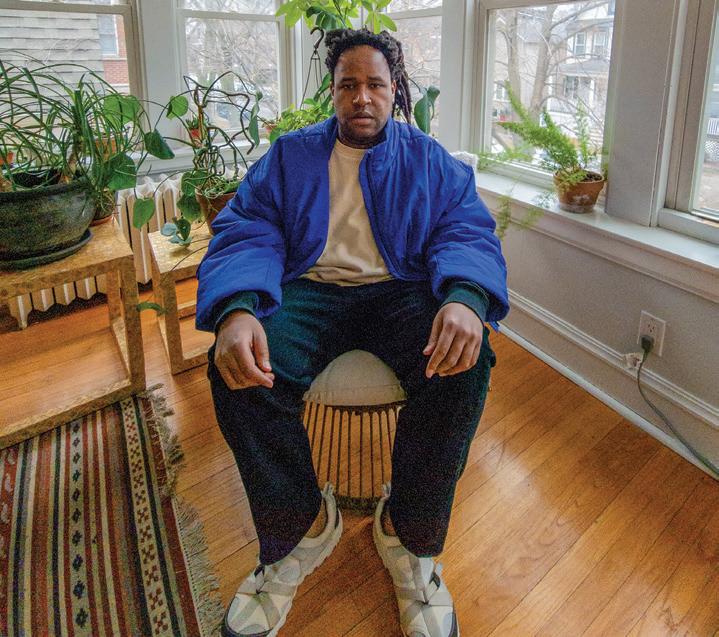 JERMAINE COLLINS
JERMAINE COLLINS
Chicago producer, DJ, and promoter Jermaine Collins, aka Composuresquad, has been part of the city’s dance scene for the past decade. He hooked up with local dance collective and record label Them Flavors in 2013, and the following year he joined the crew. In 2021 he issued his debut album, Auto D., through the Issa Party label. He also runs a livestreaming dance series called Club Initiative with Issa Party founder Christopher Santoso (aka Please). In December, Collins launched a monthly hourlong program for Beloved Radio, a brand-new hyperlocal Web-based station hosted on Mixcloud. His next Beloved show is Friday, January 27, at 1 PM.
My mom was married to an aspiring rapper when I was a kid. It was a short marriage, but from the ages of ten to 12—well, ten to 16—I was around a rapper and all his buddies, and he was making beats in the house and all that. I never really used any equipment, but it obviously left an impact, because it’s what I’m doing.
I never really had any interests besides music when I was a teen. I was a nerd about music, and I used to read a lot of Pitchfork in its heyday—during the 2000s. I didn’t really have any plans after high school, so I started producing beats and just working. That was when I was 18. My homie, Saint Icky, who’s
like my brother, has also been simultaneously doing music since he was a teen—he was in hardcore bands in the south suburbs and transitioned to rapping. I think my stepdad influenced both of us, and it was what we were just gonna do.
I’ve known [Saint Icky] since I was ten years old. He was the first friend I made when I moved to the burbs. That’s really it, honestly— we’ve just been best friends. We lived a block away from each other when we were kids.
I started tinkering around in [music software] Reason a lot. I’m not sure what my process was back then. I know now I’m pretty good at looking stu up, or enrolling myself in online courses. I really don’t think there was any manual or anything—I think I just fucked around in Reason until I started making stu . I would read a lot too, about stu related to making music, on the Internet. But I never really learned how to actually make music on a formulaic scale. I just kinda mess around with sounds I like until something happens.
I think the first beat I made, it was basically a cover of—you know the song with Drake and Trey Songz called “Successful”? It was kinda like that. I guess [the process has] always been the same: I would make pop music, and I’d try to make dance music, but I don’t really do that. I have stu that I was able to save from Soundcloud—old MySpace, actually. It’s like Andy Stott and Beyoncé, mixed together. The one I really like still—the Weeknd and Delroy Edwards—there’s a good blend I have from literally ten years ago. I think I’ve always kind of had the same idea.
In maybe 2011, ’12, we were living in a place on Ashland, and they would throw house parties. And I tried to throw a party, like, once, and nobody came. I was like, “Whatever.” But then I met the Them Flavors people in 2013. We worked for, like, three years after that—till like 2017—and threw 120 shows or some shit. I was more into the business side, and I stopped producing for a while. Once I was unemployed and I already had a following locally, I started making music again and actually releasing it.
[Them Flavors and I] were all into the same burgeoning club scene that was happening
around that time, with Night Slugs and footwork taking o —well, I mean, it was already well established, but just the early club and footwork days. They were bringing stu that nobody else was bringing that I listened to. When I was younger, I would lose my shit and really dance at shows, to the point where it was like—I wouldn’t say it was a spectacle, but [Them Flavors] knew me just from going hard at their shows. They sent somebody, like, “Yo, you should work with us.” We mostly started hanging first. I think one of the first shows where I was a member, they were like, “Jump on these CDJs.” I was like, “What?” I mean, I’d DJed in public before that, but it was to nobody.
I’ve always been chasing trying to make dance music or compete in that arena. I basically started out trying to make club music. I’m not really into, like, bridge-chorus-bridge or whatever the fuck. I don’t really do the formulas that you’re supposed to do when you make music, or dance music. I’m really into space, anime, and video games, and I think that really influenced a lot of stu . That song “Blood,” with Perry [Lomax, aka Saint Icky], has two Sega samples. One is Sonic when he’s losing his rings. The other is from that game Shenmue—the lady was just like, “Calm yourself to realize the true nature of things.” I think my viewing habits and my other media habits, like Cyberpunk 2077 and stu like that, really inform my music.
[Christopher Santoso and I] do Club Initiative every month-ish. We try to do it at least once a month, but it depends on what goes wrong. We should have another episode coming out in a couple weeks. I have a lot of unreleased music I’ve been hoarding that I was supposed to release with Please again. I just made a pretty great track with Ariel Zetina. A lot of new music that I’m making doesn’t have drums, and it’s more like scores; I’ve been doing that, just writing more classicalsounding stu . I’m just making new music for maybe a couple projects. There’s more shows coming for Club Initiative as well.
It’s just what I do with my life, honestly. I have a really good job that I enjoy as well. But
46 CHICAGO READER - JANUARY 12, 2023 ll
CHICAGOANS OF NOTE
“As long as there’s a music community here to connect with, I’m probably going to be doing it. It’s just the main way I connect with people.”
As told to LEOR GALIL
I wouldn’t be satisfied working just a job, ever. As long as there’s a music community here to connect with, I’m probably going to be doing it. It’s just the main way I connect with people. There’s a lot of weird stuff going on in the dance community. A lot of the incoming young people are really brash and kind of disrespectful, so there’s kind of skating a line between trying to reach out to the younger people and then pulling back. Also there’s weird stu going on with corporate sponsorships. Honestly, I’ve mostly experienced a lot of it over the Internet the past couple years, just ’cause of COVID.



But there’s so much going on, honestly, which is great, even though all this bad stu is happening. There’s more shows than ever—it
seems like back in the 2010s, when we had all the Wicker Park stu happening all the time. There’s a lot of stuff going on at the Clipper and Podlasie, so that’s really great to see. But I think there could be more actual looking into what we’re doing and the purpose behind it, versus just straight hedonism. Because that’s really what I see a lot.




I’m just really into doing good business, paying people fairly, and representing people who are underrepresented—that’s basically it. I just don’t wanna be a promoter that underpays people, so I’ll try to stay ahead of the curve with that, all the time. v

JANUARY 12, 2023 - CHICAGO READER 47
MUSIC 3730 N CLARK ST METROCHICAGO.COM @METROCHICAGO SMARTBARCHICAGO.COM 3730 N CLARK ST | 21+ SATURDAY FEB 04 Expansions NYC with LOUIE VEGA (ALL NIGHT) SATURDAY FEB 11 Global Swing presents JOVONN GARRETT DAVID ESOE FRIDAY FEB 10 MARIE DAVIDSON JUSTIN AULIS LONG LORELEI FRIDAY FEB 03 Things That Go Bump In the Night DERRICK CARTER BAYSIDE WHITE REAPER FIT FOR AN AUTOPSY SHOW ME THE BODY THE TOSSERS YO LA TENGO ALGIERS FEB 26 MAR 10 MAR 12 MAR 16 MAR 17 MAR 24 MAR 30 Laid Back | Cold Beer | Live Music @GMANTAVERN GMANTAVERN.COM 3740 N CLARK ST 21+ FRIDAY JAN 27 / 10PM / 21+ STILL WATERS X STUNTSZ PRESENT LAST NIGHT A DJ SAVED MY LIFE Mike Servito b2b Hiroko Yamamura Lauren Flax b2b DJ Heather Justin Cudmore b2b Shaun J Wright SUNDAY JAN 22 / 10PM / 21+ QUEEN! ft. Queen! residents + guest host Chanel Mercedez Benz SATURDAY FEB 04 / 8PM / 18+ QUEEN! ft. Queen! residents, guest dj Jessy Lanza, guest host Vanda LaRose SUNDAY JAN 15 / 10PM / 21+ FKF, QUEEN!, METRO & SMARTBAR PRESENT FOR FRANKIE! A celebration of his life with proceeds benefi ing the Frankie Knuckles Foundation SATURDAY JAN 28 / 9PM / 21+ A SLEEPING VILLAGE 5 YEAR ANN CELEBRATION PLAID + Matchess + Abstract Science DJs (afterparty) WED FEB 15 OBSESSED PRESENTS ADORE DELANO Party Your World Tour SAT JAN 28 MAGIC CITY HIPPIES + CAPYAC THU MAR 02 JUNIOR BOYS + Hagop Tchaparian WED MAR 08 ILE 1/ 14 @ emporium wicker Park 1/14 @ beat kitchen 1/20 @ reggies 1/21 @ empty bottle bombazo yam haus koffin kats patter
@imLeor
MUSIC
PICK OF THE WEEK
Local improvisers Ken Vandermark and Tim Daisy renew their collaboration by composing new material for each other


CONCERT PREVIEWS THURSDAY12
Sick Day Grace Bloom headlines; Reggie Pearl and Sick Day open. 8 PM, Schubas, 3159 N. Southport. 21+ F
In December, Olivia Wallace launched an email newsletter for her Chicago indie-rock band, Sick Day. The first message included info about upcoming shows, photos from home-recording sessions, and a crudely drawn cartoon about self-doubt, awkwardness, and creating art in an economy that’s built to make it unsustainable. The newsletter’s simple design and casual language have a refreshing, down-to-earth intimacy that social media apps seem only able to simulate, despite their promises of hyperconnection. It’s earnest in the way that indierock zines were in ages past, and so is Wallace’s band. Sick Day evoke the scruffy homemade eccentricity of many of the great 80s K Records acts, but Wallace and her bandmates treat the familiar style of that bygone era as a suggestion, not as a template—and that lets them break new ground, even on turf that’s been claimed many times over. On Sick Day’s self-released debut album, September’s Love Is a State of Mind, they play shambolic, sometimes stripped-down songs with a youthful giddiness that makes their most well-worn sentiments about romantic longing and blossoming crushes feel new. They sound so easygoing that it’s easy to forget how skilled and sharp they are as musicians; on the taut “Take a Little Bit of Love From Me,” by the time Wallace’s bouncing multitracked vocals deliver the hook, Sick Day have already made their case as one of the city’s next great emerging indie acts. —LEOR GALIL
FRIDAY13
KEN VANDERMARK & TIM DAISY DUO
Thu 1/12, 8:30 PM, Elastic Arts, 3429 W. Diversey #208, $15. b
THE EPISODIC PARTNERSHIP OF reeds player Ken Vandermark and drummer Tim Daisy is an ongoing study in ceaseless change. Since Daisy joined the Vandermark 5 at the end of 2001, the two of them have played together in a variety of settings, using di erent methods to arrive at di erent sounds. Their output has included the Vandermark 5’s tightly charted, rock-tinged jazz; Made to Break’s electronics-infused experiments with shu ed structures; and the all-acoustic, intricately contrapuntal ensemble music on the 2017 album Triptych, which the two men made with clarinetist Michael Thieke. Between 2007 and 2011 they worked steadily as a duo, creating totally improvised music typified by the 2011 performances on the download-only 2020 release Consequent Duos: Series 2a. On that recording, they use their deep knowledge of each other’s playing to fuel lengthy, open-ended investigations of bluesy grooves, slowly changing textures, and lightning-quick geometric reconfigurations. This concert is the first time Vandermark and Daisy have played as a duo since summer 2011. It’s also the first date of a brief midwestern tour, and it initiates another new phase in their collaboration: for the first time, both musicians have prepared compositions, with the hope that a new method will yield new ideas.
—BILL MEYER
Last year was particularly stellar for some of the life-affirming bands who helped write the vibrant 1990s indie-rock movement into the history books. Built to Spill, Superchunk, and Guided by Voices dropped new albums that stack up to their classics, while Pavement embarked on another successful reunion tour. But Archers of Loaf might have one-upped all of their brothers-in-arms. In their heyday, the North Carolina-born band (singer and guitarist Eric Bachmann, guitarist Eric Johnson, bassist Matt Gentling, and drummer Mark Price) were beloved for their smartass noise-punk, whose gloriously shambolic tongue-in-cheekiness made anthemic nuggets such as 1993’s “Web in Front” scuzzily charming. They called it quits in 1998 after their fourth full-length, White Trash Heroes , but re-formed in 2011 for sporadic tours scheduled around day jobs, family life, and solo projects.
48 CHICAGO READER - JANUARY 12, 2023 ll
Ken Vandermark & Tim Daisy Duo See Pick of the Week at le . 8:30 PM, Elastic Arts, 3429 W. Diversey #208, $15. b
Archers of Loaf Weird Nightmare open. 8 PM, Bottom Lounge, 1375 W. Lake, $30. b
12
Recommended and notable shows and releases with critics’ insights for the week of
January
STEVE KAISER
b ALL AGES F
ANDY MOOR
Last year, the band released their first new album in nearly a quarter century, Reason in Decline—and they knocked it out of the park.
As the story goes, it took some work to find that old thread again. Bachmann is an exceptional tunesmith, and he blossomed in his post-Archers career, first exploring chamber folk as leader of Crooked Fingers and then going solo. He applied his raspy voice to twangy, heart-on-sleeve Americana in the vein of Tom Waits and Bonnie “Prince” Billy, embracing the troubadour role and apparently leaving the snaking twin-guitar sonics, noisy bursts, and throaty wails of Archers in his rearview mirror. Now 52, Bachmann has admitted that he’s felt he could no longer channel his twentysomething angst into songs fit for Archers of Loaf, but he changed his mind a er enduring the soul-crushing isolation of the pandemic lockdown and the political strife of the past couple years. That makes Reason in Decline feel like the perfect progression from (and a de facto companion piece to) the matured songwriting on White Trash Heroes
This grayer, wiser, and more grizzled iteration of Archers still sling their trademark “icky mettle” (the title of their 1993 debut) on buzzsaw ragers such as “Screaming Undercover” and “Misinformation Age,” but they also balance them with poignant ballads. Bachmann does his best to tear your heart right out of your chest on the ambient country tune “Aimee” and the slow-burning piano-driven number “War Is Wide Open.”
On the first leg of their tour to support Reason in Decline, which began in late November, the band put on career-spanning shows, ripping through crowd-pleasers such as “Harnessed in Slums,” “Might,” and “Scenic Pastures” as well as soon-tobe-classics from Reason in Decline , among them “In the Surface Noise” and “Saturation and Light.” That heady mix of songs puts to bed the notion that this reunion is a mere exercise in nostalgia; Archers of Loaf’s second act is about looking forward as much as revisiting indie rock’s long-gone glory years. —BRAD COHAN
TUESDAY17
Brady Spread Joy headline; Wad and Brady open. 9 PM, Sleeping Village, 3734 W. Belmont, $5. 21+
Sam Boyhtari makes spellbinding shoegaze with the band Greet Death in Flint, Michigan, but for the past few years he’s also been part of a fourpiece group based in Chicago. In August that band, Brady, released their debut album, You Sleep While They Watch (Flesh & Bone). They use shoegaze’s weather-system scale and amniotic warmth without saturating their music in wall-to-wall distortion. Instead Brady prioritize clarity, which is most noticeable in Boyhtari’s vocals—throughout the album he articulates himself calmly and clearly, and his lyrics about our misbegotten world ride high in the mix so you don’t miss a single harrowing word. On the epic closing number, “Catherine,” Boyhtari weaves together several tragic end-of-life narratives, loading them with the clinical detail of a reporter’s notes. But his serene demeanor and the band’s clean, focused playing lend the song a flicker of hope—or at least the sense that the pain of
THURSDAY19
Michael Shannon calls Brooklyn home these days, but the award-winning actor and founder of A Red Orchid Theatre still spends enough time in Chicago to remain one of the city’s most cherished nightlife figures—he’s right up there with Sharkula and the Tamale Guy. He played the main antagonist in The Shape of Water , and in 2018 he generated headlines when he chose to watch the film win its Oscars from a beloved Old Town dive bar. He’s also made a tradition of flexing his musical muscles in the city’s independent venues: he’s writhed around the Metro stage shirtless, wailing Iggy Pop’s “Lust for Life,” as part of the David Bowie tribute project Sons of the Silent Age, and he’s graced the Empty Bottle with his finest Ric Ocasek impression.
To kick off 2023, Michael Shannon and longtime collaborator Jason Narducy (Split Single, Superchunk) have reunited for their annual cover show. The two of them have been assembling ad hoc bands for the occasion since 2015, when Shannon asked Narducy to put one together from among their friends in the city’s arts community to perform the Smiths’ The Queen Is Dead. The shows are always different, but a few constants persist: the duo alway choose a watershed album (Neil Young’s Zuma, Bob Dylan’s Highway 61 Revisited), Narducy takes care of the band, and Shannon embodies the year’s muse.
This go-round, they’ll cover the Modern Lovers’ 1976 self-titled debut. Released two years a er the group broke up, the album encapsulates the legacy of the greatest band protopunk barely had— an unlikely musical gift that continues to inspire new generations of musicians. As significant as the source material is, though, you don’t go to a Michael Shannon show to hear rote re-creations of beloved classics. Shannon’s joie de vivre seeps from his pores, whether he’s whipping across the stage, mean mugging behind a pair of tinted sunglasses, or waving on special guests such as Local H’s Scott Lucas. Narducy and Shannon’s annual covers shows are not only a testament to their talents as musicians and passions as fans but also a display of their enduring friendship.
—SHANNON NICO SHREIBAK
SATURDAY21
Doss Ariel Zetina and Sqip open. 9 PM, Lincoln Hall, 2424 N. Lincoln, $30. 18+

New York City producer and songwriter Doss arranges sounds from the past three decades of dance-music history into effervescent pop collages. Doss was friends and collaborators with late hyperpop lodestar Sophie, which partly explains why her work pops up in Spotify’s hyperpop playlist—not everybody considers Doss a hyperpop artist, but her presence there benefits the notoriously slippery

JANUARY 12, 2023 - CHICAGO READER 49
MUSIC Doss EMILY LIPSON
Brady KACEY KEITH
grief can be softened by your chosen community. —LEOR GALIL
Michael Shannon & Jason Narducy with friends 8 PM, SPACE, 1245 Chicago, Evanston, sold out. b
MUSIC
Find more music listings at chicagoreader.com/musicreviews
continued from p. 49
genre. As much as I appreciate hyperpop’s creative free-for-all, I wish more artists competing for oxygen in that category had the skill that makes Doss distinctive: drawing joy from melancholy with nonchalant panache. On the excellent 2021 EP 4 New Hit Songs (LuckyMe), Doss rewires trance music’s merciless pulse to make it as soothing as it is enlivening. On the EP’s best track, “Puppy,” a hypnotic drum ’n’ bass loop ties together crosshatching, upbeat synth lines into a dizzying hook whose wistful, romantic feel is crystallized by Doss’s lyrics: she sings about pining for an old relationship with a solemn, dry simplicity that feels both tossed-off and disarmingly intimate. I haven’t been able to shake “Puppy” since I first heard it nearly two years ago— all artists, hyperpop or not, should aspire to leave that kind of an impression.
—LEOR GALIL
ALBUM REVIEWS
tours and occasional session work. But Say I Won’t is the project’s first album to be conceptualized and recorded with his current touring band, a threepiece featuring his younger brother, guitarist Jim Barrett, and drummer Eric Parisi.
That collaborative approach gave Barrett space to tackle various songwriting details, and it’s allowed the band to grow artistically while staying true to their “banger a er banger” template. The record’s fresh melodies and whip-tight breakdowns make for a pretty good listen, and fans who have followed BDoD from their 2011 debut, GB City, will notice their evolution. The band have also returned to their first label, Oxford-based Fat Possum, and in that sense, Say I Won’t is a bit of a homecoming. Songs such as “Say Your Prayers” and “No Doubt” pack in great riffs and tight turns of phrase: “No time to shake it when I get this way / Wild-eyed and dangerous is the way I play,” Barrett sings on “No Doubt.” This is dusty, 70s-inspired rock with a chip on its shoulder—a soundtrack to whiskeykissed nights and hangover-tormented mornings. And while Bass Drum are as vulnerable as any rockers to charges of relying on formula, they also sound like master students who still have room to grow. —CRISTALLE
 BOWEN
BOWEN
Bass Drum of Death’s music feels like a headbanging night of fun and questionable decisions. At its best, it satiates with the brevity and heft of the greatest punk rock. At its worst, it gets the band lumped into a box with similar artists such as the White Stripes, Wavves, and Ty Segall. Fortunately, these garage rockers refuse to be typecast—even when they nod to their rock ’n’ roll contemporaries or predecessors.
The story behind the Bass Drum of Death’s new fifth album, Say I Won’t , sounds like a double dog dare. Singer and bandleader John Barrett launched the project as a one-man band in Oxford, Mississippi, in 2008, playing both guitar and bass drum. He created the first two Bass Drum of Death albums on his own, bringing in a rotating cast of musicians for
John Cale, Mercy Domino

dominomusic.com/releases/john-cale/mercy/ exclusive-limited-double-lp
It’s hard to convey how much the music of John Cale means to me. The Welsh-born polymath cofounded the Velvet Underground, bringing a crucial avant-garde perspective to the band; he’d worked with experimental titans Tony Conrad and La Monte Young back when Lou Reed was still writing teenage doo-wop pastiches. When Cale le the band in 1968, they lost his exploratory edge and viola sawing. They started writing pop songs, and Cale did the same. His 1970 record Vintage Violence features catchy nuggets that reference classical
music, creating an elegiac vibe he further explored on 1973’s Paris 1919 (perhaps his best-loved album to date). He soon discovered glam and punk, styles he’d inadvertently helped create with the Velvets. Over the next several decades he also brought his inventive, eloquent perspective to synth pop, piano ballads, and alt-rock and amassed a body of work in movie music, writing scores and soundtracks for independent films as well as box-office hits such as American Psycho Cale’s brand-new double LP, Mercy , is his first since 2016’s M:FANS (itself a reworking of 1982’s Music for a New Society ), though he hasn’t left music in the meantime—I caught him in concert at the School of the Art Institute in January 2020. Written over several years, Mercy feels conditioned by the pandemic and other world tragedies and o en seems to seek redemption in dark times. The title track expresses this in seething, queasy adult-contemporary songcraft with cold synths and sparse, hollow percussion reminiscent of Fleetwood Mac’s Tusk . “Marilyn Monroe’s Legs (Beauty Elsewhere)” and “Not the End of the World” are captivating bits of illbient tuneage; the instrumental elements cascade in and out, and Cale bathes his smooth brogue and wordless grunts in oodles of delay. “Moonstruck” is a spacey, orchestral ode to Nico, Cale’s Velvet Underground bandmate and longtime collaborator, that recalls his classic symphonic 70s period—it gives him room to breathe in his own sense of time.
Mercy unfortunately relies a little too heavily on chintzy digital beats and glitchy avant-garde electronica, both of which start to feel dated and played out. The album is also loaded with collaborations, not all of which feel necessary. “Time Stands Still” has a sweet melody (it even incorporates a Christmas madrigal), but the subtle computer manipulations and whispered vocals from Amelia Meath of Sylvan Esso feel redundant. The Auto-Tuned vocal loops that Animal Collective provide to start “Everlasting Days’’ are hard for me to listen to, because it bothers me to hear the mythic Cale paired with subBeach Boys indie cutesiness—and the song’s wafer-
thin backbeat is absolutely abysmal.
Some of the guest stars work great, though: on the epic art-rock ballad “Story of Blood,” Natalie Mering of Weyes Blood adds deep, ethereal background vocals that complement Cale’s baritone (I could imagine Nico recording the track in her later period). The thoroughly weird “The Legal Status of Ice,” made with the unfortunately named Fat White Family, relies on thin computer-generated stuff but also uses what sounds like a touch of analog percussion, thus approaching actual rock ’n’ roll. The album closes with the plaintive “Out Your Window,” which starts with Cale on piano and vocals before swirling into a thicker composition. It had me longing for a proper Cale solo album, without the distractions of extraneous musicians or programmed rhythms that sound 15 years out of date. Sure, he’s mined that stripped-down terrain before, but I prefer it when he focuses on his smart lyrics and his talent for summoning moods. That said, Mercy has its great moments, and it may yet grow on me.
—STEVE KRAKOW
Deathprod, Compositions
Smalltown Supersound
deathprod.bandcamp.com/album/compositions
Norwegian artist Helge Sten, who makes music as Deathprod, trades not in massive dynamic shi s but in uniformly gray ambient soundscapes. He typically uses a variegated array of homemade electronics, samplers, out-of-date processors, and other audio detritus that echo, hiss, and throb like futuristic boilers arduously coming online while retro steampunk conglomerations cough and doppler away. His new album, Compositions , doesn’t radically differ from this formula, but it seems like an advancement or at least a distillation. Sten’s 2019 album, Occulting Disk, spread grainy smears of sound across monumental tracks in an assault of brown noise. Compositions , by contrast, pares his sound back to its essence. Its 17 compact pieces feel like they’re constantly on the verge of diffusing and collapsing into particles of dust. Sten called Occulting Disk an antifascist ritu-
50 CHICAGO READER - JANUARY 12, 2023 ll
Bass Drum of Death, Say I Won’t Fat Possum bassdrumofdeath.bandcamp.com/album/say-iwont
Bass Drum of Death STEVE GULLICK
John Cale MADELINE-MCMANUS
MUSIC
al, but Compositions seems more like an evocation of cyberpunk exhaustion and emptiness—it doesn’t blare defiance but rather crawls and scrapes into a resolute, alien form. Compositions is dreamy, poetic, and sad, but at the same time it rejects such emotions in favor of staring blankly at microscopic fractures in a tall, bleak wall.
—NOAH BERLATSKY

 Negroni, Bulli 4AD velvetnegroni.bandcamp.com/album/bulli
Negroni, Bulli 4AD velvetnegroni.bandcamp.com/album/bulli

Jeremy Nutzman, who makes music as Velvet Negroni, was adopted by a white evangelical Christian family (he’s Black) and grew up taking rigorous piano lessons. His parents forbid him to listen to secular music, and to say they were strict about it is an understatement: in a 2019 interview with the Fader, Nutzman described dismantling air vents to hide contraband CDs, only to have them discovered anyway. But just like cave plants grow toward the faintest glimmer of sunlight, creativity has a way
of blossoming under constraint. In college Nutzman got involved with his local noise scene (he notably became a member of Marijuana Deathsquads) and later made experimental, genre-blending music with the project Pony Bwoy. When that dissolved, he turned his focus to Velvet Negroni. His 2017 debut, T.C.O.D. , landed him a deal with 4AD, where he released the dark, sparse, and trippy Neon Brown in 2019. On its surface, his latest record, Bulli, might feel lighter than its predecessor—its opening track, called “Pop Song 2,” features an upbeat guitar and closes with a club-worthy retro dance rhythm. But despite its moments of joy, this is music born of tumult, including a fire at Nutzman’s home and studio space; the foreboding rumble of “The Foreigner” evokes a voyage across a stormy sea. The sonic experiments on Bulli don’t consistently work, but even the failures sound like an artist forging an individual musical language. And when they hit, they hit hard: the lush “Animal” mixes wavering synth lines with hypnotic percussive rhythms, and the soulful, keyboard-driven “Ebony Eggshell” feels ready to be one of the first sleeper hits of 2023. —JAMIE LUDWIG v



JANUARY 12, 2023 - CHICAGO READER 51
Velvet Negroni AARON RICE
Velvet
EARLY WARNINGS
Los Ángeles Azules 3/25, 8 PM, Allstate Arena, Rosemont b
Los Temerarios 3/30-3/31, 8 PM, Allstate Arena, Rosemont b
Lucki, Eem Triplin 3/18, 7 PM, Radius Chicago b Marc Anthony 2/24, 8 PM, Allstate Arena, Rosemont b John McNamara Trio 3/9, 9 PM, Hungry Brain Midnight Dice, Baazlvaat, Oscuridard Eterna, Speedpussy 2/18, 7 PM, Livewire Lounge
Anna Mieke 2/10, 8 PM, Maurer Hall, Old Town School of Folk Music b
Mission [UK], Chameleons, Theatre of Hate 10/3, 8 PM, Thalia Hall, 17+ Molder, Obscene 3/31, 8 PM, Reggies Music Joint
Tommaso Moretti’s Inside Out 2/9, 9 PM, Hungry Brain
Teedra Moses, Afrotrak 3/26, 8 PM, Chop Shop
NEW
Samuel Aaron, Greg Freeman, Snake Pond 2/15, 9 PM, Sleeping Village
Gracie Abrams, Tiny Habits 3/7, 7 PM, House of Blues b Adore Delano 2/15, 8 PM, Metro b
Alash 1/27, 8 PM, Szold Hall, Old Town School of Folk Music b
Jon Anderson & the Band Geeks 5/13, 7 PM, Des Plaines Theatre b
Steve Aoki, Timmy Trumpet, Dr Phunk, Juuku, Chyl 2/24, 9 PM, Aragon Ballroom, 18+
Ariel’s Party featuring DJ Ariel Zetina 1/28, 10 PM, California Clipper Arriver 3/11, 8 PM, Burlington Ashe, Em Beihold 4/23, 7:30 PM, Riviera Theatre b
Asleep at the Wheel 4/15, 7 PM, Des Plaines Theatre b Astro Ever A er, Los Black Dogs 2/12, 8 PM, Burlington Grazyna Auguscik Group 2/25, 8 PM, Green Mill
Marcia Ball & Tinsley Ellis 4/14, 8 PM, City Winery b
B.J. Barham 4/6, 8 PM, Schubas
Bass Drum of Death, Dead Tooth 4/14-4/15, 8 PM, Cobra Lounge, 17+
Blushing, Pale Dian, Lightfoils, Sleepwalk 3/14, 9 PM, Empty Bottle
Garrett Body with Shonn Hinton, Marcus Kincy, and Block Soul 3/24, 7 PM, the Promontory b
Burst and Bloom 1/27, 7:30 PM, Bottom Lounge, 17+ Cactus Blossoms, Jon Langford 2/18, 8 PM, Maurer Hall, Old Town School of Folk Music b
Joseph Capriati 3/3, 10 PM, Concord Music Hall, 18+
Erin Coburn Band 2/10, 9 and 11 PM, Rosa’s Lounge
Cold, Sygnal to Noise, Awake for Days, Divide the Fall 5/24, 6:30 PM, Bottom Lounge, 17+
Cowboy Junkies 4/6-4/7, 8 PM, Maurer Hall, Old Town School of Folk Music b
Jeremy Cunningham/Sarah Clausen Trio 1/26, 8 PM, California Clipper
Daisy the Great 4/15, 8 PM, Beat Kitchen b
Daisychain, La Rosa Noir, Julia Morrison 3/9, 8:30 PM, Gman Tavern
Marie Davidson, Justin Aulis Long, Lorelei 2/10, 10 PM, Smart Bar
Dead Poet Society 2/26, 8 PM, Beat Kitchen Debby Friday 4/20, 9 PM, Empty Bottle
Deko, Yameii 3/12, 6 PM, Subterranean b
Depeche Mode 4/5, 7:30 PM, United Center b D.R.I., Paralysis, Break the Cycle, Complacent 4/8, 8 PM, Reggies Rock Club, 17+
Dubfire, Hiroko Yamamura 2/25, 10 PM, Concord Music Hall, 18+
Easy Life, Saiah 5/4, 8 PM, SPACE, Evanston b Elita 4/30, 7:30 PM, Cobra Lounge b
Epik High 3/26, 7 PM, Radius Chicago b
Lily Finnegan, Jason Stein, and Macie Stewart; Kieran Daly 3/2, 8:30 PM, Elastic b
Friends of the Gamelan 5/20, 8:30 PM, Constellation, 18+ Eric Gales 2/24, 7 PM, Des Plaines Theatre b
Victor Garcia 3/2, 8:30 PM, Constellation, 18+ Gloc-9, Shanti Dope, Heavenknew 3/11, 6:45 PM, North Shore Center for the Performing Arts, Skokie b
Buddy Guy, Mzz Reese 1/26, 7:30 PM, Buddy Guy’s Legends
Buddy Guy, Nublu Band featuring Carlise Guy 1/28, 8:30 PM, Buddy Guy’s Legends
Wayne Hancock 5/5, 8:30 PM, FitzGerald’s
Walker Hayes, Ingrid Andress, Breland 4/13, 8 PM, Rosemont Theatre, Rosemont b
Hermitage Green 8/17, 7:30 PM, Schubas
The Hold Steady 7/2, 9 PM, Empty Bottle
Hot Business, Brown Line Boys, Bent Dimes, Littlebirds 3/3, 8 PM, Cubby Bear
Zakir Hussain & the Masters of Percussion 4/7, 8 PM, Symphony Center
Ingested, Devourment, Extermination, Dismemberment, Organectomy 5/30, 6 PM, Cobra Lounge, 17+
Janet Jackson, Ludacris 5/27, 8 PM, Hollywood Casino
Amphitheatre, Tinley Park b
Jamala 6/3, 8 PM, Chop Shop
Jovonn, Garrett David, Esoe 2/11, 10 PM, Smart Bar
Justhis, Don Malik 3/5, 7 PM, Avondale Music Hall b
Dermot Kennedy 6/7, 7:30 PM, Huntington Bank Pavilion b
Keshi, Deb Never, James Ivy 3/24, 7:30 PM, Aragon Ballroom b
Tommy Kessler, Nora Marks, Pretty Pleased 3/4, 8:30 PM, Gman Tavern
Key Glock 3/29, 8 PM, Radius Chicago b
Kingtrey, Solocleo, M.E.H. 3/16, 8 PM, Schubas, 18+ Greg Koch & the Koch Marshall Trio, Nick Moss Trio 2/16, 7:30 PM, Martyrs’
Lettuce with the Chicago Philharmonic 3/25, 7:30 PM, Auditorium Theatre b
Mykki Blanco 3/25, 9 PM, Sleeping Village

New Pornographers, Wild Pink 5/5-5/6, 8 PM, Thalia Hall, 17+ Pakt 3/1, 8 PM, Bananna’s Comedy Shack at Reggies
Joel Paterson Trio 2/18, 9 PM, Hungry Brain
Paul’s Dead 1/28, 9 PM, Bottom Lounge, 17+
Plini, Sungazer, Jakub Zytecki 5/9, 7 PM, Bottom Lounge, 17+ Precocious Neophyte 3/1, 8 PM, Burlington
Luke Pytel Blues Band with Shirley Johnson 1/27-1/28, 9 PM, Blue Chicago
Avreeayl Ra’s Dream Stuff performance and film screening 2/2, 8:30 PM, Elastic b Razor Braids 3/24, 7 PM, Subterranean, 17+ Reticent, Plague of Carcosa 4/4, 7 PM, Livewire Lounge Rome Streetz, Stove God Cooks, Eddie Kaine, Rim, Daniel Son 3/23, 8 PM, the Promontory Runnner, Waveform 3/3, 8 PM, Beat Kitchen, 17+
Serengeti 2/28, 8:30 PM, Sleeping Village Shame 5/24, 8:30 PM, Thalia Hall, 17+ Sik-K 3/28, 7 PM, Concord Music Hall b Silos 5/11, 7:30 PM, Hey Nonny, Arlington Heights b Simrit 5/2, 8 PM, City Winery b Sizzy Rocket 5/30, 8 PM, Schubas, 18+
Sam Smith, Jessie Reyez 8/15, 8 PM, United Center b Special Consensus 4/7, 7:30 PM, Hey Nonny, Arlington Heights b Subdocta, Black Carl! 3/3, 8 PM, Avondale Music Hall b Talib Kweli 2/26, 6 and 9 PM, City Winery b Tamarie T. & Thee Elektra Kumpany, DJ Duane Powell 4/21, 7 PM, the Promontory
b ALL AGES F
GOSSIP WOLF

Tank & the Bangas with the Chicago Philharmonic 2/18, 7:30 PM, Auditorium Theatre b Tanukichan, Winter 4/27, 9 PM, Sleeping Village Tanzen, Synovial, Seeker Pearl, Careless Sanctions, End Path 2/18, 7 PM, Bottom Lounge, 17+ Tarta Relena 3/26, 8:30 PM, Constellation, 18+ Jasmin Taylor 2/10, 8 PM, the Promontory, 17+ Terrapin Flyer 2/21, 8 PM, Martyrs’ Ultrabeat 2/24, 8 PM, Cubby Bear
Vader, Krisiun, Decrepit Birth, Disinter, Hatemonger 4/5, 7 PM, Reggies Rock Club, 17+ Vancouver Sleep Clinic 3/30, 8 PM, Lincoln Hall, 18+ Vazum, Feral Ghosts, Eve Black 4/16, 9 PM, Livewire Lounge
Vérité 3/9, 8 PM, Lincoln Hall, 18+
Verve Pipe 3/25, 8 PM, City Winery b
Virgin Mother, Dead Hour Noise, Deeper Graves, Urine Hell 3/2, 8 PM, Burlington Loudon Wainwright III 4/21, 8 PM, SPACE, Evanston b Wanderer, Thin 2/27, 8 PM, Beat Kitchen, 17+ War and Treaty 4/19, 8 PM, SPACE, Evanston b Wax Tailor 3/25, 9 PM, Chop Shop, 18+
We Are the Union, Catbite, Kill Lincoln, J. Navarro & the Traitors 6/7, 6 PM, Cobra Lounge b
We Three 3/13, 7:30 PM, Subterranean b
William Elliott Whitmore 3/3, 8:30 PM, FitzGerald’s Witt Lowry 3/14, 8 PM, Subterranean, 17+ Wizkid 3/24, 7:30 PM, United Center b
Jeremy Young, Lula Asplund & Máo Chén Huì, Patrick Ryan Gleeson 3/18, 8 PM, Elastic b Young Nudy 3/18, 7 PM, Avondale Music Hall b
UPDATED
Awfultune 4/5, 8 PM, Beat Kitchen, canceled Dead Can Dance 4/11, 7:30 PM, Chicago Theatre, canceled Loudness, Bullet to the Heart, Midnight Devils, Pipe, Siin 5/19, 8 PM, Reggies Rock Club, rescheduled, 17+ v
IN SEPTEMBER , Reader critic Hannah Edgar wrote about Chicago singer and bandleader Christy Bennett and her research into the life of prolific Black Tin Pan Alley songwriter Irene Higginbotham (1918-1988), which led her to scour the copyright records of the Library of Congress and the archives of Brigham Young University, as well as to correspond with Higginbotham’s surviving family. Higginbotham fought for the intellectual property rights of Black songwriters, but the broken music-publishing system ended up obscuring her importance to history—even though her songs were performed by the likes of Billie Holiday (“Good Morning Heartache”), Benny Goodman (“That Did It, Marie”), Nat King Cole (“This Will Make You Laugh”), and Duke Ellington (“It’s Mad, Mad, Mad!”). In December, Bennett and her band Fumée self-released the tribute album Good Morning Heartache: The Music of Irene Higginbotham, and it’s a corker, brimming with elegant arrangements that bring the songwriter’s majestic, resonant tunes to new life. On Friday, January 13, at Constellation, Bennett and a seven-piece ensemble will tell Higginbotham’s story with a set of her songs newly arranged by bassist Ethan Philion, accompanied by video collages, live voiceovers, and pre-recorded voice-overs from Higginbotham’s nephew Marc Freeman and cousin Joe Orange
Emerging Chicago indie band Sweet Bike combine sloppy bar punk and cheeky fourth-wave emo, and the two warp-speed tunes on their 2021 debut EP, Disco graphy , combine jittery drums, dizzyingly cycling guitar, and heart-onsleeve doubled- up hollering. On Friday, January 13, they’ll play Gman Tavern at a birthday bash for bassist Garrett Shafer. Garrett’s Friday the 13th Big Bad Birthday Beatdown features a ragtag crew of locals, with Totally Cashed, CalicoLoco , and Gosh Diggity joining Sweet Bike. It starts at 8 PM, and tickets are $15 ($12 in advance). —J.R. NELSON AND LEOR GALIL
Got a tip? Tweet @Gossip_Wolf or email gossipwolf@chicagoreader.com.
52 CHICAGO READER - JANUARY 12, 2023 ll
Never miss a show again. Sign up for the newsletter at chicagoreader. com/early
Debby Friday KATRIN BRAGA
A furry ear to the ground of the local music scene
CHICAGO SHOWS YOU SHOULD KNOW ABOUT IN THE WEEKS TO COME
WOLF BY KEITH HERZIK
JOBS
(Mt. Prospect, IL) SNK America, Inc. seeks Sr. Service Engineer with 3 yrs exp in job offer or in mach tool assem or in servcg incl strong mech, pneum testg & debug. Must have exp w/elect & pneum ctrls; lrg cplx mach incl 5-Axis Gantry type CNC milling mach & elect wiring/testing. Freq domestic & int’l travel req’d. Apply online at: https://snkamerica.com/ employment/
(Mt. Prospect, IL) SNK America, Inc. seeks Sr. Service Technician with 2 yrs exp in job offer or in mach tool assem or in servcg incl strong mech, pneum testg & debug. Must have exp w/elect & pneum ctrls; lrg cplx mach incl 5-Axis Gantry type CNC milling mach & elect wiring/testing. Freq domestic & int’l travel req’d. Apply online at: https://snkamerica.com/ employment/
(Waukegan, IL) J.S.T. Corp seeks Market Research Analyst w/ Bach or for deg equiv in Bus Adm, CS, IT, Bus Anal or rltd fld & 3 yrs exp in job offer or rltd fld. Must have exp w/database struct, theor, princ & pract & exp w/VB.Net (Frmwrk) code or other prog lang. Occas trvl reqd. Apply to HR, 1957 South Lakeside Drive, Waukegan, IL 60085 or online at info@ jstus.com.
Touch of Beauty Supply, Inc seeks a Corporate Controller. Mail resume 2 E 154th St, Harvey, IL.
Software Developers, Schaumburg, IL: Develop the proof of concepts, contributes to the documentation as bi-weekly sprint cycles of Agile Scrum methodology workflow through grooming and Involved in sprint planning meetings which demonstrates to the business. Followed the best practices for creating the organization structure, Rules (code) creation, framework reuse while implementing the application. Travel/reloc to various unantic locs. Send res to: Rigelsky, Inc. at 120 W Golf Rd, Suite 106, Schaumburg, IL 60195 or email: info@ rigelsky.com
Dispatcher
FT. Max Carriers Inc., Westmont IL. Annual salary: $34,100, High school diploma, no training, no exp. req’d. Sent resume to maxcarriersmax@ gmail.com
Federal Home Loan Bank Chicago is seeking a Lead Credit Analyst, Collateral Credit in Chicago, IL. Primary responsibility for a team tasked with measuring, monitoring, and analyzing historical trends and external factors impacting the credit risk exposure for securities and mortgage related products. Must live within commuting distance of the office and must work at office at least 2 days a week, otherwise may work from home. Apply on-line at fhlbc.com/careers.
Associate Attorney (Real Estate, Affordable Housing)
J.D. degree req’d. Min. 1 yr. exp. in full-time pos’n. (s) involving drafting reports & applications for submission to gov. bodies and/or agencies req’d. Active IL law license req’d. Katten Muchin Rosenman LLP, Chicago, IL. Katten Muchin Rosenman LLP is an Equal Opportunity Employer/ AA M/F/SO/Disability/ Veteran. Resumes to: Recruiting, Katten Muchin Rosenman LLP, 525 West Monroe Street, Chicago, Illinois 60661 or via email to HRRecruiting@katten. com.


Senior Software Engineer in Test 1 Chicago IL. Develop test plans, help write automated tests & integrate them into deployment pipeline. designing, developing, supporting platform, responsible for logic & messaging to helps run ecommerce fulfillment for thousands of businesses. Contribute to all phases of application development lifecycle. BSc/BA in Comp Science, Engineering or related field or as an alternative HS plus 2 yrs’ exp as software engineer in test incl exp in testing both frontend & backend features, working knowledge of SQL, test case creation, test case execution, agile software dvlpmt, VSTS Test Manager or similar. Res: ShipBob, Inc.; abeck@ shipbob.com
Maintenance Manager (West Chicago, IL): Manage maintenance and asset care to maximize capacity and produce the highest quality product at the lowest cost. May be required to travel/telecommute. Mail CV/Cov ltr to: Giuliana Lumia: MAPEI Corporation, 530 Industrial Drive, West Chicago, IL, 60185. Ref code: G8867-00029
Senior Programmer Analyst 1WorldSync, Inc seeks Senior Programmer Analyst w/Bach or for deg equiv in Comp Sci or rltd fld & 5 yrs exp in job offer or soft dev. Must have 5 yrs exp as Full Stack dev; 2 yrs exp in tech ldrshp role for cmplx SW proj; solid objct-orient dsgn & dev skills incl knwldge of core lib, dsgn pttrns, encap & inherit, dbse dsgn & SW archt; dgtl transf tech dmns (e.g. Cloud, containerization, DevSecOps, etc.); dev wrkg on App Modern, transf Lgcy apps to GCP or AWS Cloud, Microservices, API gtwy, spring boot, ELK, Drools Rule Engine, GUI, Relat & NoSQL dbse & full stack imp & archt. Occais trvl reqd. Apply online https://1worldsync.com/ es/careers/ or to HR, 300 S Riverside Plaza #1400, Chicago, IL 60606.
Microsoft Dynamics NAV Developer Microsoft Dynamics NAV Developer (Bridgeview IL) Configure, develop & deliver MS Dynamics NAV software. Must have bachelor’s in comp. sci, systems engin’g, rltd/ equiv & 5 yrs progressive post-baccalaureate exp.1) as software developer w/ NAV & 2) ERP program’g exp. & hands on work w/ full life cycle implement C/SIDE C/AL dev. language. Remote wrk prmtd up to 3 dys/ week. CV to MJ Holding Company, LLC, lryan@ mjholding.com.
.NET
Senior Architect Exelon Business Services Company LLC seeks Senior Architect in Oakbrook Terrace, IL to conduct IT sw. archt. governance; determine alignment of IT projects w/ technical standards & other bus. reqs; plan intro. of new apps. & ID. best tech. choices to accomplish goals; & assist in dvlping white papers & conducting presentations to explain IT recommendations.
Reqs Bach’s deg. in Comp. Sci., Comp. Info. Sys., or related, U.S. or foreign equiv., + 5 yrs progressive exp. designing, anlyzing, & assessing sw. apps. & sys., cloud technologies, Middleware & Integration technologies, & Web technologies. Reply by electronic mail w/ resume to jobposting @exeloncorp.com.
Structural Engineer exp U.S. Services Inc. is seeking a Structural Engineer in Chicago, IL to Work on highway & railway related structure projects, incl but not be limited to new structures, rehabilitation of existing structures, & inspection & evaluation of existing structures, where the project involve a wide variety of structure types, foundations & materials for clients such as IDOT, CDOT, WisDOT, Illinois Tollway, Metra & CTA. 10% domestic travel required. Apply at www. exp.com, search for job# 105267
SW Eng 3
Comcast Cable Comm, LLC, Chicago, IL. Contrib to team resp for create & maintain ad campaign mngmnt system; Reqs: Bach in CS, Eng or rltd; 2 yrs exp create SQL & .Net (C#, EF, & LINQ) code; use Jira, Github, Jenkins & AWS thru full dvlpmt lifecycle; dvlp front-end interface use JavaScript library; use Postman for API & integration test; & prfrm containerization use Docker & Kubernetes. Apply to: renu_puril@ comcast.com. Ref Job ID# 0849
ABC Supply Corporation seeks Data Scientists
ABC Supply Corporation seeks Data Scientists (multiple positions) in Chicago, IL to gather requirements, data, and info and develop strategic approach to achieve project goals. Reqs. MS+2 or BS+5 yrs. exp. To apply mail resume to ABC Supply Corporation, Attn: Jennie Lindeman, 1 ABC Parkway, Beloit WI 53511. Must reference Job Title & Job Code: 000361.
RESEARCH
Have you had an unwanted sexual experience since age 18? Did you tell someone in your life about it who is also willing to participate?
Women ages 18+ who have someone else in their life they told about their experience also willing to participate will be paid to complete a confidential online research survey for the Women’s Dyadic Support Study. Contact Dr. Sarah Ullman of the University of Illinois at Chicago, Criminology, Law, & Justice Department at ForWomen@ uic.edu, 312-996-5508. Protocol #2021-0019.
PROFESSIONALS & SERVICES
LEGAL NOTICE
Public Notice Of Name Change
I file to change my name from John Earl Poole to John Mwalimu Kali Mwindaji with the State Of Illinois Circuit Court in Cook County.
ADULT SERVICES
Danielle’s Lip Service, Erotic Phone Chat. 24/7.
Must be 21+. Credit/ Debit Cards Accepted. All Fetishes and Fantasies Are Welcomed. Personal, Private and Discrete. 773-935-4995
SW Eng
Comcast Cable Comm, LLC, Chicago, IL. Contrib to team resp for create custom SW product; Reqs: Bach in CS, Eng or rltd; 2 yrs exp dvlp SW use C#, JavaScript, jQuery, HTML, CSS, REST web srvcs, SQL Server & GitHub; use testing frameworks; 1 yr incl dvlp SW in Agile dvlp environ; & use ORM frameworks, IOC containers & CI/CD tools. Apply to: renu_puril@comcast. com Ref Job ID# 0864
Price fx, Inc. seeks Solution Architect and Data Scientist – Presales in Chicago, IL to bld. ref. “as-is” & “tobe” dgrms. for prspctv. custmrs. for any/all types of com. regrdng. bus. prcss., PriceFX intra-module dat. flow, & CRM/ERP intgrtn. Telework/WFH is avail. for this post. 30% of the post. will reqre. domstc. trvl. & occsnl. internat. trvl. If interested send Cover Letter and Resume to: emil.antony@pricefx. com
Ray Allen, Inc seeks Team Leads for various and unanticipated worksites throughout the US (HQ: Chicago, IL) to lead sw dev lifecycle. Master’s in Comp Sci/ related field +3 yrs exp req’d. Skills req’d: C#; Angular; WebForms; ASP. NET MVC; HTML; CSS; Subversion, Git, Team Foundation Server; Server configuration & troubleshooting; MS SQL. 100% telecommuting permitted. Send resume to: C Hicks, REF: AS, claudia.hicks@raioam. com
Manager, Technology Development
Bounteous, Inc. seeks Manager, Technology Development in Chicago, IL to translate business needs into technical training requirements and coaching junior developers. Telecommuting from anywhere in the U.S. is acceptable. Upld CV & cvr lttr to https://www. bounteous.com/careers/, ref#v8dpjw
Tech Risk Mgr- (Chicago, IL) RSM US LLP: Support external fin stmnt & SOX compl engagmnts for proper appl and info tech gen comp controls. Reqs: Bach deg (or for equiv) in Acct’ing, Fin, Bus Admin or rel’d; 5 yrs as Intrnl Auditor or rel’d pos. Email resume to claudine.volkening@ rsmus.com and Ref # 2709.
Decision Science Analyst Lead Groupon, Inc. is seeking a Decision Science Analyst Lead in Chicago, IL w/ the following responsibilities: Build ground up reporting solutions using various tools (SQL, Hive, Python/R, Tableau) to help answer bus questions for senior leadership & key stakeholders across fin, marketing, engg, etc. Can telecommute up to 100% from anywhere in the U.S. Apply at www. grouponcareers.com by searching keyword R27333
COMMUNITY
BIG EARS MUSIC FESTIVAL
I am going to BIG EARS
MUSIC FESTIVAL-Knoxville Tenn 3/30-4/2. I would like to share transport and Hotel expenses. Please respond if you are or know someone. I am in Arlington Hts.
CLEANING SERVICES CHESTNUT ORGANIZING AND CLEANING SERVICES: especially for people who need an organizing service because of depression, elderly, physical or mental challenges or other causes for your home’s clutter, disorganization, dysfunction, etc. We can organize for the downsizing of your current possessions to more easily move into a smaller home. With your help, we can help to organize your move. We can organize and clean for the deceased in lieu of having the bereaved needing to do the preparation to sell or rent the deceased’s home. We are absolutely not judgmental; we’ve seen and done “worse” than your job assignment. With your help, can we please help you? Chestnut Cleaning Service: 312-332-5575. www. ChestnutCleaning.com
PERSONALS
Dominick Defanso rocks classic rock M. Choice, Tracy Guns, Britney Beach Spears with GNR reports. Will be the jungle . . . for beach house fun. M. Crue, Poison said what a night for T. Swift - country great. June 2, 2023. Will be watching as Aerosmith, B. Joni, B. Sabbath, ACDC, J. Bieber, Lady G. Pop stars, rockstars, & country.
Fun times with classic rock. Guns N Rose Hollywood Rose Bunny Beach, Rock Star Bunny
JANUARY 12, 2023 - CHICAGO READER 53
CLASSIFIEDS JOBS GENERAL REAL ESTATE RENTALS FOR SALE NON-RESIDENTIAL PROFESSIONALS & SERVICES CLEANING RESEARCH PERSONALS ADULT SERVICES WANT TO ADD A LISTING TO OUR CLASSIFIEDS? Email details to classified-ads@chicagoreader.com
SAVAGE LOVE
QUICKIES
Emotional availability is not determined by wearing a ring
Plus tips for novice ass-eaters, and more
By DAN SAVAGE
Q : How long a er a divorce does someone become “emotionally available” for a new relationship?
a : Someone who initiated a divorce (someone who made up their mind, got a lawyer, and filed the paperwork) is probably going to be “emotionally available” a little sooner than someone who was blindsided when their spouse “asked” for a divorce. (It’s not really an “ask,” since you don’t need
someone’s permission to divorce them.) But if the person who initiated the divorce was being abused, they may need more time to recover from the marriage than the “blindsided” abuser they le . And if a marriage wound down a er a decade or two and the decision to divorce was mutual and amicable, both parties could be “emotionally available” before they’ve taken their rings off, much less finalized the divorce.
Q: Is being a “vaginaphile” an acceptable thing in 2023? Regardless of the other person’s identity?
a: Absolutely. Dick is nice, I’m a fan, but dick isn’t for everyone. Same goes for pussy. I find it strange that it’s o en the same people who insist demisexuality is valid (and it is) and sapiosexuality is valid (and it is) and asexuality is valid (and it is) who will turn around and insist that homosexuality
(being attracted to members of the same sex) or heterosexuality (being attracted to members of the opposite sex) somehow aren’t valid (and they are).
Q: Pro tips for someone who’s never eaten ass before but wants to?

a: We’re not going to run out of ass—our strategic national ass reserves are well-stocked—so don’t feel like you have to eat all the ass the first time you try. Take it slow. Suck the dick or eat the pussy of your freshly showered partner, wander down to the taint, then go deep—take a couple of swipes at the ass with your tongue—before retreating back to the taint, giving yourself time to assess, and then dive back in if you’re enjoying it as much as your partner is.
Q: I’m living with my boyfriend’s parents for a few weeks. I need to get laid. Suggestions please?
a: I would suggest fucking your boyfriend. If you don’t feel comfortable fucking him in his parents’ house, fuck him on their roof, fuck him in the showers at the gym, fuck him in the nearest bar with a single-stall restroom and a door that locks. Obstacles can frustrate desire, yes, but they can just as easily fuel desire—so long as you have the right attitude about them.
Q: My relationship with my husband—with my everything—is in trouble. We were together for a few years, then he got busted with drugs and wound up in prison, and we lost contact for 20 years. Then I saw his profile on Facebook and we wound up talking for a long time. I hate blow jobs in part because I was forced to give this guy a blow job when I was a teenager. [My
husband] says blow jobs are what he desires the most. He has to have blow jobs, that’s his bottom line. I gag. I throw up, I get angry and feel sad. He can’t even get it up most of the time. I want him to fuck me so bad, but it’s just not in the cards for me. He is horny all the time and I’m going through menopause and have no desire. He thinks I don’t love him anymore! Please help! We don’t want to lose each other! At least, I don’t want to lose him. He is fucking me up mentally. He is very persistent. He wants a blow job every day. Whenever he can get it. I can’t last long enough to make him cum. You are my last chance to save this.

a: Anyone who sees their partner weeping in a puddle of their own puke a er they’ve performed a particular sex act and then says, “I’m gonna need you to do that every day for the rest of your life or we’re through,” is an asshole. Call his bluff: tell him he’s free to go but if he chooses to stay, there will be no more blow jobs. I can’t promise you he won’t leave . . . but whether he accepts your terms (and stops demanding blow jobs) or makes good on his threats (and good luck to him finding blow jobs elsewhere), you’ll be better off.
Q: Is it normal for a gay guy to not be interested in penetrative sex?







a: Most gay men enjoy penetration (fucking, getting fucked, flip fucking), but not every gay man is into anal sex. “Some men prefer what’s called outercourse, which is everything except penetration,” said Dr. Joe Kort, the psychotherapist and author who went viral earlier this year a er coining a term for gay men who aren’t interested in penetrative sex. “Other people might think of outercourse as foreplay, but




that implies that the main act is intercourse, but some gay men aren’t tops or bottoms. They’re sides.”





Q: Best lube for PIV?














a: Foreplay.


Q: 1 . How many people have had sex with more than one member of the same family? 2. Anyone had sex with every member of the same family? 3. Including the parents?

a: 1 . Don’t know. 2. Don’t know. 3. Hope not.





Q: Gay guy here into threesomes and playing with gay couples. How do you tell someone that you hooked up with in a threesome (half of a couple) that you would rather hook up with him solo because you’re not that into his partner? This has happened to me a couple of times recently.





a: Be direct with the one you’re into without being cruel to the one you’re not: “I would like to hook up with you again, but just the two of us.” If he asks why, be honest: “I’m into you but not your partner.” If they “only play together,” if a one-onone hookup would constitute cheating in the context of their relationship, well, then you’ll either have to fuck them both again (which you’ll regret) or you’ll have to go find someone else to fuck (which shouldn’t be that hard).
Q: Am I a bad guy for dating a married man in a sexless marriage who has kids in college?

a: Nope. v Send your burning questions to mailbox@savage.love. Podcasts, columns, and more at savage.love.
@fakedansavage
54 CHICAGO READER - JANUARY 12, 2023 ll
Come Over to Squirt.org and Join the Action. Hosting. We’re 10 DAYS FREE FUN FOR EVERY NEW GUY

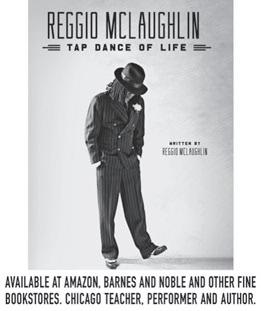

































JANUARY 12, 2023 - CHICAGO READER 55 the platform The Chicago Reader Guide to Business and Professional Services To advertise, e-mail ads@chicagoreader.com legal books Brigi e Schmidt Bell, P.C. 847-733-0933 lawyers@bsbpc.com Brigi eBell.com Brigi eSchmidtBellPC Considering Divorce? We Can Help. Collaborative | Prenuptual Divorce | Mediation mental health YOUR AD HERE 773-616-6969 1234/1250 S. Michigan Ave. In/out. Must call 8 am-9 pm. No annoying texts. European Relax Massage Licensed & Certified Cupping health & wellness What Greta said . . . shop local Outside Noise Reduction Keeps Bugs & Spiders Out Reduce or Eliminate Fog & Water Noise from Outside? Visit stormsnaps.com or noisewindows.com sales@stormsnaps.com Alpina Manufacturing, Chicago, IL 1-800-915-2828 Soundproofing Window Inserts home improvement Fun, Clean, Picture Frame assembly JOB $18/hour Tired or bored of clicking away on a keyboard working at home? Keep your hands and mind busy with a fun, safe, clean assembly job. You’d have your own large assembly zone, at least 15-20 feet away from others, so we’re really safe here. Top rated rm Alpina Manufacturing LLC founded in 1992 Beautiful campus in Galewood, near Mars candy, 3 blocks north of Oak Park. We build and sell display framing systems to customers nationwide including Wal-Mart, Verizon, Circle K gas stations, Hospitals. Full time, Part time, Flex hours for working parents or students. We train, no travel, work in Galewood. Open to any backgrounds. Excellent pay, friendly caring management. Stop in anytime between 7am and 4pm M-F ask for Izzy to apply and check us out. Alpina Manufacturing 6460 W Cortland St., Chicago, IL 60707 Customized Massage Therapy, Intuitive Energy Work, and Holistic Talk Therapy 2514 W Armitage Ave, Suite 211 Chicago, IL 60647 773-697-9278 www.intuithealing.com Open Thursday-Monday BY APPOINTMENT ONLY A Matter of Consequences
Available on Amazon and
your heading here
by Michael W. Falls
Booklocker
A Classic Chicago Mystery
WORLD PREMIERE

LIVERMAN









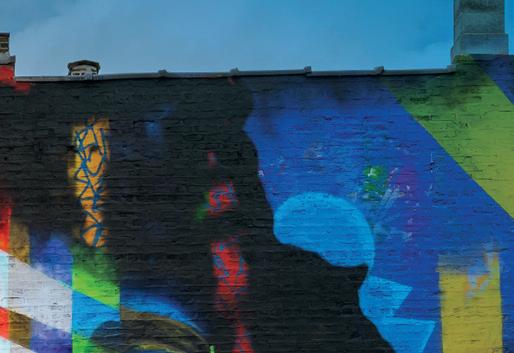















DJ KING RICO

Secure your seats today. lyricopera.org/factotum
WILL
/
Original mural artwork by Barrett Keithley commissioned by Lyric Opera of Chicago.
Lyric’s world premiere of The Factotum is generously made possible by the Ford Foundation The Patrick G. and Shirley W. Ryan Opera Center Board Roberta L. & Robert J. Washlow, the John R. and Grace K. Stanek Charitable Fund Gene & Jean Stark OPERA America the Bill & Orli Staley Foundation and Mary Stowell Lyric
of Chicago thanks its O cial Airline, American Airlines, and acknowledges support
the
Arts
Agency Concept,
and Lyrics
Book
Commissioned
Set in a Black barbershop on the South Side of Chicago, The Factotum blends gospel, funk, rap, hip-hop, R&B, and classic barbershop quartet in a joyful new work that redefines what opera can be. February 3 - 12 Performed at the Harris Theater 205 E Randolph St, Chicago
Photo: Todd Rosenberg.
Opera
from
Illinois
Council
Music,
by Will Liverman and DJ King Rico
by Will Liverman, DJ King Rico, and Rajendra Ramoon Maharaj Dramaturgy by Rajendra Ramoon Maharaj
by Lyric Opera of Chicago and Houston Grand Opera








































































































































































































































































































































































































































































































































































































































































 By KAYLEN RALPH
By KAYLEN RALPH








 DABIN AHN
DABIN AHN























 By JIM DALEY AND SKY PATTERSON
By JIM DALEY AND SKY PATTERSON















 By KIMZYN CAMPBELL
By KIMZYN CAMPBELL

































 JERMAINE COLLINS
JERMAINE COLLINS












 BOWEN
BOWEN


 Negroni, Bulli 4AD velvetnegroni.bandcamp.com/album/bulli
Negroni, Bulli 4AD velvetnegroni.bandcamp.com/album/bulli





























































































